August 30 - September 9, 2023



3 Questions for Alberto Barbera
Alberto Barbera, director of the 80th Venice International Film Festival, reflects on the future of cinema.
TheFilmVerdict, August 28th, 2023




Alberto Barbera, director of the 80th Venice International Film Festival, reflects on the future of cinema.
TheFilmVerdict, August 28th, 2023
How The Film Verdict has grown since its first public bow in Venice.
TheFilmVerdict, August 28th, 2023
This is a big anniversary year for the 80th Mostra del Cinema, but no less of a frisson for the writers and management of The Film Verdict, as we celebrate the start of our third year in business on a digital platform that has grown hugely and well, and is still expanding week by week.

When five Verdict critics get off the boat and step onto the Lido, we will be very much aware that two exciting, labor-in-
tensive years have passed since our first festival debut — which took place at at Venice in 2021. Our mission was immediately understood and supported by Venice president Roberto Cicutto, festival director Alberto Barbera and the head of international press Michela Lazzarin: to promote the festival’s program of world cinema through independent reviews and the power of writing that dives deep into the zeitgeist of our time.
To a rather amazing extent, the objectives TFV set itself at its inception have been fulfilled; namely, to promote timely, stimulating international cinema via a greatly increased number of reviews
Continues next page
THE FILM VERDICT: In your introduction to the 80th Venice Film Festival, you use a quotation from Bernardo Bertolucci’s far-sighted 1964 film Before the Revolution —“We went to bed at night knowing that we’d wake up in the future” – to gaze into what lies ahead for the Mostra. Your conclusion, based on this year’s selection process, seems basically optimistic. What is it about this moment in time that has stimulated filmmakers to give their best? Is it the very challenges they face? Is world cinema at a turning point?
ALBERTO BARBERA: I’m resolutely optimistic, despite all those (and there are more than a few) who prophesy the imminent death of cinema. There will never be a shortage of films, even if the cinema changes, and it is destined to change even more with the rise, for example, of the unprecedented innovations that AI will bring in the immediate future. This is the real turning point and the film industry is going to have to come to grips with it very soon. If the switch from analog to digital took some fifteen years to complete, the transformation in the way films are written and shot in the immediate future will

Continues next page

Continued from previous page
by authoritative writers, reviews that had largely stopped coming out of the major trade magazines. It was this woeful void that The Film Verdict set out to fill, becoming the essential missing link in the production-promotion-distribution cycle of world cinema. And after more than 1,000 reviews published in two years, we can take justifiable pride in a promise fulfilled.
The idea for the platform seemed self-evident when, back in the summer of 2021, a group of frustrated critics approached Eric Mika,
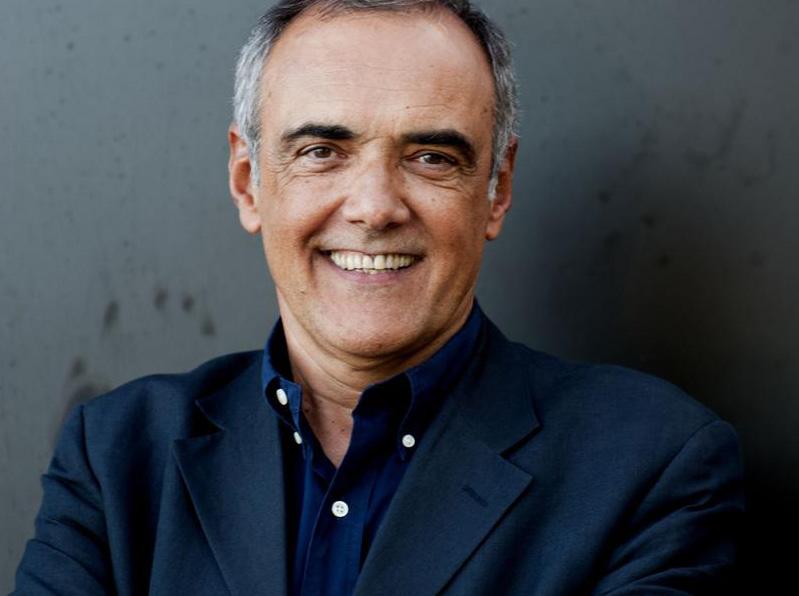
Continued from previous page
be much faster and more radical. Because AI is already here and working, it doesn’t need to be perfected or for standard procedures to be created. All that is missing is regulation, which is one of the most important demands put forward by the strikers.

faithful and representative mirrors of this moment.

the former publisher of The Hollywood Reporter and Variety’s former international topper. He understood that a website was needed for quality film criticism that addressed those directors and, indeed, entire countries that were being increasingly overlooked by the trades, even if the films were stunning and the world sales agents were already
I don’t know what stimulated the creativity of the filmmakers, which is at the heart of the (apparently) high quality of the films in this year’s program. But it’s true that, generally speaking, situations of uncertainty and difficulty are a stimulus for directors. I am referring to the extremely serious problems afflicting the contemporary world: the growing military conflict, the challenge of climate change, the epochal phenomenon of migration and the psychological and social uncertainty it causes. Artists are sensitive antennae able to perceive the deepest unease and translate it into stories that are highly
THE FILM VERDICT: Art-house and independent cinema – the kind of ambitious, quality movies that Venice screens – sometimes seems to be separated from commercial cinema – the superhero franchises, the repetitive genre films – by a high wall. At other times it is amazing to see mega-hits like Barbie and Oppenheimer break through with the style and intelligence of festival films. Does the future hold more of this type of crossover? What role do festivals like Venice play in pushing producers to aim higher and risk more?
ALBERTO BARBERA: The contraposition between auteur films and commercial cinema is a simplification that has never existed in a reductive form. The entire history of cinema can be summed up in the attempt to find an (im)possible
Peter Cowie is the former International Publishing Director of Variety, author of numerous books on the cinema, and chair of the annual panel on the Biennale College Cinema program in Venice. A long-time friend and colleague and an early supporter of The Film Verdict project, his enthusiasm and intelligence applied to film offers a constant source of inspiration for those seeking a “third way” between art and commerce. In this three-part series, he reflects on the history of the Venice Film Festival and those who have shaped it.
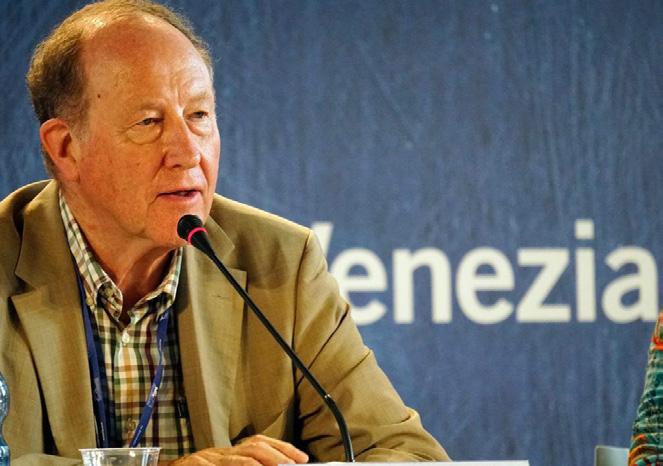
In my youth, I could never get to the Venice Festival, for the simple reason that it occurred during the very month that I was assembling my annual International Film Guide into page form. So the Mostra remained like a chimera on the horizon of filmgoing experience. At least until 1998, when Deborah Young asked me to fly in to moderate a panel during the festival. It proved a baptism of fire, as our principal guest, the charismatic mayor of Rome, Walter Veltroni, was running late. “He’ll be here in ten minutes”, an aide whispered into my ear. “Keep talking.” Then about twenty minutes later, another message, “He’s on his way...” Eventually he did climb on to the dais and proceeded to hold forth most eloquently –for what seemed like an eternity.
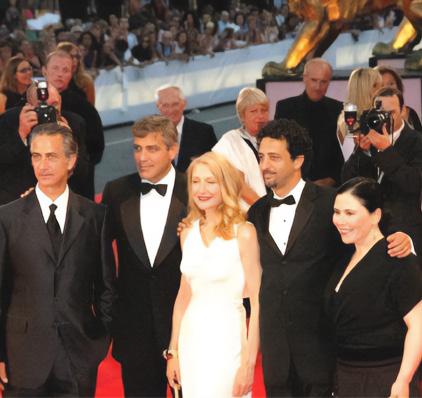
But my true engagement with the Mostra began almost twenty years ago, when the artistic director, Marco Müller, appointed me a member of the jury of the “Luigi De Laurentiis Award for a Debut Film.” We were accommodated in the legendary Hotel des Bains, with its sprawling gardens, pool, and
glorious terraces. Our president was the idiosyncratic, inventive Canadian director, Guy Maddin. Our deliberations were as serene as the lagoon itself, although ruffled by a Russian member of the jury who insisted on watching the films on DVD in her hotel room.
That same year, we attended the world premiere of Good Night and Good Luck, George Clooney’s film about Ed Murrow. “George” mania was at its height, and at the press conference earlier in the day one woman had appealed to Clooney “to have my baby.” That evening, the Sala Grande was packed to the eaves. As Clooney took his place in the balcony, you could hear the crowd
outside the building chanting his name. The lights went down, the credits began, but the chanting grew from a rumble to what seemed like an uproar. Those without tickets were trying to force their way into the auditorium. With almost effortless cool, Clooney rose to his feet, waved to the projectionist, and the screening came to a halt. Clooney went downstairs and addressed the frustrated crowd. He must have calmed them, because when he returned to his seat, the film could begin once more. The incident captured for me the very personal nature of the Mostra, and the intimate relationship between artist/entertainer and his public in a way that could not have happened at a regular event.
Another image, this time from 2013, embodied the warmth and emotional power of the Mostra, when a portly Lech Walesa rose from his seat to acknowledge the applause for the 87-year-old
continues next page
Venice Memories continued Andrzej Wajda’s last great film, Walesa, Man of Hope. Raising the director’s hand high, Walesa seemed in awe of the occasion –art and politics fused in an unforgettable moment of rapture.
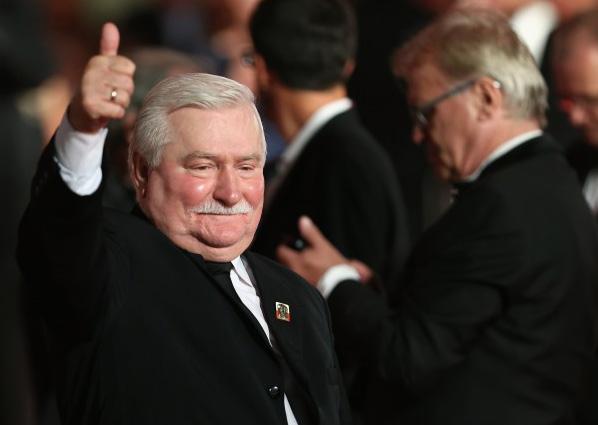
Many years later, the then President of the Biennale, Paolo Baratta, and the artistic director, Alberto Barbera, asked me to write a brief history of the festival to celebrate its 75th anniversary; and this was duly published by the Biennale.
– the Excelsior and the Des Bains. Like Lenin in Russia before him, Mussolini saw in the cinema an instrument for enhancing Italy’s cultural prestige and saw to it that funds were made available to the Biennale from 1930 onwards, enabling the autonomous organization to launch first an International Festival of Contemporary Music, and then, in 1932, the “Mostra”, or “Exhibition”, as it became known informally in Italian film circles.


Part Two of this article will appear in tomorrow’s Venice daily.
The birth of the Mostra came about through a number of unrelated circumstances. The Biennale had been promoting the visual arts since 1893, and in the early 1930’s its president, Count Volpi, seized The birth of the Mostra came about through a number of unrelated circumstances. The Biennale had been promoting the visual arts since 1893, and in the early 1930’s its president, Count Volpi, seized the opportunity to help the flagging fortunes of his two elegant hotels on the Venice Lido
Histroical photo of Des Bains Hotel Garden Historic photo of Excelsior Hotel Lech Walesa at 70th Venice Film Festival in 2013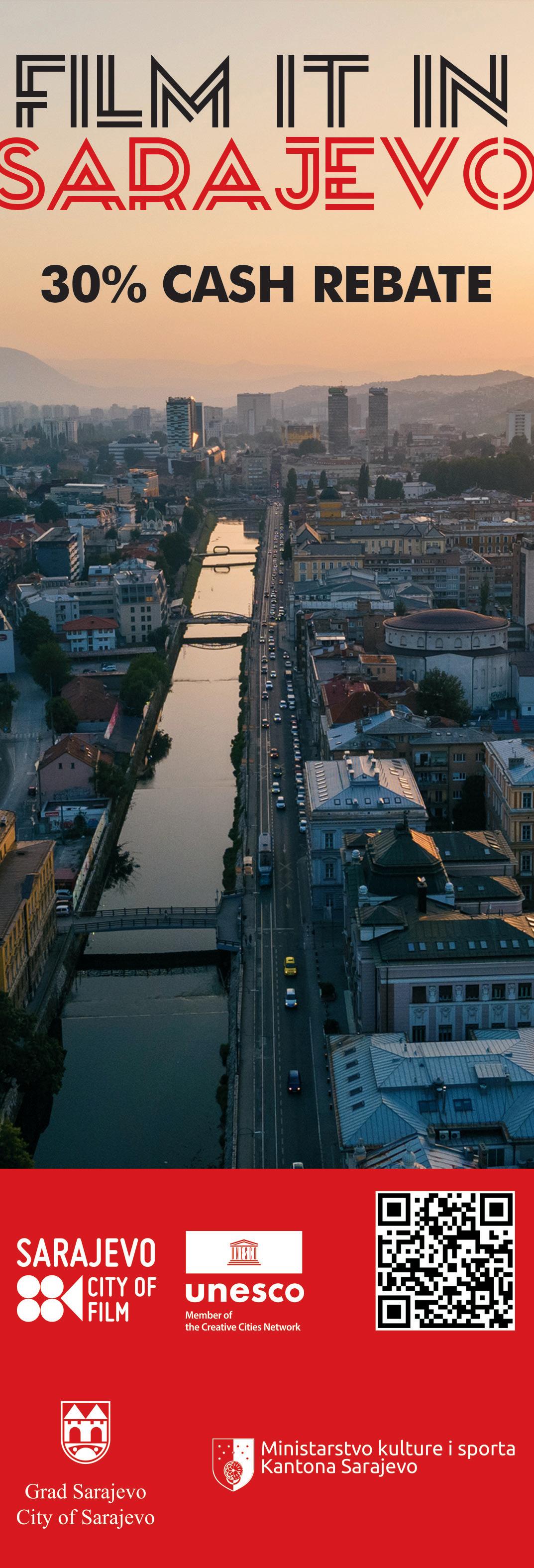
Biennele celebrates 80 years 1938
Biennele celebrates 80 years 1938
The first retrospective was introduced, devoted to French cinema from 1891 to 1933. Marlene Dietrich came to the Lido, consecrating the star worship that accompanied the Festival.
The first retrospective was introduced, devoted to French cinema from 1891 to 1933. Marlene Dietrich came to the Lido, consecrating the star worship that accompanied the Festival.

1947
1947
The Festival was held in the splendid setting of the courtyard of the Ducal Palace, with a record audience of 90,000. That year the international jury was reinstated to assign the International Grand Prix of Venice awarded to The Strike (Siréna) by Karel Stekly
The Festival was held in the splendid setting of the courtyard of the Ducal Palace, with a record audience of 90,000. That year the international jury was reinstated to assign the International Grand Prix of Venice awarded to The Strike (Siréna) by Karel Stekly


In this scene, while sightseeing during her dream Italian vacation, American Jane Hudson (Katherine Hepburn) shoots a home movie of the area, but takes one too many steps backward and ends up falling in the canal.

The San Barnaba is a campo in the Dorosoduro sestiere of Venice, Italy. The neighborhood’s church is thr San Barnaba. It has been featured in numerous films, including Indiana Jones and the Last Crusade, where it served as the exterior to the library.
The film was shot on location inVenice in Technicolor in 1954. On a budget of $1.1 Billion. It was one of the first British-produced films to be shot entirely on location.A coproduction between the United States, United Kingdom, and Italy, Summertime was released theatrically by United Artists in the U.S. on June 21, 1955, and premiered in the United Kingdom later that Autumn under the alternative title Summer Madness.

TheTeacher’s Lounge by Ilker Çatak (if..Productions Film) will enter the race for Germany to the 96th Oscars® in the Best International Feature Film category. The choice was decided by an independent nine member jury who were appointed by various associations working within the German film industry. A total of 13 films were submitted for consideration.
Jury spokesperson Torsten Koch (Constantin Film, German Distributors Association) gave the motivation for its choice as follows, “By nominating THE TEACHERS’ LOUNGE, the jury has chosen a highly topical, universal feature film that is impossible to resist. Student Academy Award® winner Ilker Çatak takes the microcosm of a school as the setting for social processes of erosion in the post-factual age. Çatak is masterful in the way he stages his precisely written story as a breakdown in understanding. Leonie Benesch delivers a breathtaking performance as an idealist who, in trying to do everything right, comes under increasing pressure – intensified by the clever decision to adopt the unusual 4:3 format. THE TEACHERS’ LOUNGE is supported by the outstanding casting and superb performances of its diverse ensemble.”
TFV critc, Boyd van Hoeij, in his review, called the film, “a great performance from German actress Leonie Benesch (The Crown) in a solid drama about trying to stand upright in a world of changing mores.”
Statements by director Ilker Çatak und producer Ingo Fliess: The nomination of our film for the Best International Feature Film“ Oscar® is a special honour and recognition of our consistent work as well as of the creative passion of all involved. We are deeply grateful for this opportunity and are delighted from the bottom of our hearts. At the same time, however, we are very aware of the responsibility involved in representing German film on the international stage. We see our film as being both an individual work as well as a contribution to our nation’s cultural identity. We will show full commitment to living up to this responsibility.“
About the film: The drama THE TEACHERS‘ LOUNGE centres on Carla Nowak (Leonie Benesch), a young and dedicated sports and math teacher who starts her first job full of idealism. But then there are a series of thefts at her school.
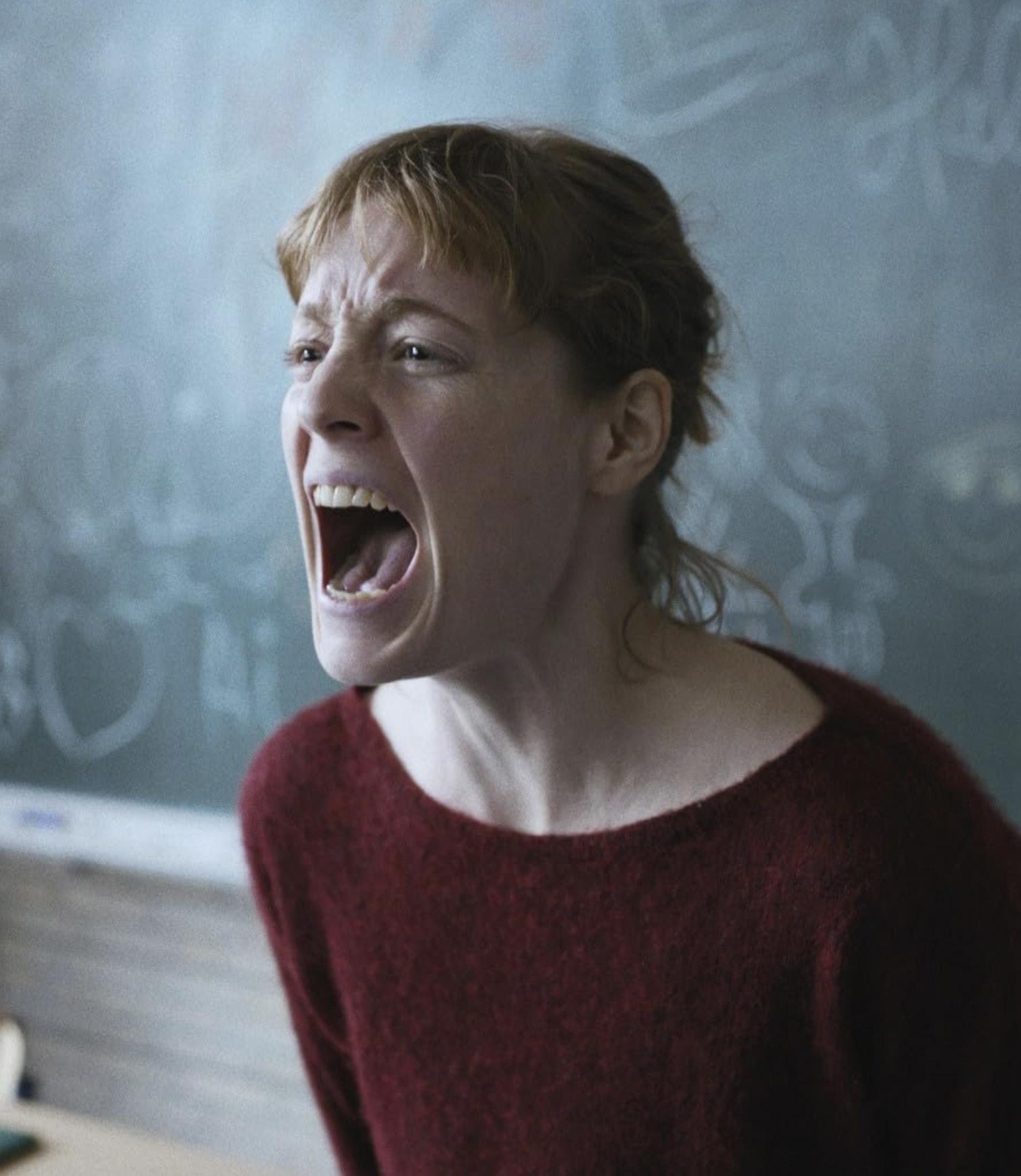
When a Turkish student is accused of thieving, Carla decides to get to the bottom of the matter, but she faces an insoluble dilemma: the prime suspect, the school’s secretary, is the mother of her most talented pupil, Oskar. The forces Carla has unleashed slide out of control to the point where Oskar contacts the school newspaper to publicize his mother’s point of view – which then sparks a heated debate about truth and justice. Carla tries to mediate between outraged parents, opinionated colleagues and aggressive students,
Full article, click here

Biennele celebrates 80 years 1932
Biennele celebrates 80 years 1932
August 6, the first festival opened with a screening of American film Dr. Jekyll & Mr. Hyde. No awards were given.
August 6, the first festival opened with a screening of American film Dr. Jekyll & Mr. Hyde. No awards were given.
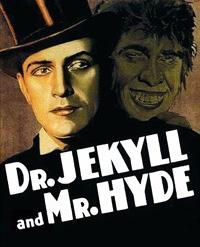
1934
The second Festival, August 1, was the first time it included a competition. The “Coppa Mussolini” was introduced for best foreign film and best Italian film h , owever keeping in fascist tradition; there was no actual jury. The best foreign film award was given to Man of Aran.
The second Festival, August 1, was the first time it included a competition. The “Coppa Mussolini” was introduced for best foreign film and best Italian film; however; keeping in fascist tradition, there was no actual jury. The best foreign film award was given to Man of Aran.


VERDICT: The President of the Biennale di Venezia describes the Biennale as “a unique space for the exercise of cultural diplomacy”.
VERDICT: The true story of an Italian submarine commander in World War II who sank enemy ships yet saved defenseless men is told with old-fashioned gusto and retro sentimentality in ‘Comandante’, with star Pierfrancesco Favino injecting life into the film.
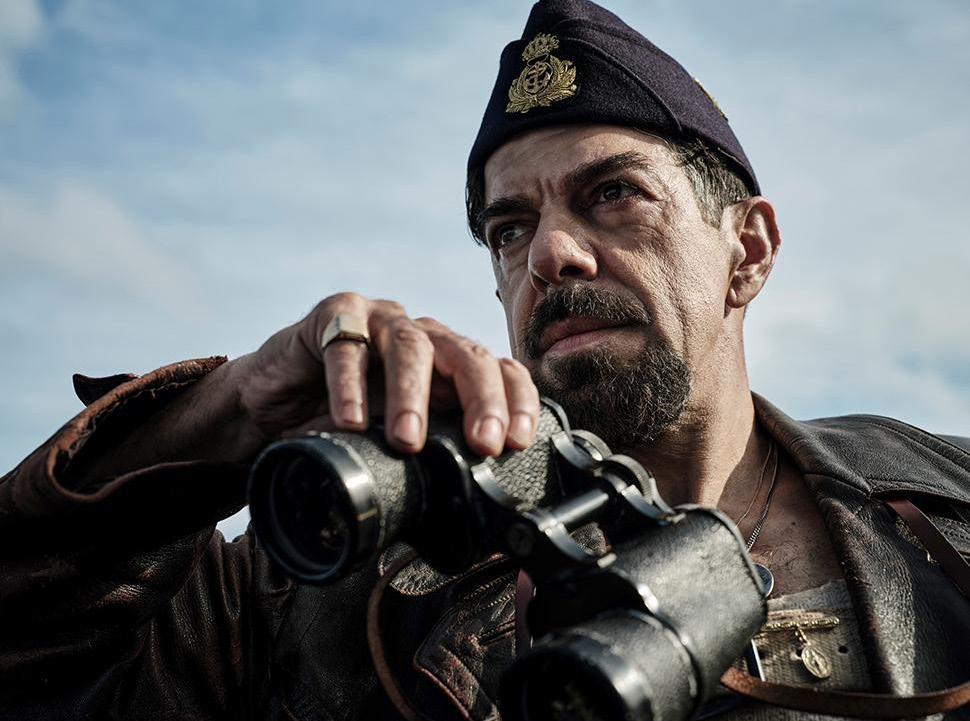
Deborah Young, August 30th, 2023
Swimming against the current of decades of anti-war films that have underlined the horrors of world

war — one of the most recent and terrifying being this year’s Oscar candidate from Germany, All Quiet on the Western Front — Italian director Edoardo De Angelis (Indivisible, The Vice of Hope) strikes out in a very different direction in Comandante, the opening night film in Venice and his first to make competition.
The time is 1940 and the film’s hero (drawn from real life) is an Continues next page
THE FILM VERDICT: You have often underlined the uniqueness of the Biennale di Venezia, which encompasses art, architecture, dance, music and theater as well as cinema. You stress that it “has never been just a showcase for talents and films, it has also been a mirror of political, social and environmental criticalities.” How have you been guiding the Biennale – particularly the cinema section – to reflect contemporary issues and what you have called “the transformation of history”?
ROBERTO CICUTTO: Ever since my arrival in 2020 I have realized how, through its relationship with the national Pavilions, along with the artists invited by the curators of the Art and
Continues next page
From previous page
eccentric submarine commander who is enthusiastically engaged in sinking Allied ships and shooting down British planes because Italy is “at war”. But above all he is a “man of the sea” and a civilized Italian, so when faced with a rowboat full of drowning Belgians who survived his attack on their vessel, he lets himself be guided by a fixed moral principle: a defenseless man is not an enemy, and it is one thing to wage war and another to rescue a man in need.
In another intense and convincing performance, Pierfrancesco Favino (it is hard to imagine another actor in the role) gives Commander Salvatore Todaro a stern demeanor but a heart of pure gold, with an unexpected touch of visionary mysticism that allows him to predict story developments in advance. A seaplane crash has left him with a damaged spine so painful it can only be treated with morphine (which he heroically refuses). The visual sign of this is a complicated corset made of adjustable straps, a device he wears for most of the film and a constant reminder of his moral backbone, strong will and ability to remain alive.
The early scenes in Sandro Vero-
Full Article, Click here
Continued from previous page
Architecture sections and the directors of the various Festivals (Cinema, Theater, Music and Dance), the Biennale represents an observatory on many of the world’s realities, and not just from an artistic point of view. Also from a political and economic perspective, all the way to the respect for human rights and freedom of expression.
For this reason I would dare to say that the Biennale system is a unique space for the exercise of cultural diplomacy. As far as cinema is concerned, in my role as President I don’t intervene in artistic choices (or for any other Festival). But it’s obvious that

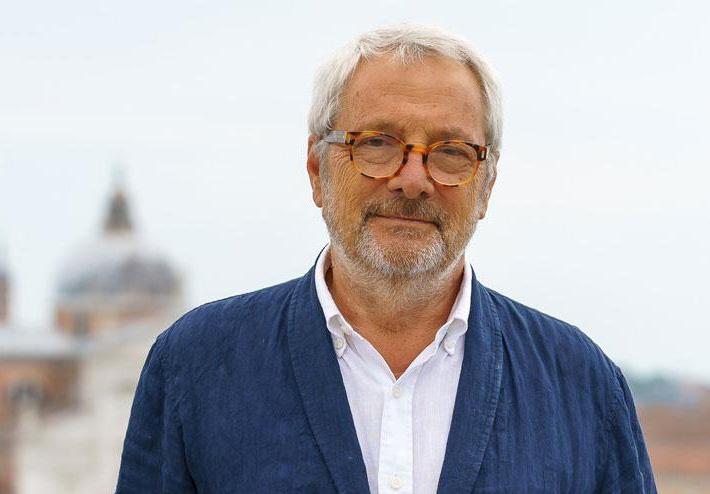
since the Biennale represents contemporaneity, the choices made by the festival director can’t help but privilege everything that contributes to the search for new languages (both expressive and technological) by affirmed filmmakers and new talents, bearing witness to the transformations and historical changes as they continue to happen.
THE FILM VERDICT: You have also brought something quite unique to the Biennale: your long experience as one of Italy’s top film producers, from films directed by Sally Potter to Jacques Rivette, from Spike Lee to masterpieces by Ermanno Olmi. How did your
Full Article, Click here
VERDICT: An exquisite love poem to Cuba, where three generations struggle to survive and dream of escape, depicted in a series of tableaux of daily life in a small rural town.
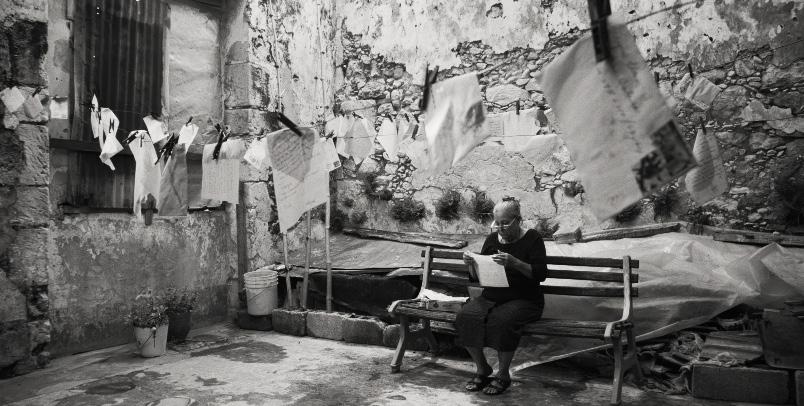
Patricia Boero, August 30th, 2023
In his first feature film, Oceans Are The Real Continents, Tommaso Santambrogio expands on a short of the same title that premiered at the Venice Film Festival in 2019 and now opens the Giornate degli Autori section of the current festival. The plot unfolds in long, leisurely takes that resemble still photography, shot in beautiful black and
white, over the course of two mesmerizing hours, although the editing could have been tighter. The film reflects on the lingering beauty and the deep sorrow of survivors of a social and economic catastrophe that has rendered them either paralyzed by grief or clinging to dreams of escape and success far from Cuba’s shores. Separation
affects every Cuban family, and the film recounts the wounds inflicted by the difficult decision to part ways with loved ones.
Santambrogio, who was born in Milan, studied film there and in Cuba before making such award-winning shorts as Taxibol (2022) and L’Ultimo Spegne la Luce (2021).
Full Review, Click here

Un exquisito poema de amor a Cuba, donde tres generaciones luchan por sobrevivir y sueñan con escapar, representado en una serie de cuadros de la vida cotidiana en un pequeño pueblo rural.

Patricia Boero, August 30th, 2023
In his first feature film, Oceans Are The Real Continents, Tommaso Santambrogio expands on a short of the same title that premiered at the Venice Film Festival in 2019 and now opens the Giornate degli Autori section of the current festival.
The plot unfolds in long, leisurely takes that resemble still photography, shot in beautiful black and
white, over the course of two mesmerizing hours, although the editing could have been tighter. The film reflects on the lingering beauty and the deep sorrow of survivors of a social and economic catastrophe that has rendered them either paralyzed by grief or clinging to dreams of escape and success far from Cuba’s shores. Separation affects every Cuban family, and the film recounts the wounds inflicted by the difficult decision to part
ways with loved ones. Santambrogio, who was born in Milan, studied film there and in Cuba before making such award-winning shorts as Taxibol (2022) and L’Ultimo Spegne la Luce (2021). He recreates the atmosphere of Cuba poignantly as his eye and ear for detail reveal a familiarity with the treasures and travails encountered in daily life: street vendors
Full Review, Click here
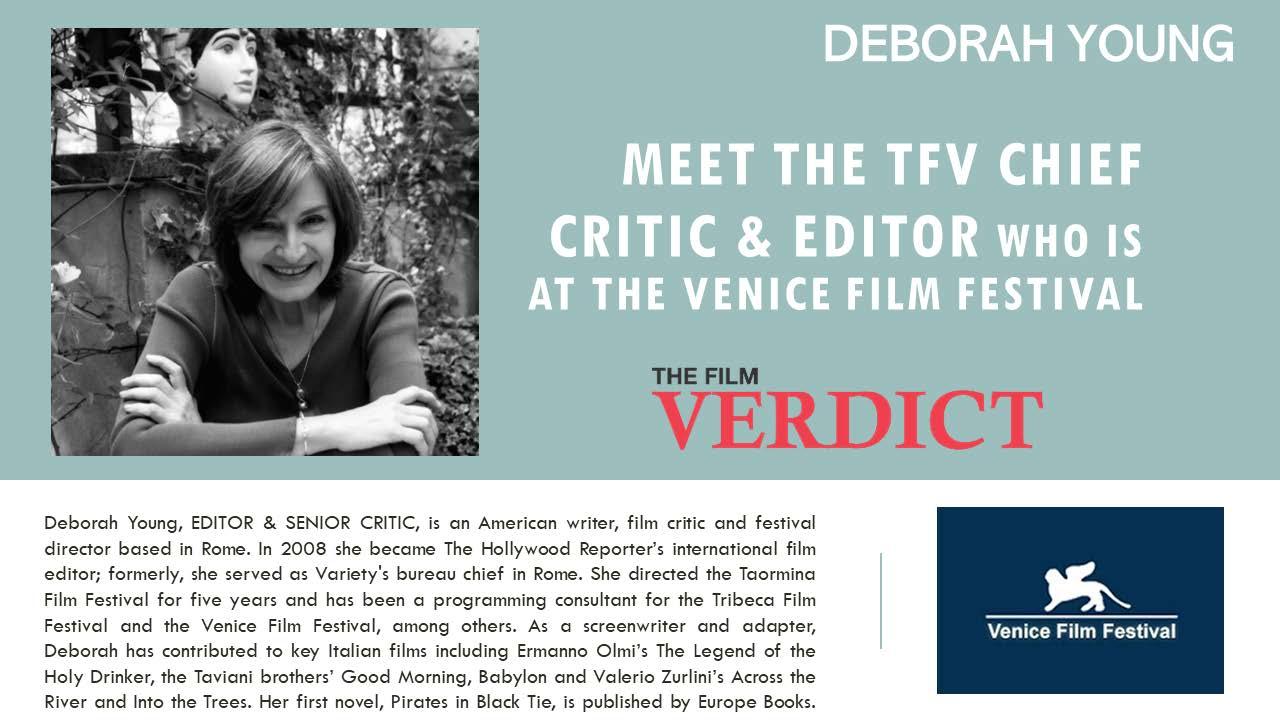
Biennele celebrates 80 years
1951
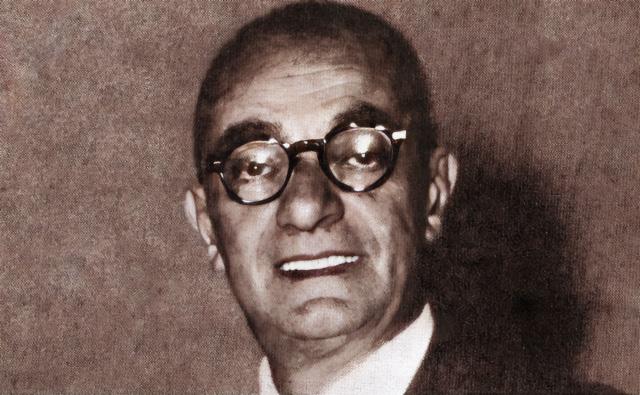
VERDICT: The third film in Denzel Washington and Antoine Fuqua’s ultraviolent thriller series is the best one yet. (If only that meant more than it does.)
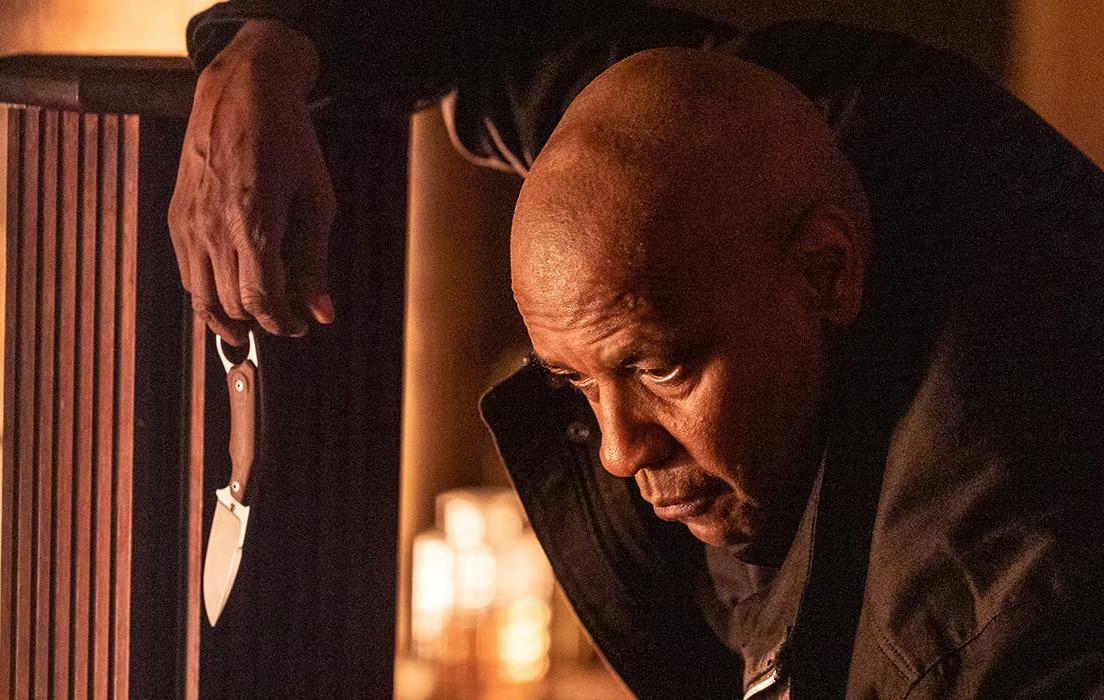 By William Bibbiani, August 26th, 2023
By William Bibbiani, August 26th, 2023
And so we return to the world of The Equalizer, a franchise whose title fittingly means “That Which Makes Things Average.”
There are now three films in Antoine Fuqua’s cinematic update of the popular 1980s vigilante TV series, and after a mediocre first installment and a subpar sequel, The Equalizer 3 is here to even things out. It’s a slick and acceptable thriller with exciting cinematography and a plot you’ll probably only remember because it reminds you of Shane.
Denzel Washington returns as Robert McCall, a former DIA agent who helps people in trouble, usually from rich and violent a-holes. At the start of The Equalizer 3, McCall is in Sicily, murdering mobsters at a palatial villa in search of a mysterious something or other, when his plans are derailed after — like The Ringo Kid in Blazing Saddles — he lets a kid live, and the kid shoots him in the back.
McCall is saved by a small town police officer, Gio (Eugenio Mastrandrea, From Scratch) and a kindly doctor named Enzo (Remo Girone, Ford vs Ferrari). Now he’s convalescing in Altamonte, which conveniently for cinematographer Robert Richardson (Air) is one of the prettiest places in the world, and inconveniently for a man with a back injury and a cane, seems to be made entirely of staircases.
Full Article, Click here
The Golden Lion awarded to Akira Kurosawa’s Rashômon, ushering in a winning streak of Japanese film including Ugetsu Monogatari (1953) and Sanshô Dayû (1954).

1963
This year brought the legendary Luigi Chiarini as Director, who spent six years organizing series of films according to strict aesthetic criteria regarding selection, resisting the social & political pressures and the interference of the film industry.

VERDICT: TFV talks to the Artistic Director of the Giornate degli Autori, as the Venice sidebar celebrates its 20th edition.
Max Borg, August 30th, 2023
Gaia Furrer will never forget her first edition as Artistic Director of Venice’s Giornate degli Autori, mainly because she kept thinking it might not happen at all.

It was in 2020. “Up until the start of the festival, I was expecting a phone call saying they were pulling the plug,” Furrer tells The Film Verdict.
“It was very emotional to introduce the very first screening, with Andrea Purgatori by my side, as he had been appointed almost at the same time as me,” she says, referring to the Giornate’s late President, the acclaimed journalist and screenwriter who passed away in July. The Giornate also lost another of its legendary founders, Cito Maselli, this year. “There were a few setbacks, such as not being able to have certain directors in attendance because of lockdown rules, but overall I look back on those 2020 days quite fondly.”
One memorable incident involved the premiere screening of the Franco-Algerian film Honey Cigar, with one attending member of the press not realizing the director, first-timer Kamir Aïnouz, was not to be
mistaken for her similarly named brother (and fellow filmmaker) Karim. “That was hilarious, it may have been the most shared moment of the festival, because Kamir posted the video of that moment all over social media.”
While the Venice Film Festival as a whole turned 90 last year (and is celebrating its 80th edition this year), the Giornate are also in a somewhat celebratory mood as they turn 20, although their shindigs are a much more muted affair.
Furrer explains: “We are showing the restored print of Jean-Marc Valleé’s C.R.A.Z.Y. on the 31st, because he meant a lot to the Giornate, and we’ve always had a strong bond with filmmakers from Québec. But we’re not making a big deal out of the anniversary or trying to get more media attention, because that’s not who we are. If we wanted that, we could have slotted Sidonie au Japon, starring Isabelle Huppert, as our opening film.” The French actress will be
attending the premiere, and Peter Sarsgaard will also be Lido-bound for the section’s closing movie, Coup!. Because it’s an independent production, Sarsgaard – also one of the producers – will not be affected by the rules of the current SAG-AFTRA strike, which did not impact the Giornate line-up in the slightest.
“We barely screen any American movies, so we didn’t have any issues like the Official Selection did.” In fact, part of Furrer’s philosophy is to give the Giornate their own identity, with a more varied selection. “I don’t have a checklist of countries to specifically include each year,” she says, “but we do try to go beyond the triangle of Italy, France and the US, which are conspicuously represented at festivals in general and Venice in particular.”
The aforementioned Québec, for example, birthed the film with the single coolest title of the entire festival: Humanist Vampire Seeking

Peter Cowie is the former International Publishing Director of Variety, author of numerous books on the cinema, and chair of the annual panel on the Biennale College Cinema program in Venice. A long-time friend and colleague and an early supporter of The Film Verdict project, his enthusiasm and intelligence applied to film offers a constant source of inspiration for those seeking a “third way” between art and commerce. In this three-part series, he reflects on the history of the Venice Film Festival and those who have shaped it.
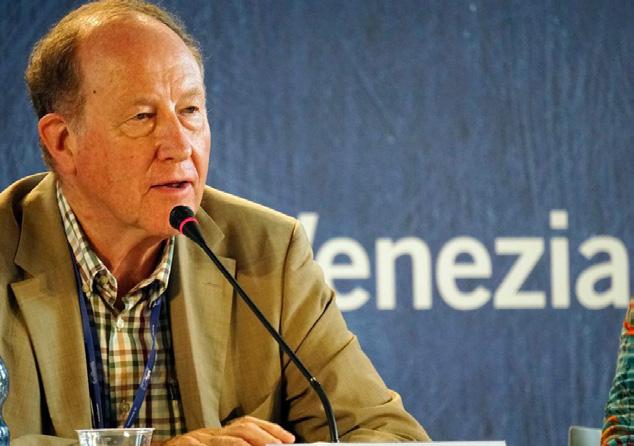
From the outset, the emphasis was placed on an international program that would reflect the most audacious and innovative experiments in filmmaking. Cannes may glory in attracting big stars and “Old Master” filmmakers. Berlin may stand for political commitment, and hence the meeting of Eastern and Western European cinema. But Venice has stayed loyal to the fundamental ideals of the Biennale itself. That much disdained cliché, “art for art’s sake”, can be applied to the Mostra without even a tinge of irony.
Few are alive who can recall the legendary heyday of the Mostra, prior to World War II. Bob
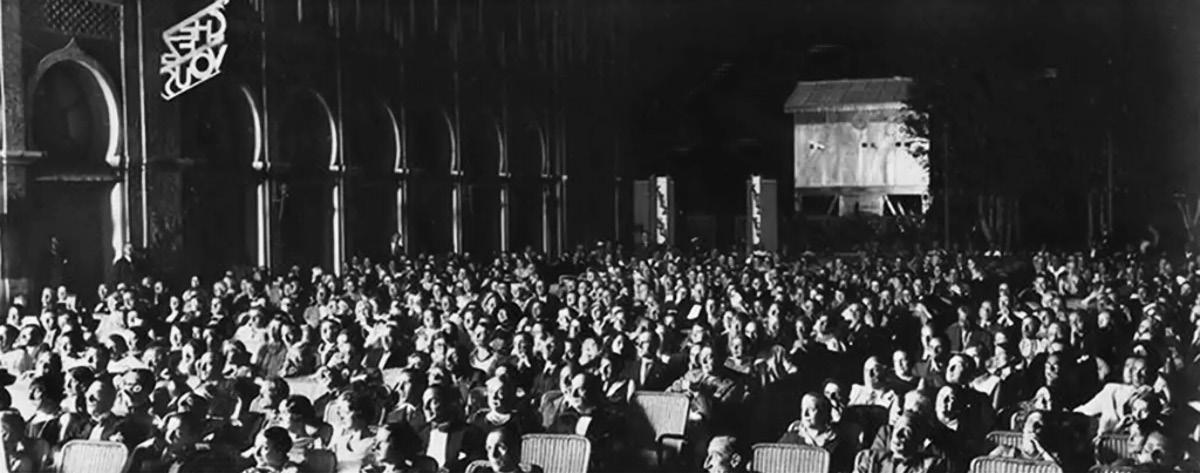
Hawkins, who was a colleague of mine at Variety, and had grown up in Italy, remembers being taken at the age of nine to one of the early editions of the festival, in the mid-1930s. What remained in his mind across the decades was the sound of jackboots crunching across the gravel as Nazi officers made their way to their chairs at the open-air screenings in the Hotel Excelsior. Indeed, for Josef Goebbels, the Mostra was seen as the ideal art forum, all the more so after Mussolini became an ally of Hitler. Under pressure from Berlin, Leni Riefenstahl’s Olympia was awarded the top prize in 1938 and aroused the ire and indignation of most
Western nations. The Mostra’s reputation suffered a savage blow, from which it would really only recover at the end of the 1940s.
And then in 1951, Kurosawa’s Rashomon landed like a UFO in the competition. Not only did it win the Golden Lion, but its aesthetic audacity and complex structure seemed perfectly in tune with the aims of the Biennale itself. Suddenly Japanese cinema was all the rage, and in successive years such masterpieces as Mizoguchi’s The Life of O’Haru, Ugetsu, and Sansho the Bailiff, as well as Kurosawa’s Seven Samurai, had their European premieres in Venice.
Continues next page
First-time visitors to the festival can be startled to find that the Palazzo del Cinema (including the Sala Grande) dates back to 1937 –as does the Casino building alongside it. Of course, both structures have been refurbished, but each retains its period look. While the Hotel Excelsior kept its significance as a hub for social and business gatherings during the Mostra, the Palazzo del Cinema and the Casino fast became the engine-room of the festival. There is still something engaging about the 1930s modernism of these buildings, especially the Sala Grande, which was designed by the engineer Luigi Quagliata.
My long hours of research in the Biennale’s archives in Mestre taught me many things. First and foremost, that the commercial importance of the Mostra has long been underestimated. As early as 1950, a fledgling market came into being under the guidance of the artistic director of the period, Antonio Petrucci, and its offerings included Antonioni’s maiden feature, Cronaca di un amore. But for decades, Venice
declined to establish a “Film Market” of the kind launched in Cannes, in Santa Monica, in Berlin, and of course at the MIFED in Milan.
So the festival was unfairly dismissed as almost “antiindustry”. In fact, apart from what I’d call the “years of austerity” (1969-1978) following the decision to abandon prizes at the Mostra, the stars and their studios came to Venice by the score, revelling in the uniquely beautiful setting.


They found themselves under less pressure than at Cannes or even Berlin. And over many a Bellini or Campari on the terraces of the Excelsior or the Des Bains, agents and producers would confer, with ideas germinating and ready for discussion in the months ahead. Nor was the festival ever really restricted to the Lido: directors would give interviews on the terraces of the legendary Venetian hotels – the Danieli, the Bauer Palazzo, the Cipriani, the Gritti Palace – the list goes on.



Peter Cowie’s story of the Venice Film Festival concludes in tomorrow’s TFV daily.


14:00 – 15:30 / 16:00 – 16:50
will finally see the return of Chinese delegates to the Italian Pavilion, for the first time in attendance since the pandemic. It will begin on 31 August (14:00 -15:30) with the panel, in collaboration with Xinhua, Focus on China - The Most Beautiful Shooting Locations in China. Discover Changzhou Attractions which, after the opening speech by Roberto Stabile, will feature the participation of: Xiang Hui, Mayor of Cangzhou; Pan Zhi, General Manager, Xinhuanet Europe and Jia Yimin, Martial Art Coach. There will also be a moment dedicated to contemporary Chinese productions with a screening, at the Palazzo del Cinema, of the short films selected by the Blue P lanet Science Fiction Film Festival (9:00 -11:00), China’s first and most important sci-fi-themed festival (Venice Production Bridge, Sala Pasinetti and Sala Volpi, 2 September, 18:10 -19:10). Great atten tion will also be paid to Japan on 31 August, in the light of the historic film co-production agreement with Italy, signed last June with the aim of opening up new horizons of growth for Italian companies and its professionals, both on the domestic front and in terms of internationalization (31 August, 16:00 -16:50). In fact,
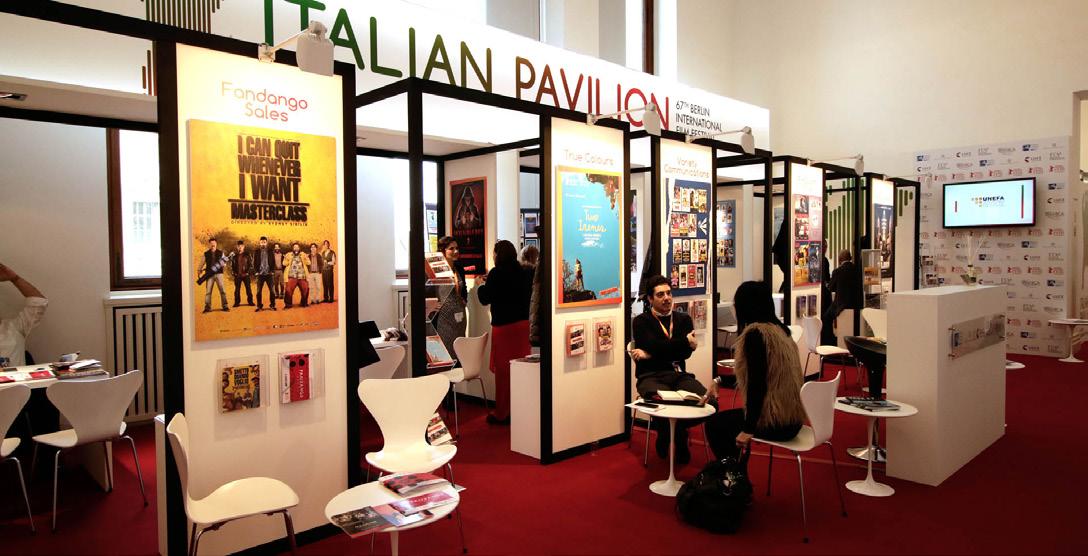
one of the goals of the agreement is to increasingly strengthen the presence of Italian cinema on the Japanese market. For this reason, the next edition of the Tokyo International Film Festival will dedicate a focus to our Country, bringing in the spotlights some of its protagonists, between past and present, from Franco Zeffirelli - to whom a special tribute will be reserved - to a master such as Pupi Avati, passing through young talents and emerging actors and actresses. These activities will also be flanked by business events to present funds and benefits, B2B meetings and a presentation in spectacular and multimedia form of the new Italian cinema and audiovisual industry.
17:00 – 18:00
Among the many in-depth studies on Asian cinema in this year’s programme, particular mention must be made of Kyrgyzstan, which will arrive in Italy for the first time with a delegation to present its cinematography and will host, from 3 to 5 October 2023, the new appointments of Italian Screens. Il panel Focus on Kyrgyzstan - Cooperation Strategies & Perspectives (31 August, 17:00-18:00) will be introduced by the Undersecretary of State for Culture of the Italian Government, Lucia Borgonzoni, by Roberto Stabile and by the keynote of Bazarbaev Taalai, Ambassador of Kyrgzstan to Italy. Then will follow speeches by actors and important figures from industry and institutions: Taalaikan Abazova, Actress; Maksat Chunuev and Gulmira Kerimova, Film Producer; Elvira Mamytova, Head of International Relations of Cinema Department, Ministry of Culture, Information, Sports and Youth Policy of the Kyrgyz Republic; Gulkair Tilenbaeva, Chair, Association of Cinema Owner and Director, Ala-Too; Dalmira Tilepbergenova, Director and Screenwriter of the film The Gift, which will have a special screening at the Palazzo Cinema (Venice Production Bridge, Sala Pasinetti, 31 August, 12:00-13:40).


In this scene, Mike (River Phoenix) stands in front of a catherdral in Rome, while Scott (Keaunu Reeves) tries to get him back in the car so they can travel into the country and find the farmhouse where Mike’s mother (Vana O’Brien) is said to have worked.
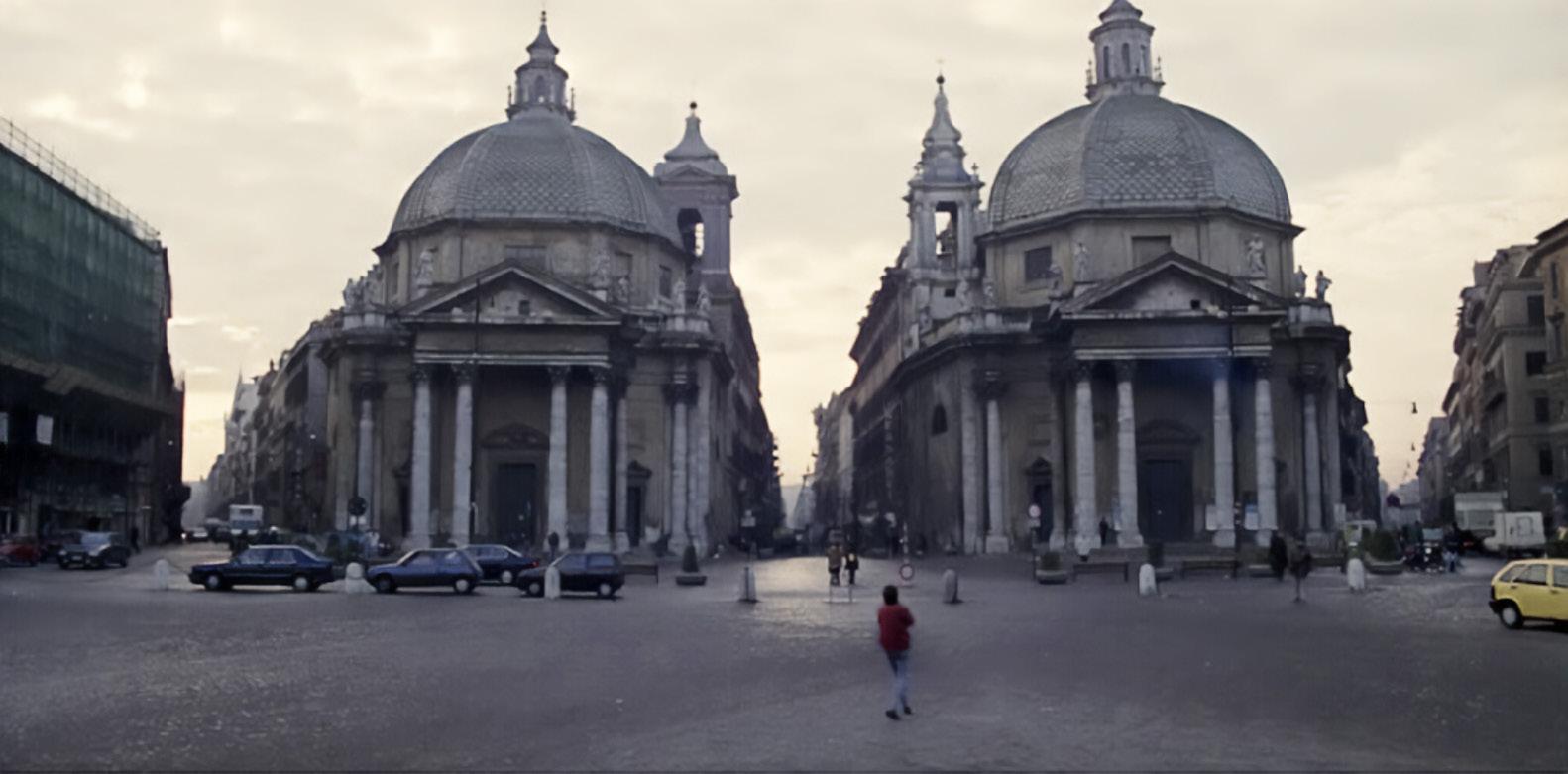
After it’s Premiere at the Venice Film Festival, My Own Private Idaho received largely positive reviews from critics. The film was a moderate financial success, grossing over $8 million, above its estimated budget of $2.5 million. Phoenix received several awards for his performance in the film, including the Volpi Cup for Best Actor at the Venice Film Festival, Best Male Lead from the Independent Spirit Awards, and Best Actor from the National Society of Film Critics. My Own Private Idaho is considered a landmark film in New Queer Cinema, an early 1990s movement in queer-themed independent filmmaking. Since its release, it has grown in popularity and been deemed a cult classic, especially among LGBT audiences
Santa Maria in Montesanto is a basilica in Rome, Italy located in Piazza del Popolo, in the Campo Marzio district, between Via Del Corso and Via del Babuino. This area is called Trident because of the shape defined by the three straight lines, which branch off from Piazza del Popolo. Under the twin churches are the remains of two pyramid shaped funerary monuments, probably dating back to the Augustan age.
VERDICT: In his first feature film in eight years, director Michael Mann passionately captures a life where the drive for success and the threat of disaster were intricately intertwined.
Alonso Duralde, August 31st, 2023
The “man of genius” narrative is catnip for male auteurs, who often seem to be crafting stealth

autobiographies by paying tribute to brilliant risk-takers. Yet Michael Mann’s portrait of Enzo Ferrari never fawns in its portrayal of the legendary automotive entrepreneur or of the literal and emotional devastation he often left in his wake.

The screenplay for Ferrari — by
Full review, click here

VERDICT: The General Delegate of the International Critics Week discusses her philosophy for the Venice sidebar.

Max Borg, August 31st, 2023
Like every year, Beatrice Fiorentino will be covering the Venice Film Festival for the Trieste-based daily newspaper Il Piccolo (the three movies she’s most looking forward to are Michael Mann’s Ferrari, David Fincher’s The Killer, and Bertrand Bonello’s La bête).
And, like every year since 2016,
Full interview click here
: El conde, la oscura sátira de horror cómico revela que convertir a un monstruo de la vida real en el protagonista de su propia película de monstruos es una efectiva manera de lidiar con la tragedia histórica.
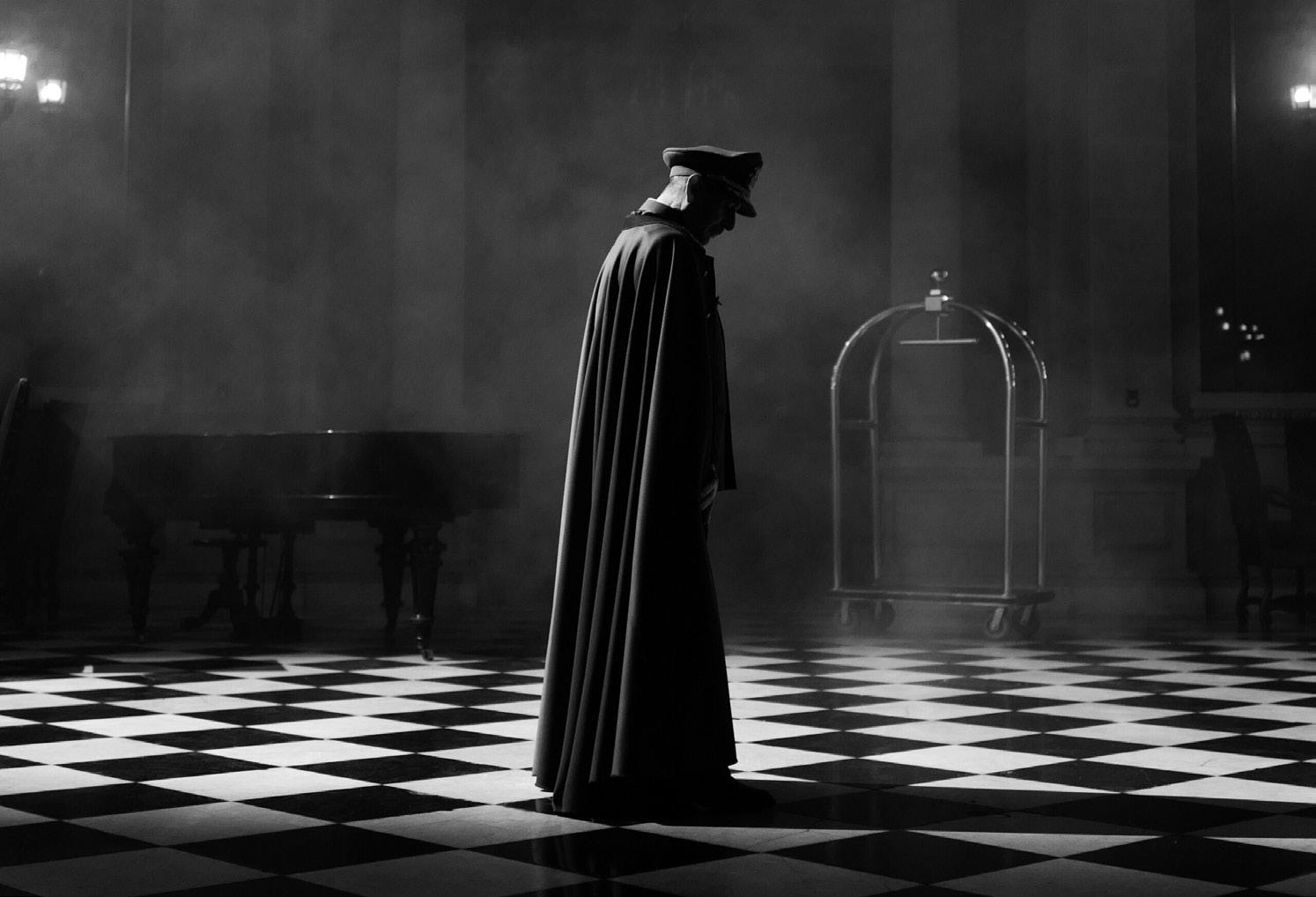
Alonso Duralde, August 20th, 2023
Los artistas siempre han luchado por vislumbrar el corazón de las tinieblas, por transmitir la naturaleza malvada de la humanidad en su peor momento. Con El Conde, el director y coguionista Pablo Larraín toma un monstruo (específicamente, el dictador chileno Augusto Pinochet) y crea una película de monstruos. Las capas de sátira y de comedia familiar disfuncional que envuelven a este demonio sirven para acentuar, en lugar de disminuir, sus numerosos crímenes contra la humanidad. Es un cambio un tanto radical para Larraín, nacido en Chile, cuyas películas recientes Jackie y Spencer fueron retratos compasivos de mujeres lanzadas a los reflectores por sus matrimonios con hombres poderosos. Aquí no hay compasión por Pinochet y el desfalco genocida que marcó su reinado
Full Review, click here
VERDICT: Pablo Larraín’s darkly comic horror-satire reveals that turning a real-life monster into the protagonist of his own monster movie is an effective way to process historical tragedy.
Alonso Duralde, August 31st, 2023
Artists have always grappled with staring into the heart of darkness, with conveying the evil nature of mankind at its worst. With El Conde, director and co-writer Pablo Larraín takes a monster — specifically, Chilean dictator Augusto Pinochet — and creates a monster movie. The layers of satire and dysfunctional-family comedy that

surround this demon serve to accentuate, rather than diminish, his many crimes against humanity. It’s a bit of a radical shift for the Chilean-born Larraín, whose recent films Jackie and Spencer were compassionate portraits of women thrust into the spotlight by virtue of their marriages to powerful men. There’s no compassion here for Pinochet and the genocidal larceny that marked his 17-year reign of terror, though; Larraín refuses to avert his gaze from Pinochet’s sins or from the rotting corruption that infects the dictator’s family, his servants, or even the thoroughly complicit Catholic Church.
We learn from the English-language narrator (Stella Gonet)
Full Review, click here
VERDICT: A sobering observational documentary shot at an air force base in Afghanistan, where director Ibrahim Nash’at embedded himself in order to bear witness to the Taliban mindset.
Jay Weissberg, August 31st, 2023
It’s two years to the day since the U.S. abandoned Afghanistan to the Taliban, making for a painful but appropriate world premiere for Ibrahim Nash’at’s documentary Hollywoodgate. Embedding himself for a year at a Taliban air force base, the director received extraordinary access to the Commander of the Air Force and a lieutenant on site,
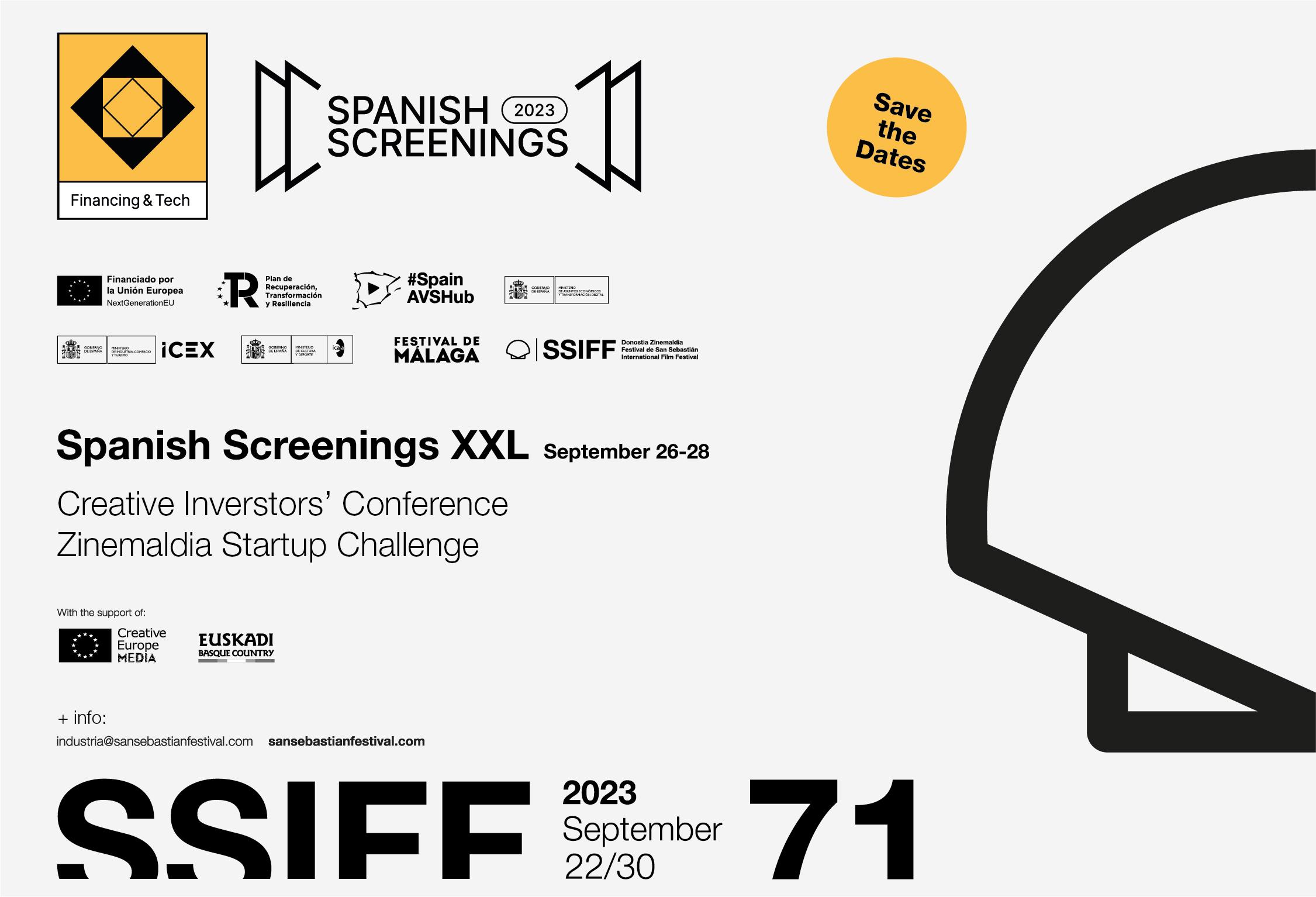
resulting in a chilling, narrowly-focused observational portrait of the Taliban’s methods and outlook. Those expecting a general account of Taliban atrocities should look elsewhere; Nash’at was constrained by extremely limiting restrictions, and yet within that cage, he managed to do the opposite of what the Commander wanted by show-
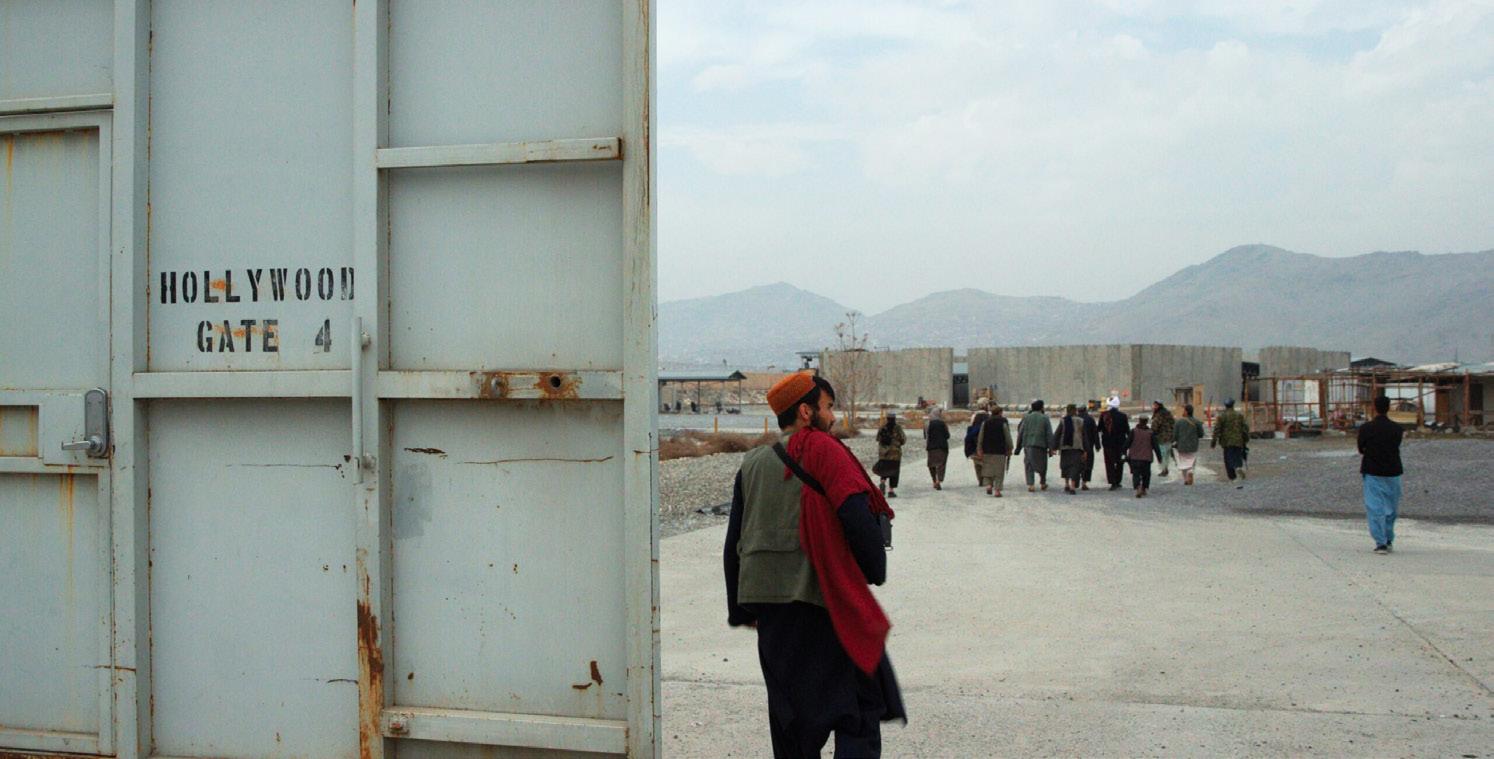
ing not so much their triumphs but their inexperience, blind fanaticism and incompetence. Though significantly harmed by Volker Bertelmann’s melodramatic score, Hollywoodgate is a sobering look in the belly of the beast.
Egyptian-born Nash’at has a background as a journalist but also
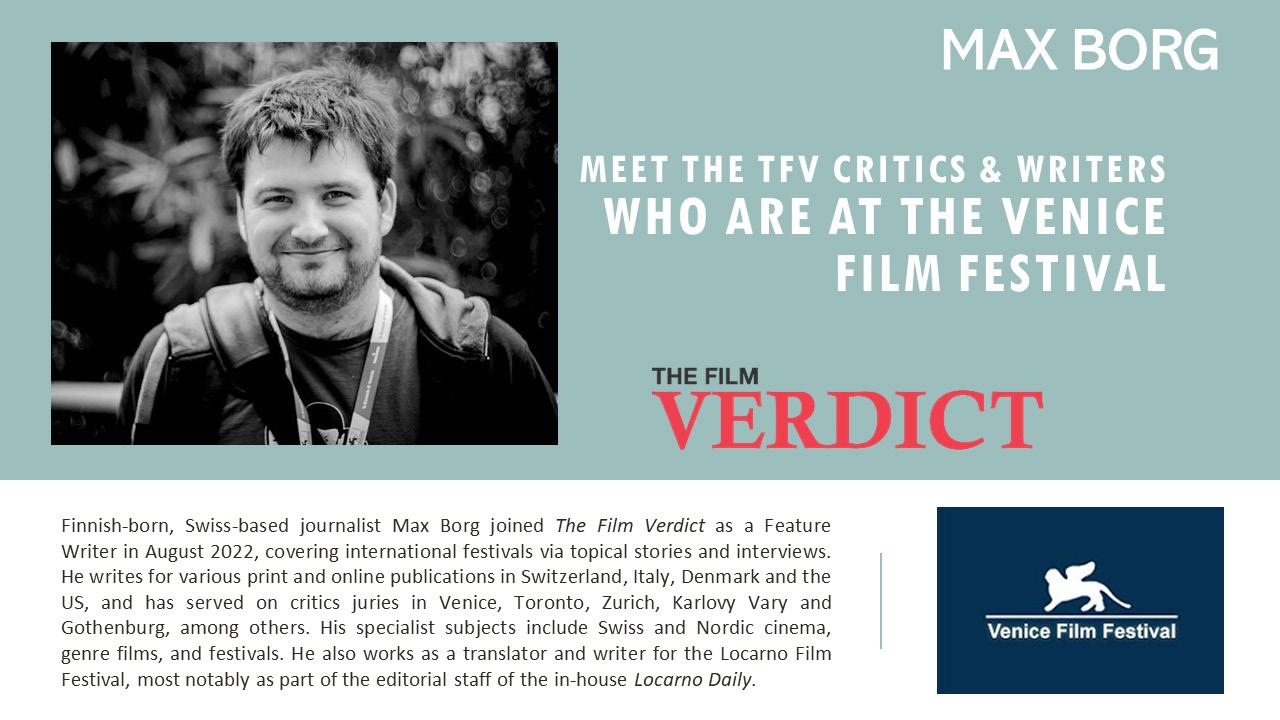
VERDICT: Nearly fifty years after a film documenting Panama’s Kuna community was lost, Swiss-Panamanian director Andrés Peyrot tracks it down and screens it before an emotionally engaged crowd in this fascinating though flawed documentary.
Jay Weissberg, August 31st, 2023
Swiss-Panamanian documentary director Andrés Peyrot expects a lot from his audience with his fascinating though flawed debut God is a Woman. Wary of the problematic nature of an outsider’s gaze when shooting indigenous communities, and mindful of the post-colonialist dictum that it’s not the responsibility of non-hegemonic groups to explain themselves to those in power, Peyrot allows most of this story of a rediscovered
film shot among Panama’s Kuna people to be told by those within the community. While laudable in principle, the result in this case is that so many questions remain unanswered that we’re moved by the emotions generated yet mentally taken out of the film by all the unaddressed issues and details. It’s a true Catch-22 situation: do you make a documentary for the people you’re filming, or do you make it for an international art-
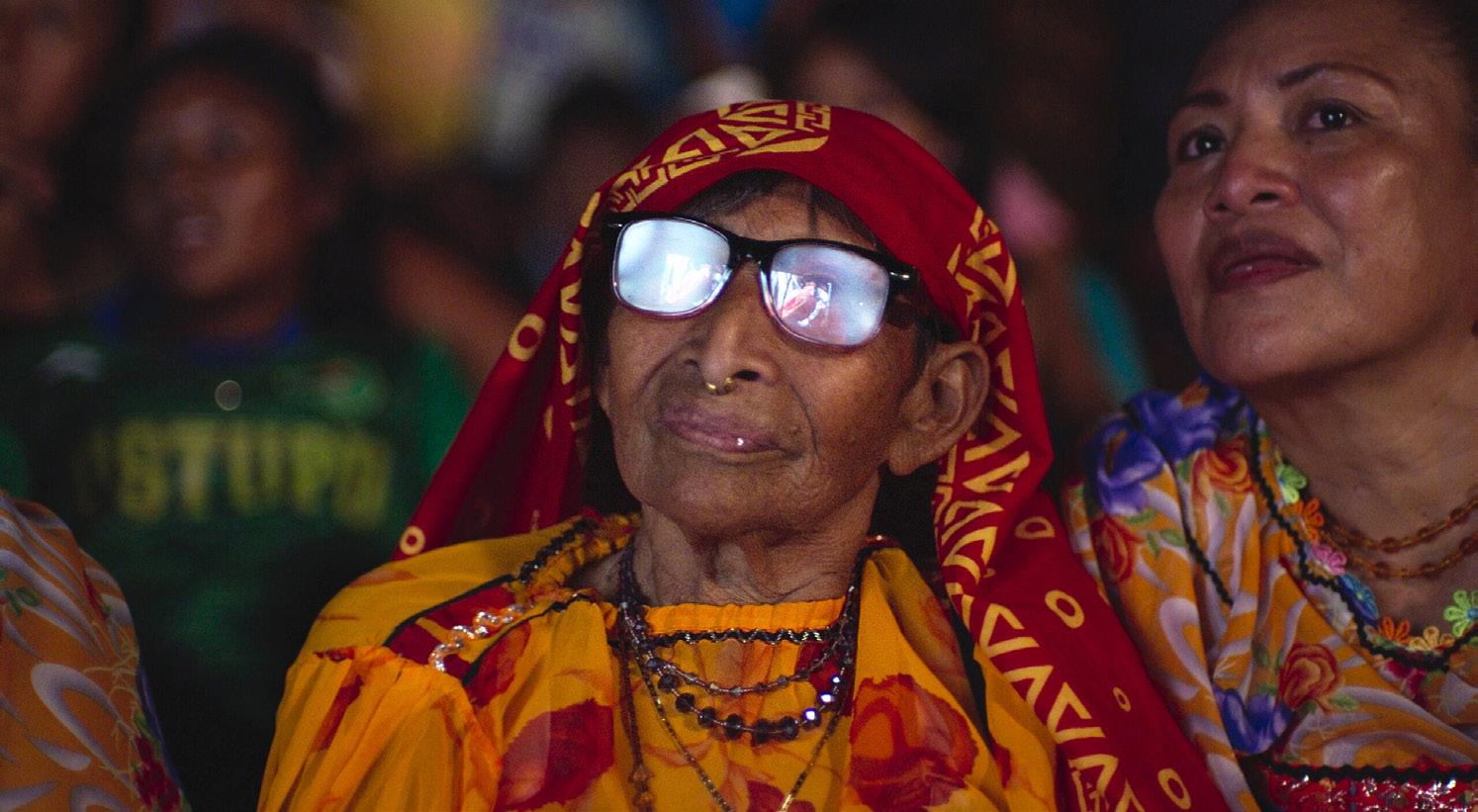
house crowd who’ll be sympathetic in a neoliberal sort of way? Regardless, God is a Woman has a strong enough story and visuals to earn it an enviable passport.
In 1975, French filmmaker Pierre-Dominique Gaisseau, winner of the 1962 best documentary Oscar for the now forgotten The Sky Above, the Mud Below, traveled with his wife and daughter to
Full Review, Click here
VERDICT: ‘Upon Open Sky’, a Mexican road movie full of restraint and some surprises, premieres in Venice’s Orizzonti section.
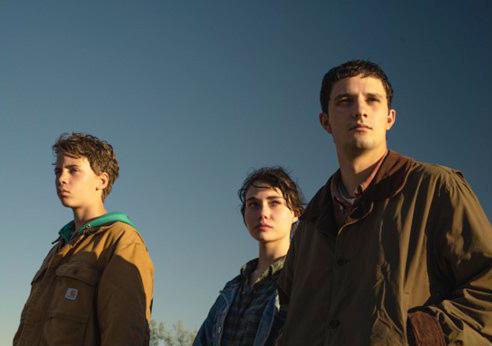
Lucy Virgen, August 31, 2023
Road movies, born in the American cinema of the Seventies, are transgressive by nature. Their characters behave as they would not in the place where they live; their relationship with weapons, romantic adventures and motorcycles is relaxed, and the viewer doesn’t need to suspend reality to consider it natural. The actions are circumscribed to a specific moment and there are no consequences, at least we do not see them on screen. What happens on the road, stays on the road.
In Upon Open Sky, a terrible road accident in which the father of teenage brothers Fernando and Salvador dies, stays with the boys and haunts them. Two years later, Fernando is obsessed with doing amateur forensic reconstructions of car accidents. Salvador, who was with his father in the accident, says he does not remember anything that happened.
The trauma of the accident obsesses them and becomes so heavy that they decide to go to the place where it occurred, in the state of Coahuila, to look for an explanation about what happened. They are accompanied by their stepsister Paula and her boyfriend Eduardo.
For each of the participants in the expedition, the trip means something different: for Fernando revenge, for Salvador closure. Eduardo sees it as an opportunity to Full Article, Click here
: Road movie mexicana con una controlada dirección y varias sorpresas se estrena en Horizonts in Venice 2023
Lucy Virgen, August 31, 2023
Las road movies, nacidas en el cine norteamericano de los setentas son transgresoras por naturaleza. Sus personajes se comportan como no lo harían en el lugar en donde viven, su relación con las armas, aventuras románticas o motocicletas es relajada y el espectador no necesita suspender la realidad para considerarlo natural.

Las acciones están circunscritas a un momento específico y no hay consecuencias, al menos no las vemos en pantalla. Lo que pasa en el camino, se queda en el camino.
Pero en A cielo abierto lo que pasó en el camino, un terrible accidente en el que muere el padre de los hermanos adolescentes Fernando y Salvador, se queda con ellos y los obsesiona. Dos años más tarde Fernando está fascinado en hacer reconstrucciones forenses amateurs de accidentes automovilísticos. Salvador, quien iba con su padre en el accidente, dice no recordar lo que pasó. El trauma del accidente los obsesiona y se vuelve tan pesado que deciden ir al lugar en el que ocurrió, en el estado de Coahuila con intenciones de venganza, acompañados de su hermanastra Paula y su novio Eduardo.
Para cada uno de los participantes en la expedición, el viaje significa algo diferente: para Fernando venganza, para Salvador terminar con el pasado, el novio de Full Article, Click here
APOLONIA, APOLONIA / APOLONIA, APOLONIA
Denmark, Poland
Written & Directed by: Lea Glob
BETWEEN REVOLUTIONS / ÎNTRE REVOLUTII
Romania, Croatia
Directed by: Vlad Petri
Written by: Vlad Petri, Lavinia Braniste
FOUR DAUGHTERS / LES FILLES D’OLFA
France, Tunisia, Germany, Saudi Arabia
Written & Directed by: Kaouther Ben Hania
IN THE REARVIEW / SKAD DOKAD
Poland, France, Ukraine
Written & Directed by: Maciek Hamela
PARADISE / PARADIS
France, Switzerland
Written & Directed by: Alexander Abaturov
ON THE ADAMANT / SUR L’ADAMANT
France, Japan
Directed by: Nicolas Philibert
OUR BODY / NOTRE CORPS
France
Directed by: Claire Simon
Titles in red, click for TFV review
MOTHERLAND
Sweden, Ukraine, Norway
Written & Directed by: Hanna Badziaka, Alexander Mihalkovich

ORLANDO, MY POLITICAL BIOGRAPHY / ORLANDO, MA BIOGRAPHIE POLITIQUE
France
Written & Directed by: Paul B. Preciado
LIGHT FALLS VERTICAL / ARA LA LLUM CAU VERTICAL
Spain, Germany, Italy, The Netherlands
Written & Directed by: Efthymia Zymvragaki
SMOKE SAUNA SISTERHOOD / SAVVUSANNA SÕSARAD
Estonia, France, Iceland
Written & Directed by: Anna Hints
WHO I AM NOT / WHO I AM NOT
Romania, Canada , Germany
Written and Directed by: Tunde Skovran
THE HEARING / DIE ANHÖRUNG

Switzerland
Written & Directed by: Lisa Gerig
Written by: Lisa Gerig
Full list, click here

In this scene, undercover reporter Joe Bradley (Gregory Peck) takes “Anya Smith”(Audrey Hepburn), a young woman he met the night before – but who he knows is actually an incognito HR Princess Ann, on a tour of Rome and a stop at the “Mouth of Truth,” a sculputure said to bite the hands off of liars. Needless to say they are both a bit shy to put their hands in the mouth of fate.
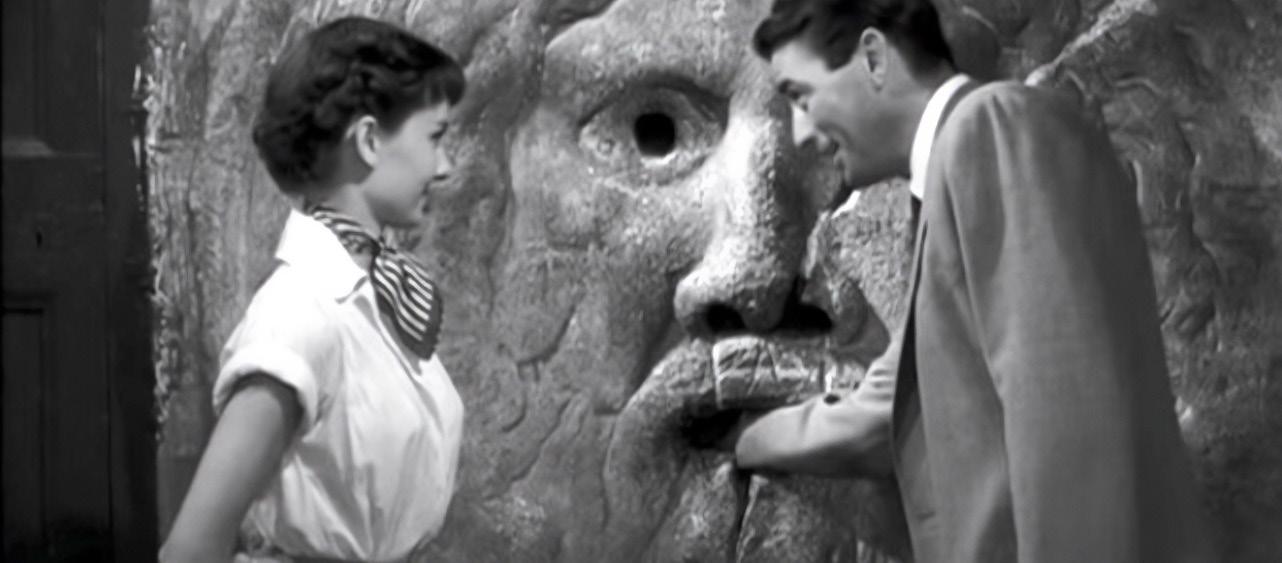
The film was shot at the Cinecittà studios and on location around Rome during the “Hollywood on the Tiber” era. In 1999, Roman Holiday was selected for preservation in the United States National Film Registry by the Library of Congress as being “culturally, historically, or aesthetically significant”. The film has been considered one of the most romantic films in cinema history Blacklisted director Bernard Vorhaus worked on the film as an assistant director under a pseudonym. Hepburn won an Academy Award for Best Actress for her performance; the story and costume design also won.The script was written by John Dighton and Dalton Trumbo, though with Trumbo on the Hollywood blacklist, he did not receive a credit, and Ian McLellan Hunter fronted for him.
Mouth of Truth is located in Piazza Bocca dellaVerita and is one of the most famous symbols of Rome. The ancient marble mask was most likely a sewer cover from the Roman age dating back to the reign of Tarquino the Superb, the last of the seven Kings of Rome. The name Mouth of Truth originated in 1485 and is linked to the medieval legend of biting off the hands of liars.

Peter Cowie is the former International Publishing Director of Variety, author of numerous books on the cinema, and chair of the annual panel on the Biennale College Cinema program in Venice. A long-time friend and colleague and an early supporter of The Film Verdict project, his enthusiasm and intelligence applied to film offers a constant source of inspiration for those seeking a “third way” between art and commerce. In this three-part series, he reflects on the history of the Venice Film Festival and those who have shaped it.
In the new century, Venice finally came up with a formula that answered the need for a market. Under the leadership of first Marco Müller, and then Alberto Barbera, the Mostra decided to get involved at the conceptual, rather than “finished sales” stage. By the beginning of 2012, the main thrust of the modern Venice Mostra had taken shape. Two key initiatives marked the partnership of Paolo Baratta, as president of the Biennale, and Alberto Barbera as artistic director.
The first step was the establishment of a quasi-market, the “Venice Production Bridge”, where deal makers could gather before flying on to the more commercially oriented Toronto festival. Under the leadership of Pascal Diot, this would soon

comprise “Final Cut in Venice” (projects seeking completion funds and facilities), a “Book Adaptation Rights Market”, and a “Gap Financing Market”.
The second significant development was the Biennale College Cinema. Each year four feature films would emerge from the chrysalis of this programme, each financed wholly by the Biennale
to the tune of €150,000 (and since 2022, €200,000), and guided along the way by a fleet of tutors and film industry experts to ensure that each film could reach its maximum potential – as well as being completed in time for a world premiere screening in Venice during the festival. Several of these films have enjoyed distribution and festival exposure around the world –among them Tim Sutton’s Memphis, Alessandro
Aronadio’s Hotel Salvation, Anna Rose Holmer’s The Fits, Kohki Hasei’s Blanka, or Lemohang Jeremiah Mosese’s This Is Not a Burial, It’s a Resurrection.
One of the delights of the Venice Festival has been the ability to get into virtually any screening –providing you plan ahead with prudence. Since the Covid-19 pandemic, you need to be a dab hand with a smartphone, negotiating the programme online and ensuring you don’t reserve seats for movies that are being shown at the same time in different venues! Almost all the screening venues at the Mostra can be accessed in a few minutes one from another.
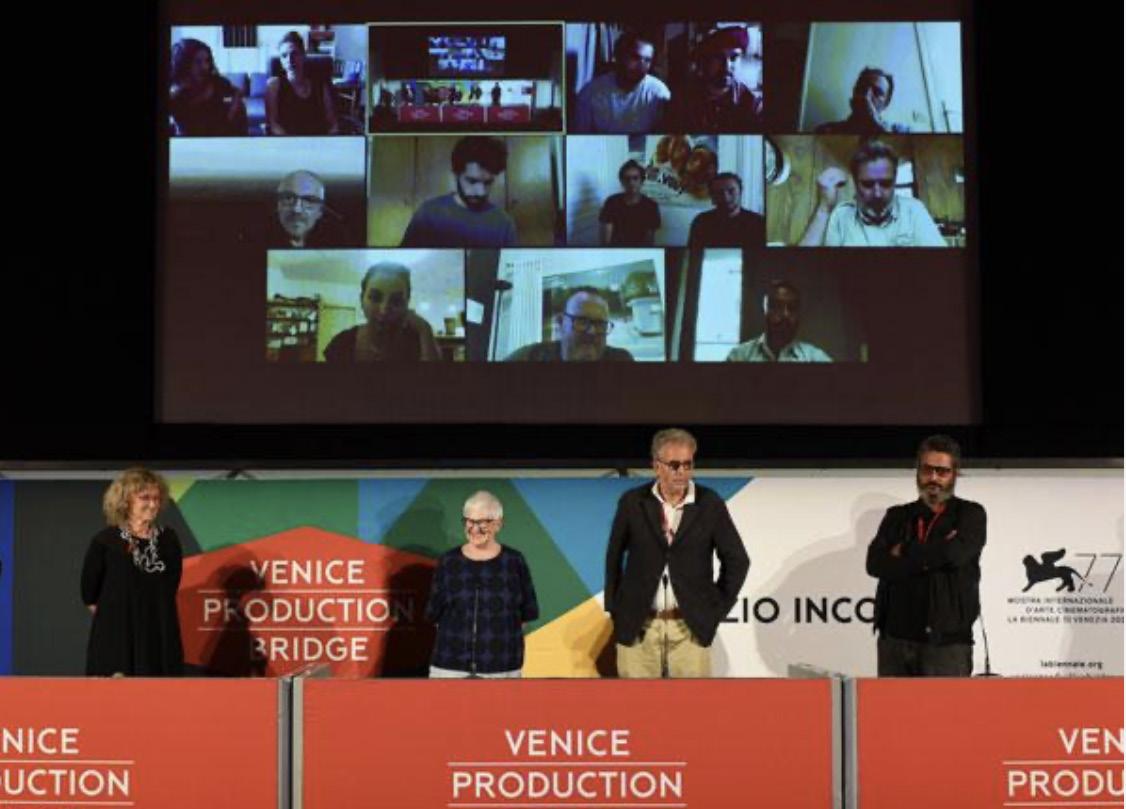
Then there are the lovable quirks and oddities of the Mostra.
Continues next page
Peter Cowie concludes his history of the festival with a look into the future.Venice Production Bridge 2020
Only in Venice, for example, could a former leper colony (the Isola Lazaretto Vecchio) be used to present the Venice Immersive section of the Mostra. Or the time-hallowed practice of announcing the presence of each member of a film’s delegation just before the premiere screening in the Sala Grande. And not forgetting the astute measures introduced during the 2020 and2021 festivals, in the
Only in Venice, for example, could a former leper colony (the Isola Lazaretto Vecchio) be used to present the Venice Immersive section of the Mostra. Or the time-hallowed practice of announcing the presence of each member of a film’s delegation just before the premiere screening in the Sala Grande. And not forgetting the astute measures introduced during the 2020 and2021 festivals, in the

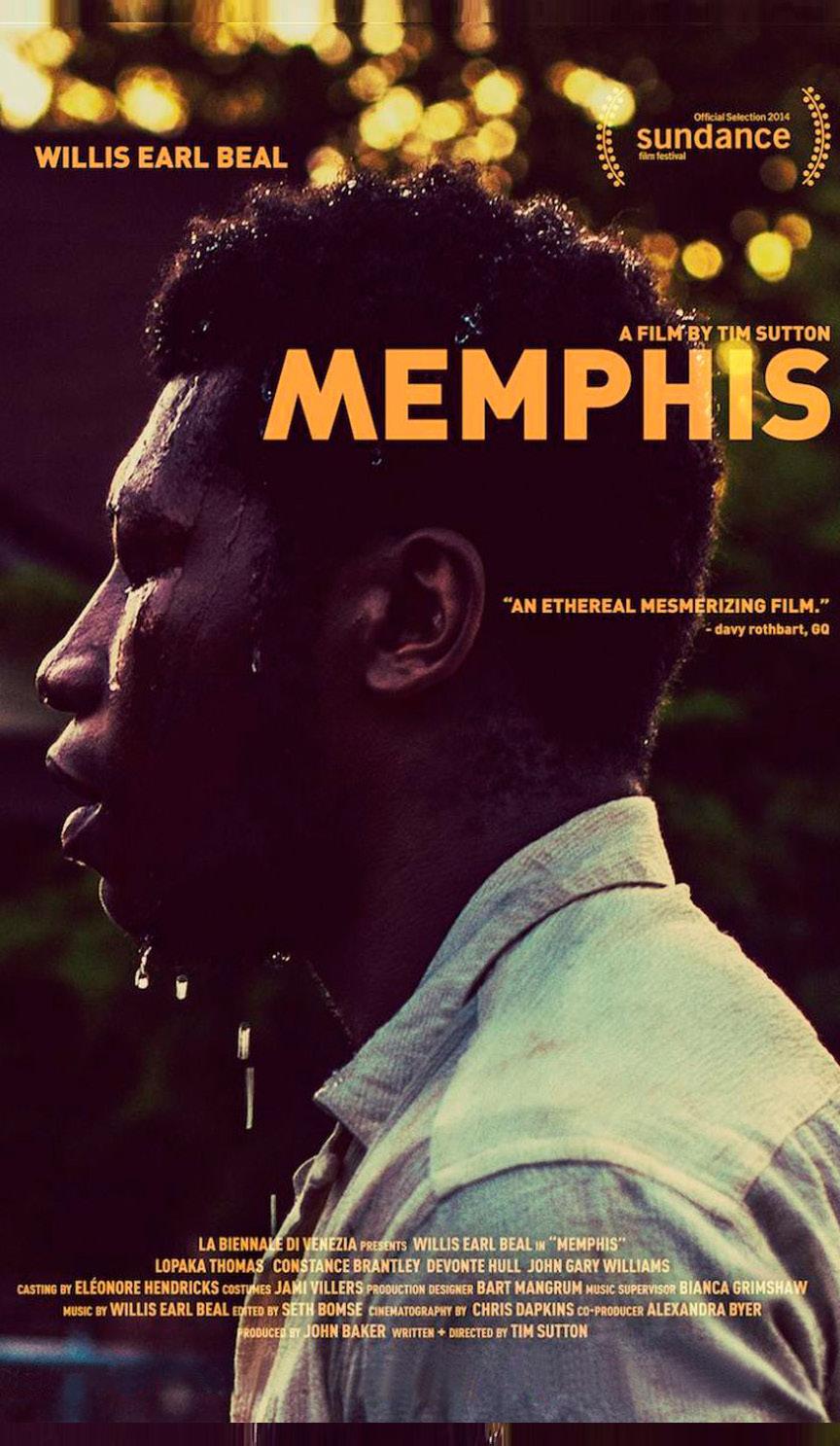
midst of the pandemic, such as discreetly but firmly taking the temperature of everyone entering the festival area, and leaving a seat free on either side of each spectator in the auditorium. Alberto Barbera and his team, staunchly supported by Roberto Cicutto, the current president of the Biennale, have maintained the size of the Mostra within bounds, avoiding the gigantism of certain other festivals, making each annual
midst of the pandemic, such as discreetly but firmly taking the temperature of everyone entering the festival area, and leaving a seat free on either side of each spectator in the auditorium. Alberto Barbera and his team, staunchly supported by Roberto Cicutto, the current president of the Biennale, have maintained the size of the Mostra within bounds, avoiding the gigantism of certain other festivals, making each annual
gathering avoyage of discovery rather than ten days of mere consumption. And, if this cornucopia of international films proves insufficient, you can always visit the Biennale, held in the Giardini and the Arsenale (a short boat ride from the Lido), as well as Forte Marghera. This year it’s Architecture, under the rubric “Laboratory of the Future”. Come to think of it, that description can also be applied to the Mostra.
gathering avoyage of discovery rather than ten days of mere consumption. And, if this cornucopia of international films proves insufficient, you can always visit the Biennale, held in the Giardini and the Arsenale (a short boat ride from the Lido), as well as Forte Marghera. This year it’s Architecture, under the rubric “Laboratory of the Future”. Come to think of it, that description can also be applied to the Mostra.
Biennele celebrates 80 years 1980
September1
September1
14:30 – 16:00
14:30 – 16:00
The Golden Lion was re-introduced, with an ex aequo award for Louis Malle (Atlantic City) and John Cassavetes (Gloria).
The Golden Lion was re-introduced, with an ex aequo award for Louis Malle (Atlantic City) and John Cassavetes (Gloria).
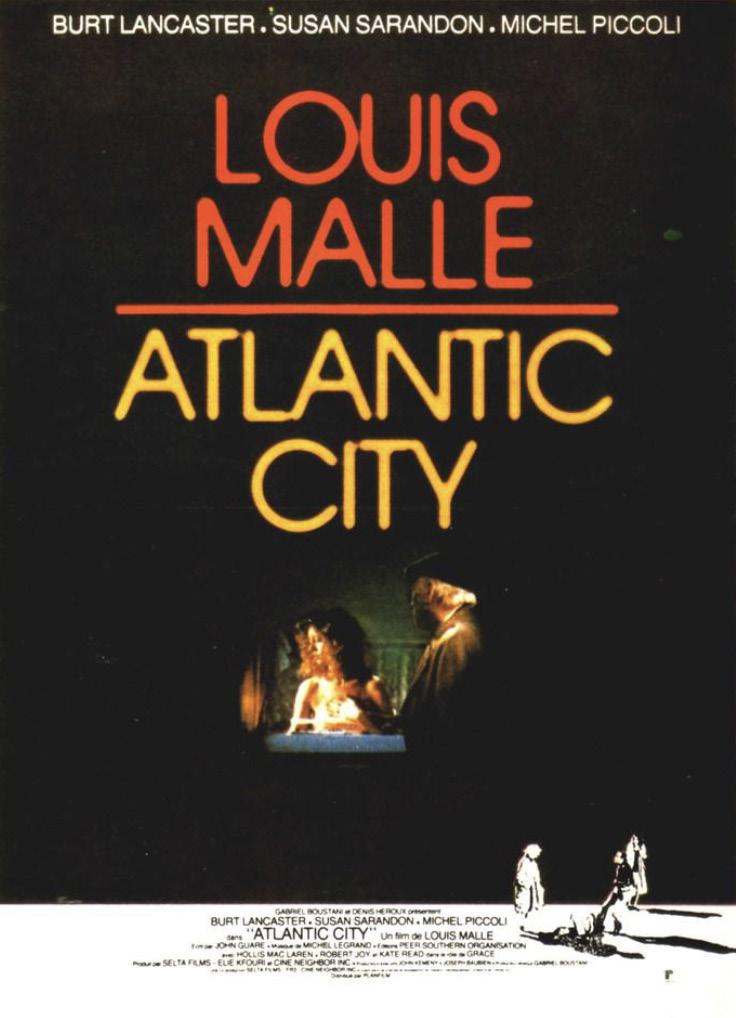

The current media scenario - which sees the film industry no longer as a separate segment, with its own writing and production rules, but as an integrated part of multimedia entertainment - will be the focus of the panel New Image, New Lifestyle. Cinema in the New Media Time, Capture Your Own Story (1 September, 14:30-16:00), in collaboration with Infinix. The meeting will be attended by: Roberto Stabile; Jacqueline Fernandez, actress; Anish Kapoor, CEO, Infinix India; Kobi Mizrahi, Founder, KM Productions; Dalmira Tilepbergenova, Film Director and Screenwriter.
The current media scenario - which sees the film industry no longer as a separate segment, with its own writing and production rules, but as an integrated part of multimedia entertainment - will be the focus of the panel New Image, New Lifestyle. Cinema in the New Media Time, Capture Your Own Story (1 September, 14:30-16:00), in collaboration with Infinix. The meeting will be attended by: Roberto Stabile; Jacqueline Fernandez, actress; Anish Kapoor, CEO, Infinix India; Kobi Mizrahi, Founder, KM Productions; Dalmira Tilepbergenova, Film Director and Screenwriter.
September 2
September 2
11:45 – 13:30
11:45 – 13:30
SPOTLIGHT ON HONG KONG
SPOTLIGHT ON HONG KONG
15:00-16:50
15:00-16:50
THE ANTI PIRACY LAW AND THE FIRST EUROPEAN CAMPAIGN AGAINST THE CAMCORDER
THE ANTI PIRACY LAW AND THE FIRST EUROPEAN CAMPAIGN AGAINST THE CAMCORDER
Events open to all
Events open to all
FOR MORE INFORMATION: ITALIANPAVILION.IT
FOR MORE INFORMATION: ITALIANPAVILION.IT
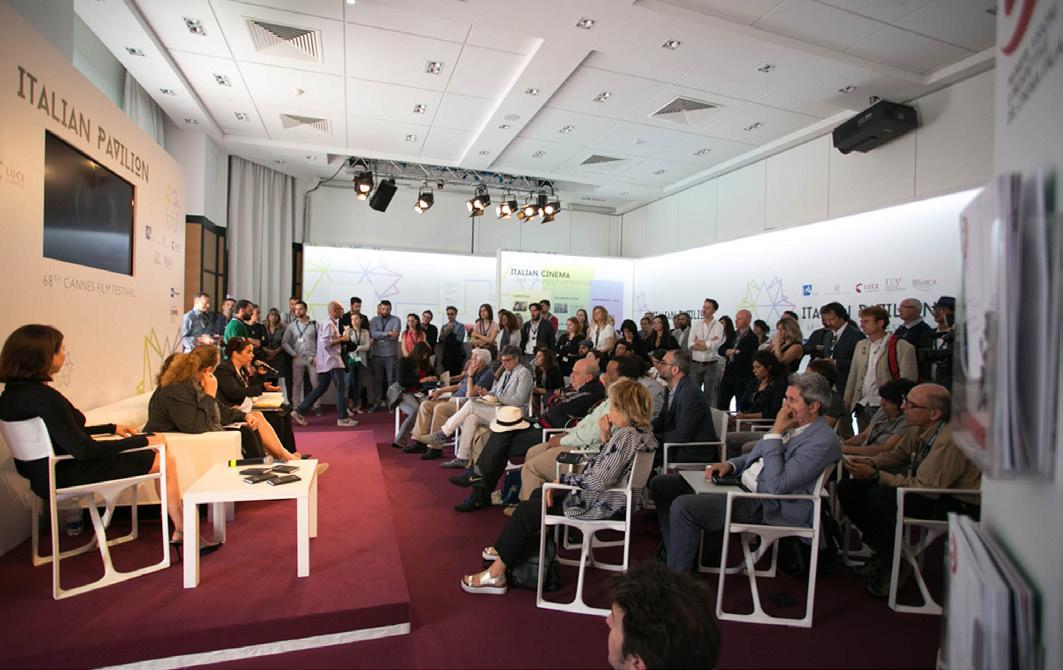
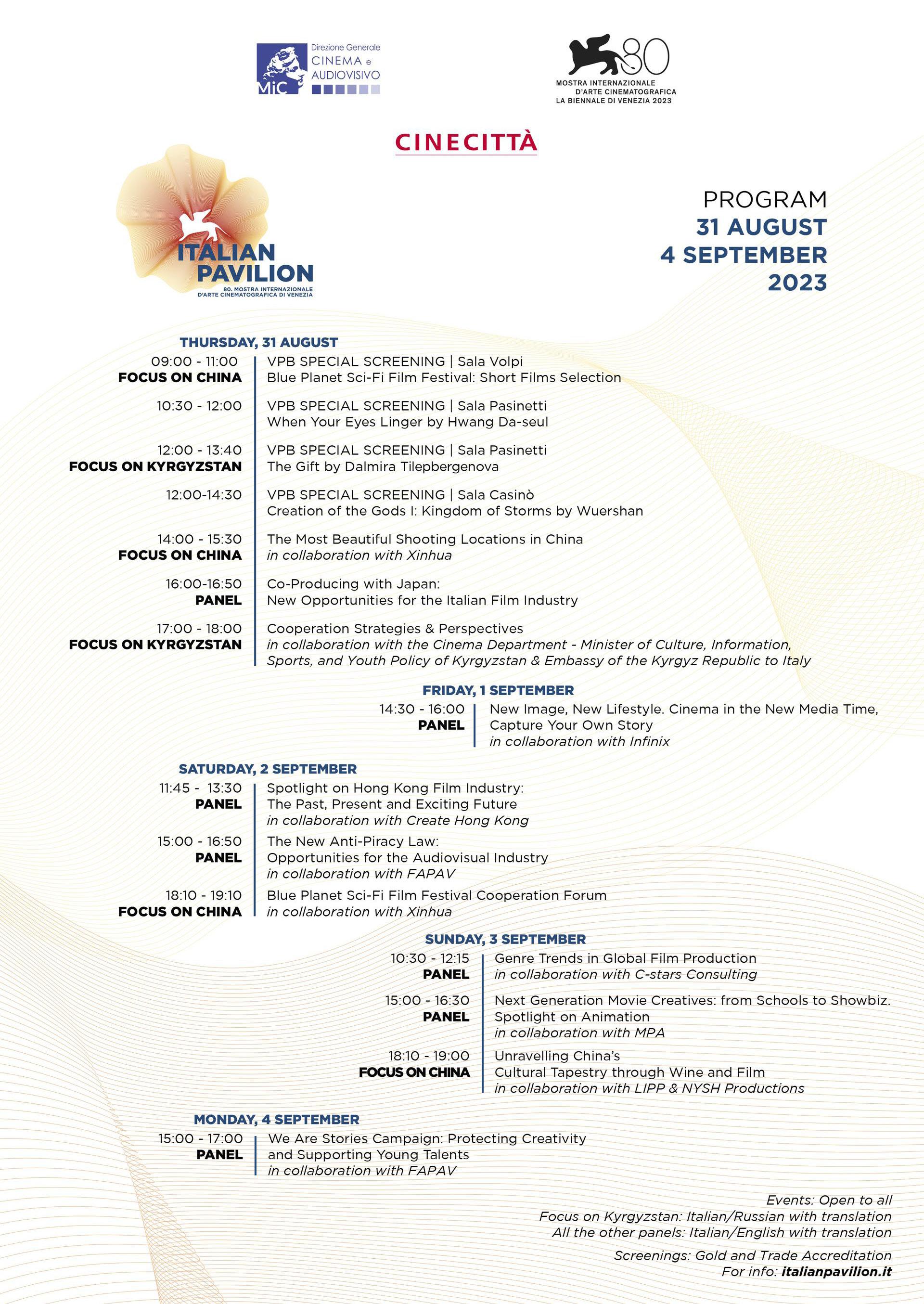
VERDICT: Yorgos Lanthimos and Emma Stone reteam for an audacious comic odyssey that defies genre and convention.
Alonso Duralde, September 1st, 2023

Part Frankenstein, part Belle de Jour, Yorgos Lanthimos’ Poor Things is the latest career summit for the Greek auteur known for telling stories about rela-
tionships, families, and sexuality while tossing many of the rules of filmmaking out of a high window. His first feature since 2018’s The Favourite — reteaming him with Emma Stone — follows an unusual heroine on a grotesque picaresque journey, as she defies the gender roles of the Victorian era and instead

Continues next page
First VR Review In The Immersive Series

VERDICT: Aardman’s beloved duo returns in a demanding but fun VR experience that is part of the 2023 Venice Immersive competition.
Max Borg, September 1st, 2023
As we wait for the new Wallace & Gromit feature film to reach our screens (first announced in 2022, it’s due in 2024 on Netflix internationally, with the BBC getting first dibs in the UK), one way to maintain brand awareness is a new VR project involving Aardman’s beloved animated duo, unveiled at the Venice Film Festival as part of the Venice Immersivesidebar. Specifically, Wallace & Gromit in The Grand Getaway is part of the section’s competitive strand, which speaks to somewhat loftier ambitions for this interactive experience that is aimed mainly at adult fans of the franchise (the 60-minute running time and slightly demanding setup might be a deterrent for younger viewers).
The premise is very simple: Wal-
Continues next page
From previous page
discovers her own agency. Of course, in a Yorgos Lanthimos film, this journey never travels a predictable route. Bella (Stone) at first appears to be a feral creature, dropping plates, spitting out food, and gleefully stabbing the eyeballs of cadavers being stored by her caretaker, physician and professor Godwin Baxter (Willem Dafoe), whom she calls “God.” Baxter — his face a mass of scars and his body in constant need of hook-ups to external machines because of his surgeon-father’s experiments upon him — brings medical student Max McCandles (Ramy Youssef) home to observe Bella’s progress.

Max becomes smitten with Bella, and Baxter confesses how she came to enter his household: Baxter found the body of a pregnant woman who had just jumped off a bridge to her death, and rather than revive her (and have her subjected to life in an asylum for having attempted suicide), the doctor transplanted the fetus’ brain into the mother’s body, creating an adult discovering the world again as a child. Baxter keeps Bella hidden away from Full Review, click here
lace, the eccentric, cheese-loving inventor, and Gromit, his brilliant and trusted canine companion, are planning a vacation, and decide to use their old rocket (from the very first W&G short A Grand Day Out) to get to their destination as quickly as possible. Throughout the two chapters, the viewer, equipped with a headset and controllers, must help either Wallace or Gromit with various tasks, essentially solving small puzzles to advance the story. Assistance comes in the form of BERYL, a new invention voiced by British actress/comedienne Miriam Margolyes (Wallace’s lines are supplied by his current voice actor Ben Whitehead, while Gromit remains silent as usual).
Now, full disclosure: this writer
didn’t get to experience the adventure in its complete form, as the version available for the press preview day had a minor bug that made it necessary to skip ahead to Chapter 2 instead of completing the very last task at the end of Chapter 1. That said, the technical incident didn’t have that big an impact on the enjoyment factor, a key component when having to spend an hour being an active participant in the virtual, almost 360-degree environment.
That The Grand Getaway succeeds on the entertainment level is mainly due to the painstaking attention to detail in recreating the world of Wallace and Gromit, specifically the interiors of their house at 62 West Wallaby Street in Wigan (a

VERDICT: In a multi-faceted role, Caleb Landry Jones dazzles as the survivor of an inhuman childhood who believes only dogs can love him, in Luc Besson’s calculated, over-the-top yet poignant shaggy-dog story.
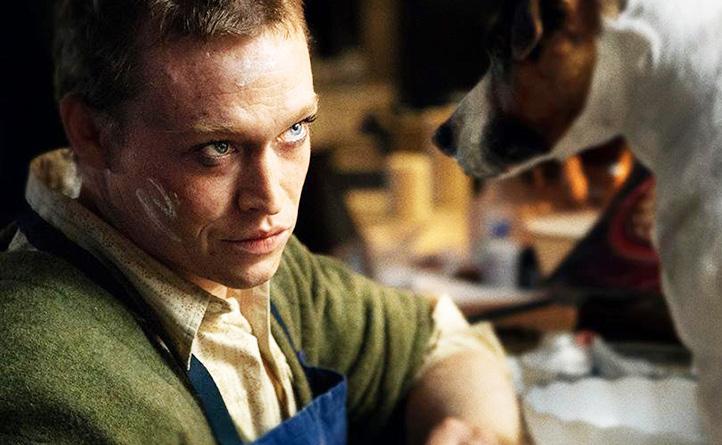
Deborah Young, August 31st, 2023
Prolific French writer, director and producer Luc Besson returns to the big screen with Dogman, a highly watchable concoction stuffed with emotion and its own brand of suspenseful action.
Already dubbed his “comeback” film, it offers the audience an entertaining, offbeat character study of a deeply hurt man who isolates himself from human beings and surrounds himself with loyal, loving dogs who do his bidding, even killing for him. It is hard not to feel there are autobiographical elements underlying parts of the film, which Besson wrote before he was acquitted in June of rape allegations brought by an actress in 2018.
Fans of this imaginative director will find plenty to enjoy – the resilience and humanity of Douglas (a.k.a. Dogman), his fondness for make-up and his splendid drag impersonations, from Piaf to Monroe; his incredible dogs, his lack of self-pity, and his underlying ruthlessness in defending himself and his canines (“my babies”). Filling this hunky central role with charm and wit is Caleb Landry Jones, who played the ad salesman in Three Billboards Outside Ebbing, Missouri, and who gets a chance to let his talent really shine. His performance, taking in all the complexity of the character’s split personalities, flashes on Michael Keaton in Birdman, and will no doubt be remembered when the Venice jury deliberates this competition entry. But while Dogman effortlessly stirs up pathos, it lacks the literary and theatrical layers that won González Iñárritu’s black comedy four Academy Awards including Best Picture. Dogman is not a comedy at all, but a casual mix of atmospheres ranging from American Gothic (his nightmare childhood) to TV police shows (he recounts the story of his life to prison psychologist Dr. Eve-
Full review, click here

VERDICT: Wes Anderson’s second Roald Dahl adaptation packs a feature’s worth of deadpan humor and aggressive visual style into just 37 minutes.
Alonso Duralde, September 1st, 2023
If Asteroid City was writer-director Wes Anderson’s love letter to the stage, his new Netflix short pays homage to stagecraft, with flats, backdrops, props, and even hair and makeup changes flying in from the wings.
An adaptation of the Roald Dahl story, The Wonderful Story of Henry Sugar is as much about the director’s love of arch humor, fourth-wall shattering, and aggressive art direction as it a redemption saga about a rich man who finds purpose in his life.
As such, it’s another entry in Anderson’s filmography which will delight his admirers while alienating his detractors, a commitment to a personal aesthetic that’s all too rare in contemporary cinema.
Another comparison to Asteroid City lies in the fact that Henry Sugar wraps a story within a story within a story: we open with Ralph Fiennes as Dahl, showing us his author’s hut before launching into the tale of Henry Sugar (Benedict Cumberbatch), a useless rich man drifting through life without any real purpose

Full review, click here
VERDICT: A beautifully imagined and played tale of men at war with the elements and each other with just a few screenplay hiccoughs.
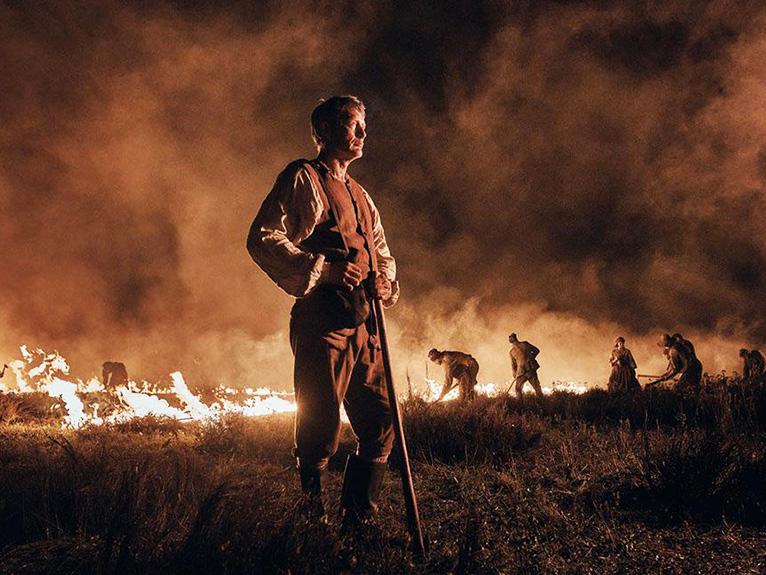
After The Royal Affair, which gave us Mads Mikkelsen and a then-unknown Alicia Vikander in a tumultuous Rococo-era court romance, Danish writer-director Nikolaj Arcel goes back to the 18th century for another story of power struggles and romance in The Promised Land (Bastarden). In this gorgeously lensed adaptation of a novel by Ida Jessen, Mikkelsen stars as Ludvig Kahlen, a former army captain who has decided he will be the one to finally tame the Jutland heath, a gigantic, barely fertile region that corresponds to roughly the western half of Denmark. Besides the elements, the almost penniless Kahlen has to brave the desire of a wealthy and extremely cruel local aristocrat to get the king to recognise his (invented) ownership over this hostile land.
Arcel again works his magic on a widescreen canvas, while Mikkelsen, fresh off his Indiana Jones shenanigans, proves once more he’s one of the world’s most charismatic actors — even, or perhaps especially, when he seems to be doing very little. The Promised Land premiered in competition in Venice, the first Danish film to do so in over two decades, and should see solid play beyond home turf after its fall festival run that also includes TIFF, San Sebastian and Busan.
Full review, click here
VERDICT: Dazzling camerawork and an exceptional trio of teenage actors dangle from a weak narrative thread in Alain Parroni’s intense first feature about underprivileged kids growing up without a future.

Deborah Young, September 1st, 2023
Three inseparable friends, two boys and a girl, grow up in grinding poverty in the hinterlands outside of Rome in An Endless Sunday (Una sterminata domenica).
It’s a scenario out of an early Pasolini movie like Accattone or Mamma Roma, skillfully updated to reflect a contemporary world so bleak and futureless it hardly seems like it’s in Europe, and only
the energy of the young protags lifts the spirits. Strong on establishing atmosphere, it’s much less convincing when a strained drama finally gets underway towards the end. The film, which counts Domenico Procacci and Wim Wenders
among its producers, should anyway get noticed when it bows in the Venice Orizzonti section.
Debuting director Alain Parroni, who has a solid background in cinematography and short films, does
Full review, click here


VERDICT: The rich/poor divide in India is staggeringly vivid in Karan Tejpal’s first feature ‘Stolen’, the desperate search for a stolen baby that is powered by exciting chases and the constant threat of violence.
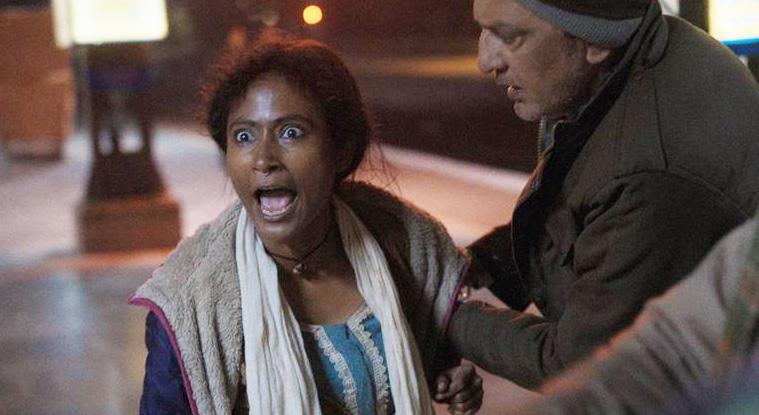
Deborah Young, September 1st, 2023
Karan Tejpal makes a striking feature debut with Stolen, engaging audiences in the frightful, all-tooreal situations that can arise in India over a minor misunderstanding with the police, which snowballs into full-fledged danger for two brothers.
Meanwhile, a poor tribal woman sleeping on a bench in the train
station awakens to find her infant daughter gone. The intersection of these three characters explodes in a cross-country hunt for the stolen baby that astutely blends the excitement of action scenes with deeper social themes and, for one of the brothers, a coming to terms with the need to become person-
ally involved in a stranger’s problems.
The screenplay also walks a fine line in exposing police corruption and incompetence, in a story that requires their assistance to come out right in the end. Shot entirely
Full review, click here
while the siblings were studying, he tells The Film Verdict. “It’s a work of art in itself,” he adds, sitting alongside his sister and father - his collaborators on the project.
Discussing working as a family, Santiago says: “We have a rule that the story is the one that rules. Everyone wants the best for the story. We work things out.”
The project is the first feature produced entirely by K&S Films Mexico. The main company is based in Argentina. Sales are being handled by Vicente Canales’ Barcelona-based Film Factory.
by Liza ForemanOscar-winning writer Guillermo Arriaga (21 Grams, Amores Perros, Babel) wasn’t even 30 when he was asleep in a car which fell off a cliff.
But instead of ending his life, the near-fatal accident inspired the Mexican multihyphenate’s first screenplay entitled ‘A Cielo Abierto’ in his native tongue.
Written in his mid 30s, three decades later the script has become the basis for his children, Santiago and Mariana Arriaga’s feature debut. The siblings codirected the film from their father’s original screenplay.
“What ignited our wish to do this
film was to imagine our father being killed. This fear was huge,” says Santiago.
“It was and still is our fear,” Mariana adds. “And the characters being brothers was something we could identify with.”
This story of revenge follows three teens who take a road trip through the Mexican desert to the American border to track down the man that caused their father’s death in a car accident.
The dramatic road movie world premiered in the Orizzonti section of the festival August 31, 2023.
Eight years in the making, Santiago found the manuscript in a box
Shot in the desert where the family often went on trips, the feature was filmed over a period of forty days, between October and December.
“It was a huge challenge. The desert. Extreme temperatures. New actors. But we had a solid team,” says Mariana, adding, “We went to the border very often as a family. We have an emotional attachment to the area.”
Newcomers Federica García, Máximo Hollander and Theo Goldin head the cast that includes Cecilia Suárez, Sergio Mayer Mori, Julio César Cedillo, Julio Bracho and Manolo Cardona.
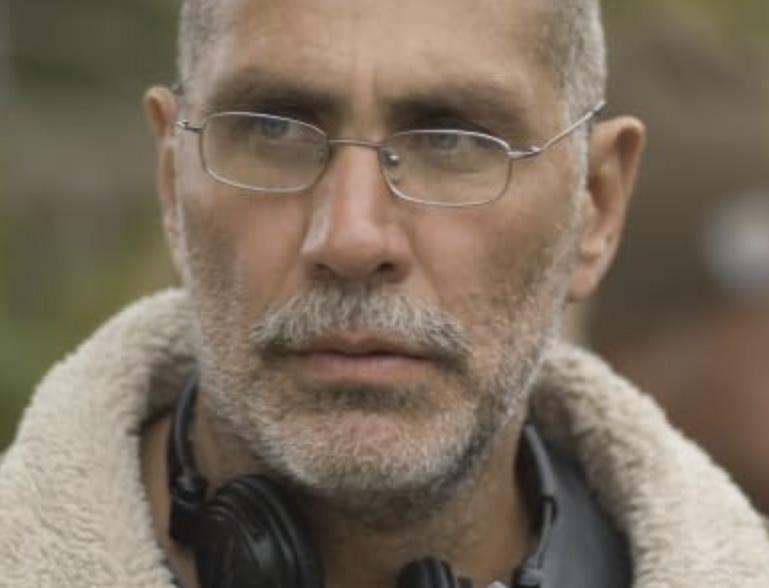
“Drawing on personal experience is key to filmmaking,” says Guillermo. “I had a car accident.
Full article, click here

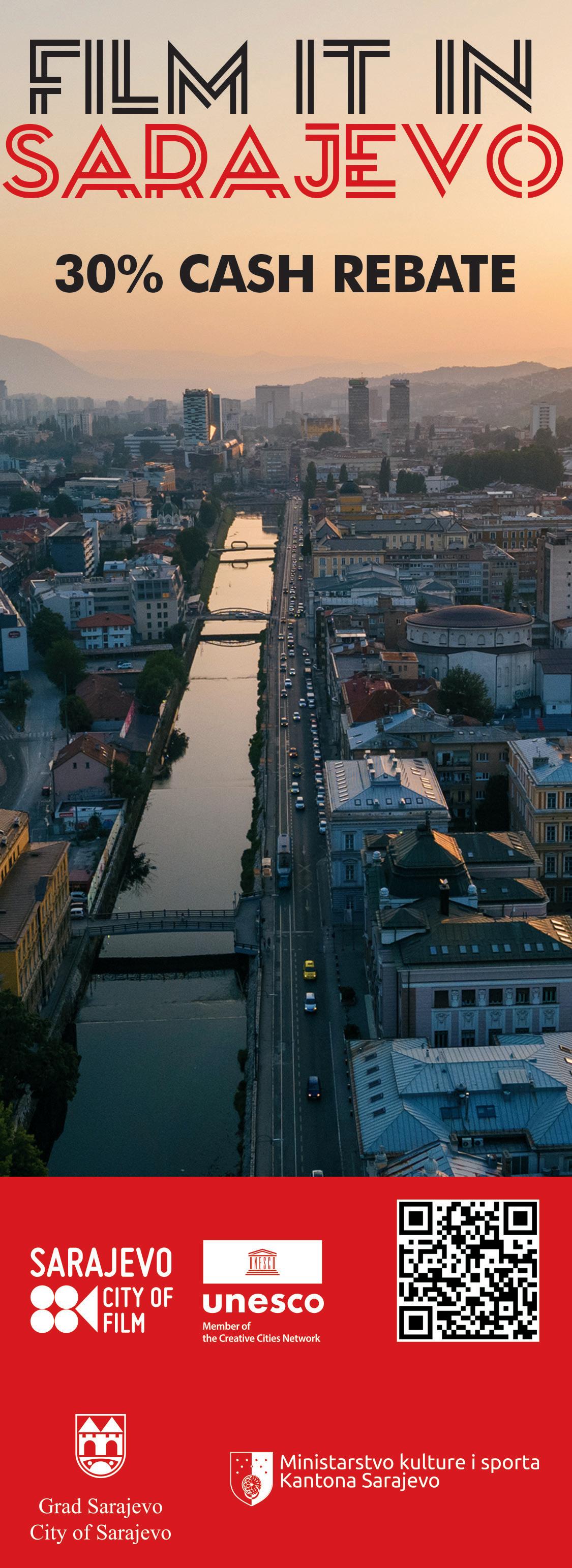
Biennele celebrates 80 years
1983
Under the direction of Gian Luigi Rondi. the Festivals were numbered once again, the sections were made permanent fix-tures and greater attention was given to the masters of cinema from the past and present.
The main event of this edition was, out of competition, the premiere of Heimat, an almost 16 hours-long film directed by Edgar Reitz.

1984 also saw the creation of SIC, the International Critics’ Week, run independently by the National Italian Film Critics Union and devoted to debut and second works.

10:30 – 12:15
New trends in film production and how the most popular genres change from one country to another will be discussed during the panel Genre Trends in Global Film Production (3 September, 10:30-12:15), in collaboration with C-stars Consulting and with speeches by: Élise Girard, Film Director and Screenwriter of the movie Sidonie au Japon, which will be presented in competition at Venice “Giornate degli Autori”; Shozo Ichiyama, Film Producer, Kris Phillips, singer and actor, starring in the blockbuster Creation of the Gods I: Kingdom of Storms, by Chinese director Wuershan, who will also be a guest of the panel.
15:00 – 16:30
The now well-established collaboration with MPA will be renewed: every year, as part of the Venice Film Festival, the Motion Pictures Association will dedicate an in-depth study to a different aspect of the audiovisual industry. This time the spotlight will
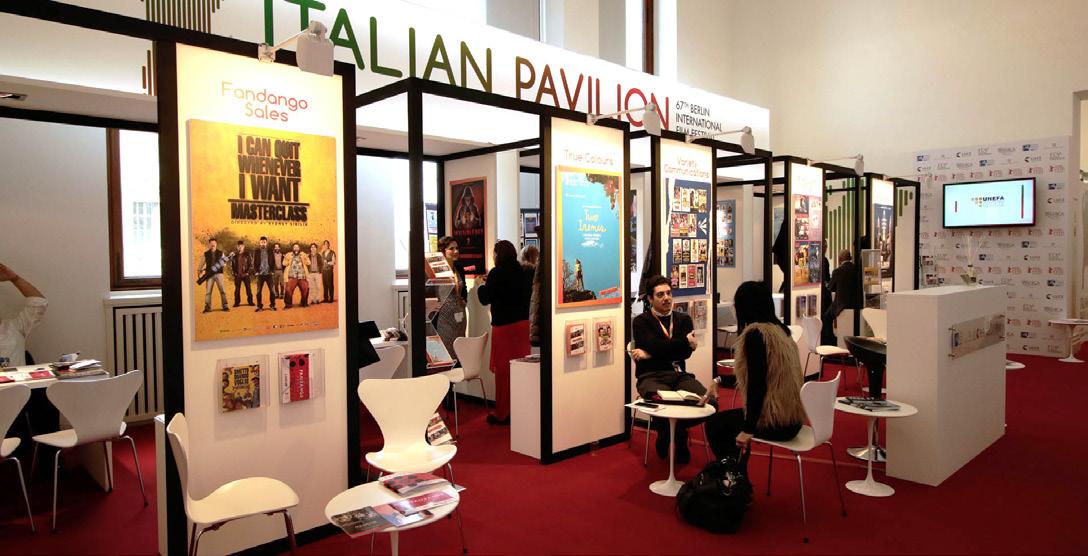
be on animation, as part of the panel Next Generation Movie Creatives: from Schools to Showbiz. A Spotlight on Animation. A number of leading figures in the sector will participate, and on this occasion they will have the opportunity to exchange views with representatives of the italian institutions. Speakers will be: Lucia Borgonzoni, Undersecretary of State for Culture, Italian Government; Emilie Anthonis, Senior Vice President Government Affairs, Head of Policy, MPA EMEA; Nicola Borrelli, Director General, DGCA-MiC; Nicola Maccanico, CEO, Cinecittà; Roberto Stabile, Advisor for International Relations|Head of Special Projects, DGCA-MiC/Cinecittà; Alfio Bastiancich, Vice President, Cartoon Italia; Iole Maria Giannattasio, Head of Public Policy, Netflix Italia; Manuela Cacciamani, Founder and Producer, One More Pictures; Giulio Carcano, Head of Theatrical Distribution, Disney Italia; Marco Chimenz, CEO, Cattleya; Sergio Del Prete, Director, Anica Academy; Giorgio Scorza, CEO, Movimenti Production and Scott Votaw, Executive Director, Georgia Film Academy.

A new in-depth discussion that will bring together film enthusiasts, industry experts and food lovers will be offered by the panel Unravelling China’s Cultural Tapestry through Wine & Film (3 September, 18:10-19:), in collaboration with LIPP and NYSH Productions. The meeting will celebrate China’s passion for viticulture, which is the focus of Sebastian Basco’s documentary Waking the Sleeping Grape, to be screened the same day in the Sala degli Specchi of the Grand Hotel Ausonia Hungaria.


VERDICT: The Venice Film Festival has made headlines in some quarters for selecting the latest works of three controversial filmmakers.
Max Borg, September 3, 2023
Not too long ago, we were wondering if the age-old “separate the art from the artist” philosophy was still at play in the context of festivals, with a general idea that European events were more open to works from controversial directors compared to American ones. Toronto, for example, canceled the world premiere of Ulrich Seidl’s Sparta at the eleventh hour last September, after German media suggested the Austrian filmmaker had been dishonest with the younger cast regarding the film’s premise. The film bowed without incident at San Sebastian.
In the case of Venice, which has repeatedly claimed to be a festival and not a tribunal, the 2023 edition
Continues next page
Alonso Duralde, September 3, 2023

The world of hired killers is an endlessly fascinating one for filmmakers; the 2023 edition of the Venice Film Festival features no less than three, from the likes of Harmony Korine, Rich-
ard Linklater, and David Fincher. Fincher’s The Killer comes to the screen with the filmmaker’s trademark style and craft, but even as he reunites with his Seven screenwriter Andrew Kevin
VERDICT: David Fincher brings his considerable style and craft to this procedural about a professional assassin, but not even Michael Fassbender can make the character distinguishable from a thousand other cinematic hired guns. Full review, click here
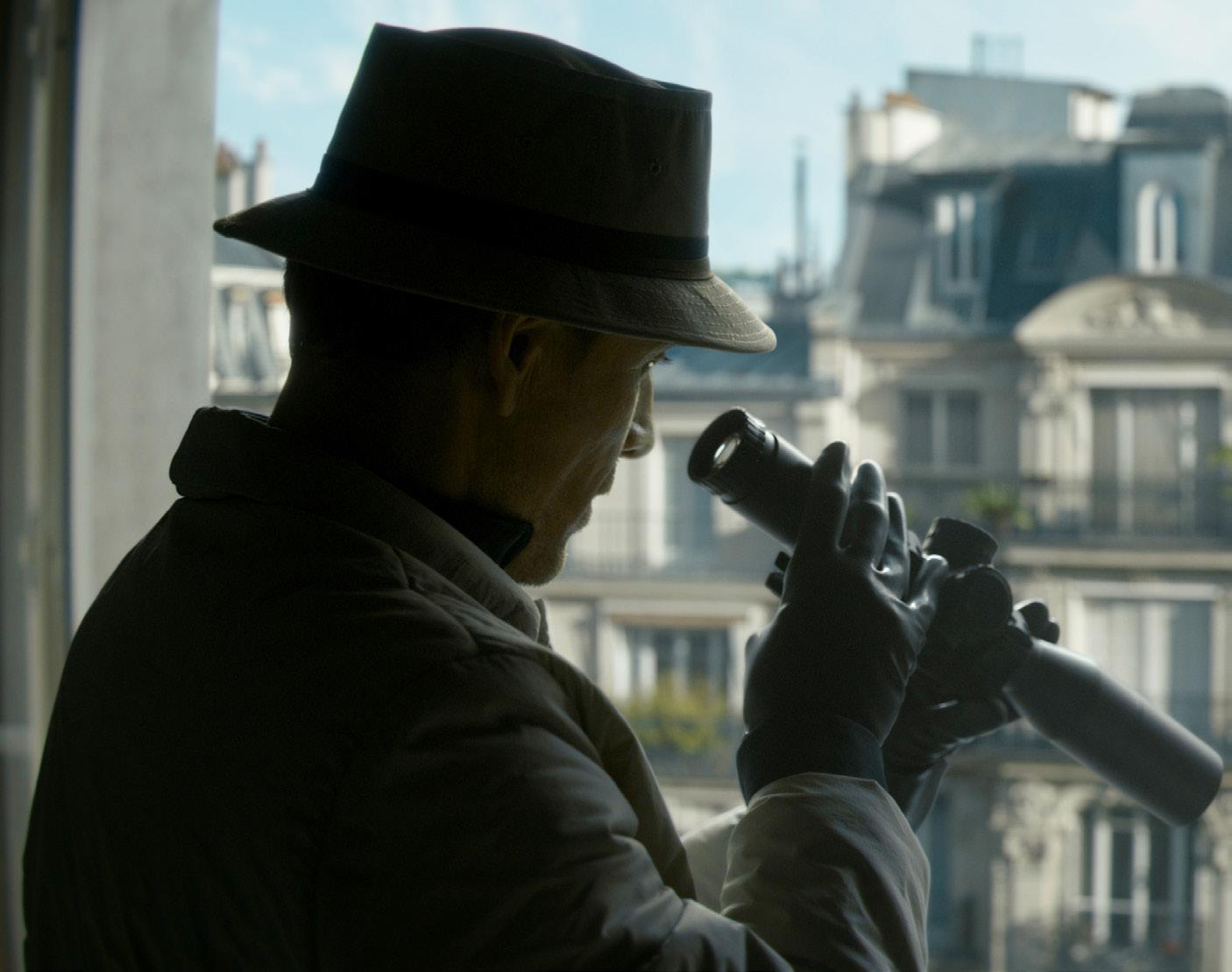
VERDICT: Frederick Wiseman’s latest observational documentary is a four-hour look at a French dynasty of chefs at the highest possible level.
Kevin Jagernauth, September 3, 2023
Six years into retirement, 42-yearold former world featherweight champion Willie Pep still has some fight in him.
With three ex-wives, one son, a father in the hospital, and money running out, he agrees to have a film crew follow him around to
capture his planned return to the ring. What they find in Robert Kolodny’s clever and inventive faux documentary feature debut The Featherweight is the much more interesting story of a man unable to forget who he was as he tries to build a future he can’t imagine.
“I’m older now, so I’m always looking back,” Willie reveals.
It’s 1964 and the boxer, played by James Madio, has settled in his old stomping grounds of Hartford, Connecticut where his impressive legacy (220 wins and 10 losses) carries more currency than his money in the bank (he earned $1.2 million over his career and spent $1.3 million, he cracks). He’s a glad-hander,
Scandals continued from page 1
is arguably the pinnacle of such a mindset. “There’s nothing left to say on the matter,” said Alberto Barbera in a recent interview with the Venetian newspaper Il Gazzettino on the subject of having the new films by Roman Polanski, Woody Allen and Luc Besson in the Official Selection. His stance has always been that the festival is all about the quality of the work, which caused some to question the inclusion of Luc Besson in competition. (But this was before the festival started, and in a plot twist even M. Night Shyamalan might regard as outlandish, Besson’s Dogman has actually been much better received than Polanski’s The Palace, while Allen’s Paris-set Coup de Chance has not yet screened at the time of writing.)
That at least one of the three would be included in the competition lineup was a foregone conclusion, given that Polanski’s previous film An Officer and a Spy played to great acclaim on the Lido in 2019 and even won the Silver Lion
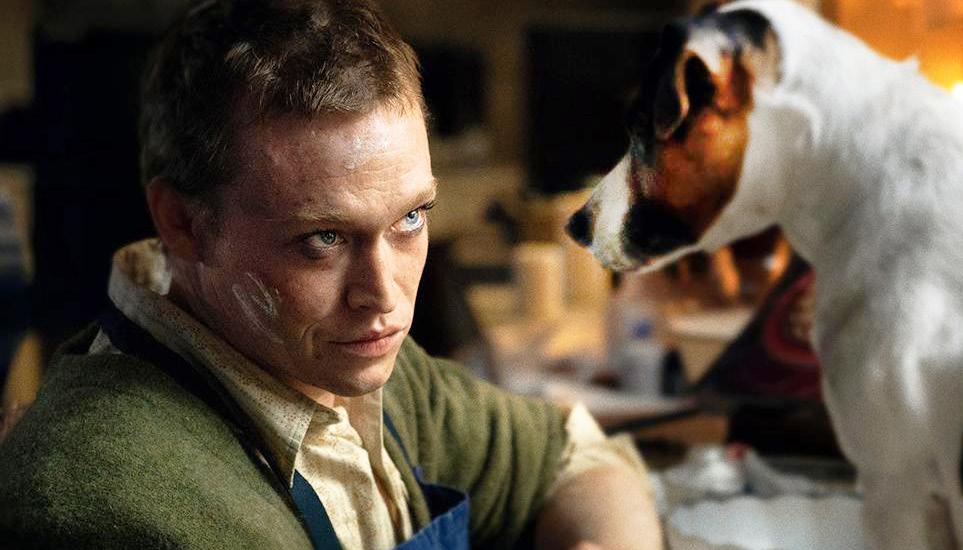

Full Article, click here
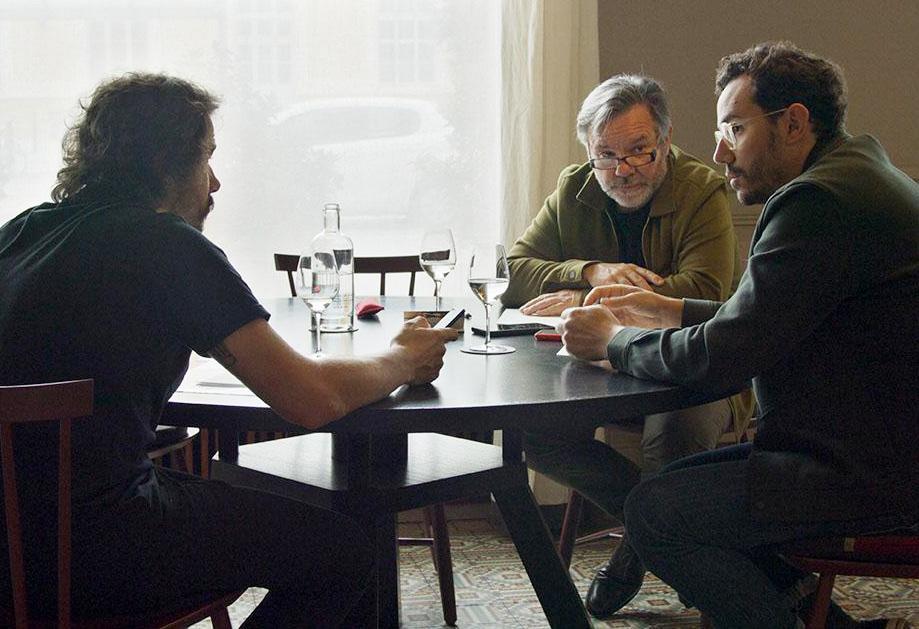
VERDICT: Timm Kröger’s ambitious new feature tips its hat to the genres of yesteryear, though it’s the atmosphere more than the story that impresses in the end.
Boyd van Hoeij, September 3, 2023
A doctoral student in physics finds himself in a rather odd Alpine resort in the early 1960s in The Theory of Everything (Die Theorie von Allem) from German director Timm Kröger.

Classifying the genre of this ambitious feature, shot mostly in crisp black-and-white and in widescreen, is almost as complicated as understanding quantum mechanics. Kröger borrows liberally from sources from across the 20th century, splicing in elements of science fiction, fantasy, film noir, mystery, 1970s German television shows and many other things besides to create a surprising but not always easy-to-follow collage that is very unlike most contemporary German-language films. Its premiere in a prime competition slot in Venice should ensure it has a good measure of visibility on the international circuit, though the hard-to-classify product itself will not appeal to everyone.
The Theory of Everything opens in 1974, when a bearded Johannes Leinert (Jan Bülow) is a guest on a cheap German chat show shot in Hamburg. He’s there to talk about the book he has written called The Theory of Everything, which the presenter assumes is fiction, though Leinert seems to suggest that perhaps it’s not science fiction or a romance at all but rather… reality.
VERDICT: The inability to open oneself to love is the main beast of Bertrand Bonello’s striking and cerebral film that follows a stalled relationship over three time periods, though the message in the central portion doesn’t have the same resonance as the other two.
Jay Weissberg, September 3, 2023
There’s a compelling watchableness about all Bertrand Bonello’s films, notwithstanding the not infrequent case that some elements work brilliantly and others seem somehow misjudged, as if all the strands he’s brought together succeed on their own but don’t always mesh in a meaningful way. That was the case with Zombi Child and it’s also true of The Beast, a film set in three time periods of which only two mutually resonate.
Very loosely based on Henry James’ late novella The Beast in the Jungle, in which a man’s inability to open himself to love is the cause for his lifelong premoni-
tion of catastrophe, Bonello’s Beast turns the questioning figure into a woman, played to perfection by Léa Seydoux, and weaves together three incarnations, from 1910, 2014 and 2044. Cerebral and striking in all periods, the film works on richly meaningful levels in the first and third periods but loses its universality with the 2014 story, when the man is made into an incel. While intriguing on its own, the plot twist Full Review, click here Full Review, click here

VERDICT: Roman Polanski’s appallingly bland black comedy about the filthy rich is set in a fancy Swiss hotel on New Year’s Eve 1999, and not the least bit funny.
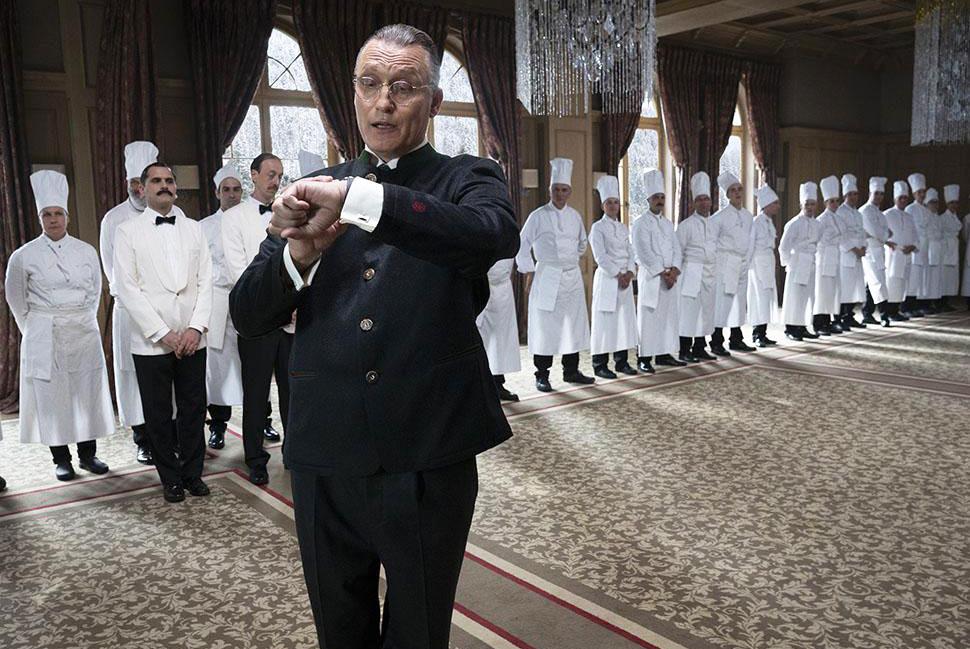
Deborah Young, September 2, 2023
The world’s wealthiest people gather in Switzerland’s posh Gstaad Palace Hotel to ring in the Millenium with all its Y2K uncertainties: how could the director of the amusing parody Fearless Vampire Killers miss squeezing some laughs out of a situation dripping with more irony than diamonds off an heiress’s neck?
Perhaps a theme, a plot, a storyline would have helped? Writer-director Roman Polanski’s The Palace is a situation waiting for comedy to come along; a portrait oozing with bitterness, spite and disgust for a society that lusts after the demon money, amplifying their vulgarity at every turn. There isn’t much more to the film than that.
Venice has always been a pretty safe haven for Polanski’s movies, though his open court case over accusations that he raped a 13-year-old girl in 1977 have made it impossible for him to physically attend the festival. It nevertheless proved a good launching pad for his last film, the 2019 historical drama An Officer and a Spy about the Dreyfus affair: the film took home a Silver Lion Special Jury Prize and proceeded to be nominated for many more awards around the world (rarely winning, however.)
More is the shock to see The Palace’s flimsiness, which is even more glaring against the generally high production values and a decent cast that includes Oliver
Full Review, click here

VERDICT: ‘The Featherweight’ is an inventive faux doc portrait of boxing great Willie Pep who faces his greatest fight yet: his own legacy.
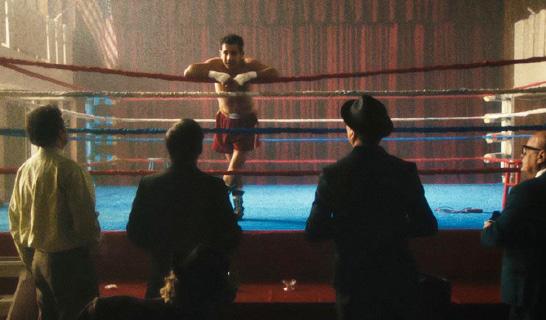
Kevin Jagernauth, September 3, 2023
Six years into retirement, 42-yearold former world featherweight champion Willie Pep still has some fight in him.

With three ex-wives, one son, a father in the hospital, and money running out, he agrees to have a film crew follow him around to capture his planned return to the ring. What they find in Robert Kolodny’s clever and inventive faux
documentary feature debut The Featherweight is the much more interesting story of a man unable to forget who he was as he tries to build a future he can’t imagine.
“I’m older now, so I’m always looking back,” Willie reveals. It’s 1964
and the boxer, played by James Madio, has settled in his old stomping grounds of Hartford, Connecticut where his impressive legacy (220 wins and 10 losses) carries more currency than his money in
Full review, click here

VERDICT: Hungarian director Dorka Vermes’ feature debut ‘Arni’ is a slow-burn slice-of-life drama with an exceptional lead performance from newcomer Peter Turi.
Oris Aigbokhaevbolo, September 3, 2023
The eponymous character in Arni, a product of the 2023 Venice Film Festival‘s Biennale College Cinema, is a young member of a travelling circus family. He’s a worker, a handyman, and, apparently, the only non-family member in the group. It is never really clear if this is the reason he seems like an outcast of sorts, although the family itself hardly screams warmth. In any case, at the start of this super-dry account of the life and work of the troupe, Arni is required to bring in a selection of workers to erect a tent, which will be used for a forthcoming show. He chooses to scout for his men in a bar, where
he asks for water and is handed a glass of clear liquid. He spits once it reaches his mouth — it’s alcohol. The bartender, a mischievous lady, laughs. Another patron does the same. On this evidence, Arni is a sucker. But he does get his men. Or does he? Back home, he is berated for hiring drunks as workers. The family’s patriarch and chief bully also says he has paid the men too much. Who needs enemies when you have co-workers
like this? With these scenes, all of which are mediated by low light photography and a bleak, barely-there score, the principal mode of action is revealed to be melancholy. When one of Arni’s associates takes him for a rough, joyless quickie in the woods, the picture is complete.
There can be no more doubt what kind of movie this is: a slice-of-life depiction of an isolated young man
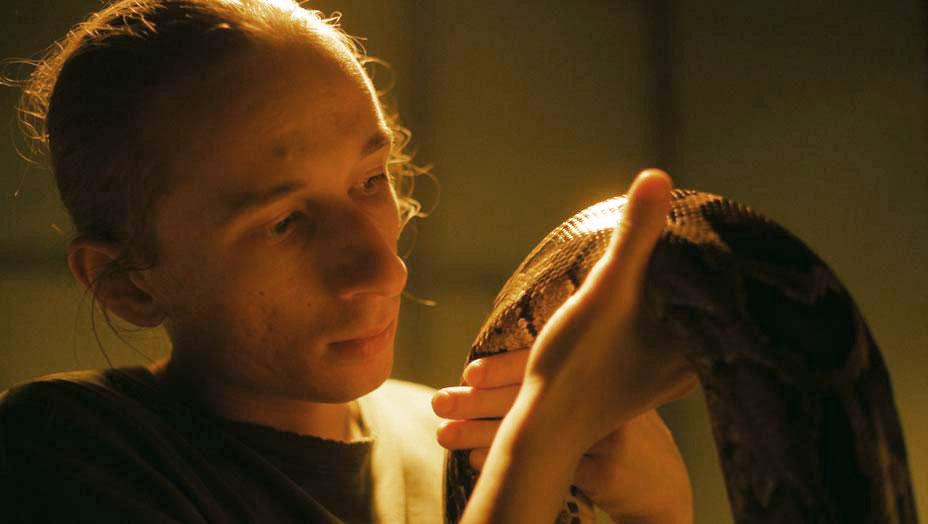
Full review, click here
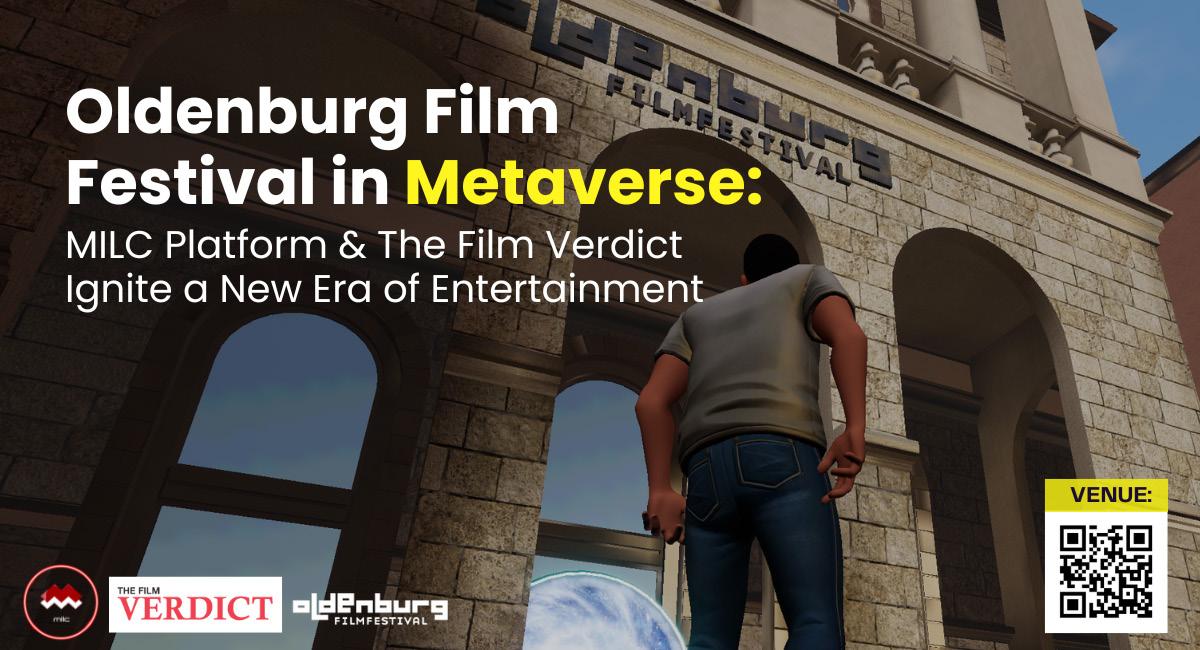
VERDICT:The low-key Dutch domestic drama ‘Melk’ doesn’t quite manage to set itself apart enough from its competitors.
Boyd van Hoeij, September 2, 2023
A Dutchwoman whose pregnancy ended in the loss of her child clings to the breast milk she starts producing in a nearly obsessive manner in Stefanie Kolk’s feature debut Melk.

A domestic and largely internalised story that avoids histrionics and melodrama completely, Kolk’s first steps in the world of feature films suggests she’s a measured storyteller with an interest in possibly telling minutiae. But this isn’t quite enough to make a splash in today’s overcrowded marketplace, neither at home, where slow-moving arthouse films are basically but a single blip on the box-office radar, or on the international festival circuit, where its exceedingly well-mannered execution might be less of an eye-catcher than something with a stronger auteurist stamp.
The film opens with the protagonist, Robin (Frieda Barnhard), in a doctor’s office, where she’s told how they’ll induce the contractions that’ll allow her to evacuate her baby. With her pale complexion, jet-black hair and high cheekbones, she looks like a contemporary Snow White, though clearly this is not a fairytale.
Robin’s partner — no Batman jokes, please! — seems to mostly just sort of be there instead of either going into full-on moral-support mode for Robin or having a breakdown because he, too, lost their
September 4
15:00 – 17:00
The FAPAV campaign, created in collaboration with ANEC, ANICA, MPA and UNIVIDEO, will then be the fo-cus of the panel We Are Stories Campaign: Protecting Creativity and Supporting Young Talents (4 September, 15:00-17:00). The meeting will present this year’s themes and will focus on true stories of young women who have realised their dream of working in the au-diovisual industry, with a special reference to disability and inclusion, to safeguard the future of the film and audiovisual sector. After the opening speeches by Roberto Stabile and FAPAV President Federico Bagnoli Rossi, there will be talks by: Laura Aria, Commissioner, Authority for Communications Guarantees - AGCOM; Fabia Bettini, Director, Alice nella Città; Alberto Carroz-zo, Vice President Country Manager Italy, Paramount; Simone Gialdini, General Director, ANEC; Francesca Medolago Albani, General Secretary, ANICA; Luciana Migliavacca, Vice President UNIVIDEO and President, Mustang Entertainment; Davide Novelli, Distribution Director, Vision Distribution; Nicola Maccanico, CEO, Cinecittà. Director and screenwriter Nicola Conversa and the stars of the campaign spots will also attend the event.
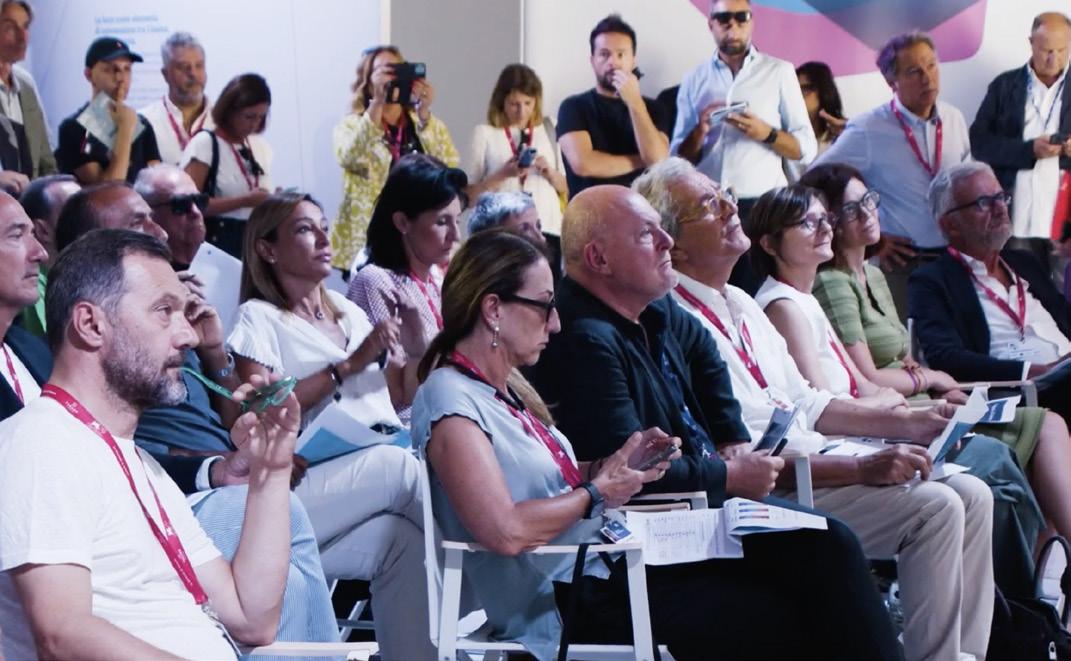
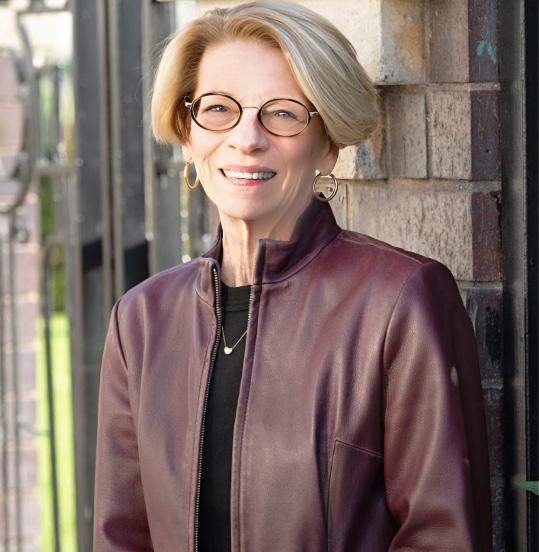
Jean M. Prewitt is President and Chief Executive Officer, before joining IFTA, Ms. Prewitt was a Principal from 1994 to 1999 at a major Washington, D.C.-based lobbying and public relations firm, representing some of the world’s most prestigious entertainment and high technology companies. She also served as a senior government official with the U.S. Department of Commerce. In this role, Ms. Prewitt represented the White House and Executive Branch on international communications and information policy. Ms. Prewitt also worked for eight years as Senior Vice President and General Counsel of United International Pictures (UIP), the foreign distribution arm of Paramount, Universal and MGM studios, implementing the initial creation of the global distribution network and managing legal and government affairs on a worldwide basis. She began her legal career at the New York firm of Donovan Leisure Newton & Irvine, where she specialized in federal tax, antitrust and copyright litigation.
The Film Verdict: There is no doubt that you have a very impressive career, which enhances your current role as President and CEO of of the Independent Film & Television Alliance (IFTA®). What are the parallels of your past positions and as CEO of IFTA?
Jean Prewitt: I’ve been fortunate in my career to have had a 360-degree tour through the international film and communications industries, with positions in the studio system, in government policy-making roles, and in law and technology firms. All of my career-stops have been at crucial moments of change within the industry – as new technology emerged, as world markets opened, and more recently the shifts between traditional and streaming distribution, and now AI. Those experiences certainly have informed my work at IFTA.
TFV: According to the IFTA website, “The Independent Film & Television Alliance (IFTA) supports, protects and
advances the global independent film and TV industry,” in general terms. How? And an example you can share with us?
JP: We support the independent industry and our Members at multiple levels. Most of our companies are small to medium size, very entrepreneurial companies. We provide the building blocks for their businesses: for example, we create
and update the IFTA Multiple International Agreements (MILA) – the standard contractual forms for documenting international distribution deals used by the industry at large. Our IFTA Collections service has collected more than $155 million in secondary royalties on behalf of the companies whose works the servicef represents. IFTA Certificates of Origin provides the documentation Members need to export their films, without expensive and time-consuming trips to consulates and notaries. More broadly, IFTA actively lobbies in the U.S. and around the world on businessdefining issues such as copyright protection and consolidation, and the removal of market barriers. And of course, we produce the American Film Market which is a cornerstone of the independent film business.
Continues next page
TFV: What are leading common challenges you see across your global membership in more than 20 countries.
JP: The Independents continue to battle to maintain strong copyright protections and prevent illegal exploitation of their works, to ensure open marketplace access throughout the channels of distribution and in every territory, and to protect the producers’ ability to assemble the rights and to manage exploitation of their works.
TFV: Although, obvious differences, there are some similarities between IFTA and the Motion Picture Association, oddly, it is the similarities which perhaps could cause conflict, what is the relationship between IFTA and MPA and have there ever been points of conflicting interests which needed to be addressed?
JP: We work very closely with the MPA on many issues in the United States and partner with them in coalitions around the world. We are closely aligned on copyright, trade, and economic development, and share common views on the
challenges ahead of the entertainment industry. Because the business models followed by the studios and independents diverge, we may diverge where market power and media consolidation are at issue.
TFV: Several high profile American independent producers have recently expressed to TFV the challenges they are facing in maintaining the Rights of thier own productions. Unlike thier European counterparts who enjoy a more Producer friendly climate, what are your thoughts on the future of American Independent Producers and how valid are their concerns and worries?
JP: For independent producers, ensuring that they can retain, control, and fully exploit their creative work is of supreme importance. Where major streamers (or broadcasters) take all rights as part of the production deal, producers are left with no library of works and no revenue flow from new exploitation opportunities. In some countries, there are emerging industry-wide negotiations to manage trade practice; in others, the competitive marketplace may provide an antidote.
Full interview, click here
The Independent Film & Television Alliance (IFTA®), the global trade association of independent distributors and producers of motion picture and television programming. Headquartered in Los Angeles, the organization represents and provides significant entertainment industry services to Member companies from more than 20 countries, consisting of independent film and TV production and distribution companies and sales agents -- those companies that operate without the benefit of a wholly-controlled global distribution network, thus relying upon licenses to local distributors for the financing and exploitation of their productions.
Since Prewitt, appointment as president and CEO, in April 2000, IFTA and the services it provides to its members have dramatically evolved. Its most visible service continues to be the annual American Film Market (AFM) in Santa Monica, which has grown to be the world’s largest film market. Markets, in contrast to festivals, focus on the conclusion of financing and licensing deals to place films and programs into theatrical, television and digital distribution around the world. Each year, AFM hosts more than 7,000 industry leaders from 80 countries for a week of deal-making, 400 screenings, networking and the industry’s preeminent conference series AFM 2023 will return to Santa Monica October 31 – November 5 allowing the global industry to immerse themselves for five days dedicated to deal making, discovery, education, and reconnecting.
Full article, click here

In this scene, halfway through La Dolce Vita, writer Marcello Rubini (Marcello Mastroianni) sits in a beachside bar writing. He is distracted by a young waitress who says she wants to be a typist in Rome.
The film is directed and co-written (with Ennio Flaiano, Tullio Pinelli and Brunello Rondi) by Federico Fellini. The film stars Marcello Mastroianni as Marcello Rubini, a tabloid journalist who, over seven days and nights, journeys through the “sweet life” of Rome in a fruitless search for love and happiness.
Most of the film was shot at the Cinecittà Studios in Rome. Set designer Piero Gherardi created over eighty locations, including the Via Veneto, the dome of Saint Peter’s with the staircase leading up to it, and various nightclubs However, other sequences were shot on location such as this one and the party at the aristocrats’ castle filmed in the real Bassano di Sutri palace north of Rome
Released in Italy on 5 February 1960, La Dolce Vita was both a critical success and worldwide commercial hit, despite censorship in some regions. It won the Palme d’Or at the 1960 Cannes Film Festival and the Academy Award for Best Costumes.It was nominated for three more Oscars, including Best Director for Federico Fellini, and Best Original Screenplay. Its success proved a watershed moment for Italian cinema and European cinema-at-large, and it has come to be regarded as a masterpiece of Italian cinema and one of the greatest films of all time.
In 2008, the film was included on the Italian Ministry of Cultural Heritage ’s 100 Italian films to be saved, a list of 100 films that “have changed the collective memory of the country between 1942 and 1978.”

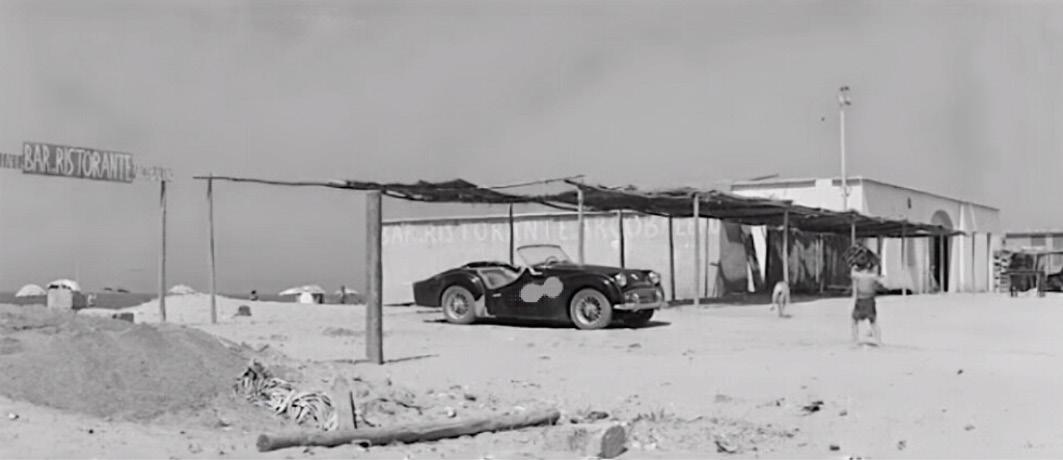

VERDICT: David Attenborough and Neil Gaiman are two of the star players in this year’s Venice Immersive lineup.

Max Borg, September 4, 2023
Every year, in addition to its conventional selection of motion pictures, the Venice Film Festival also provides an overview of what’s going on in the world of virtual and augmented reality, via the programming of the Venice Immersive sidebar (formerly Venice VR).
Situated on the Lazzaretto Vecchio island, a two-minute boat ride from the Lido, the selection consists of a main competition, a “Best Of” pro-
Continues next page
VERDICT: The gilded cage that was Priscilla Presley’s life with Elvis makes a perfect match for Sofia Coppola’s empathetic vision.
Alonso Duralde, September 4, 2023

In the same way that Elvis Presley’s flash, charisma, bombast, and vulgar excess made him the perfect subject for Baz Luhrmann, the life of his wife Priscilla — who left her father’s home
as a teenager and went directly into the gilded cage of Graceland — ideally matches the aesthetic of Sofia Coppola who, over the course of her career, has brought an empathetic eye to the lives of ensconced women.
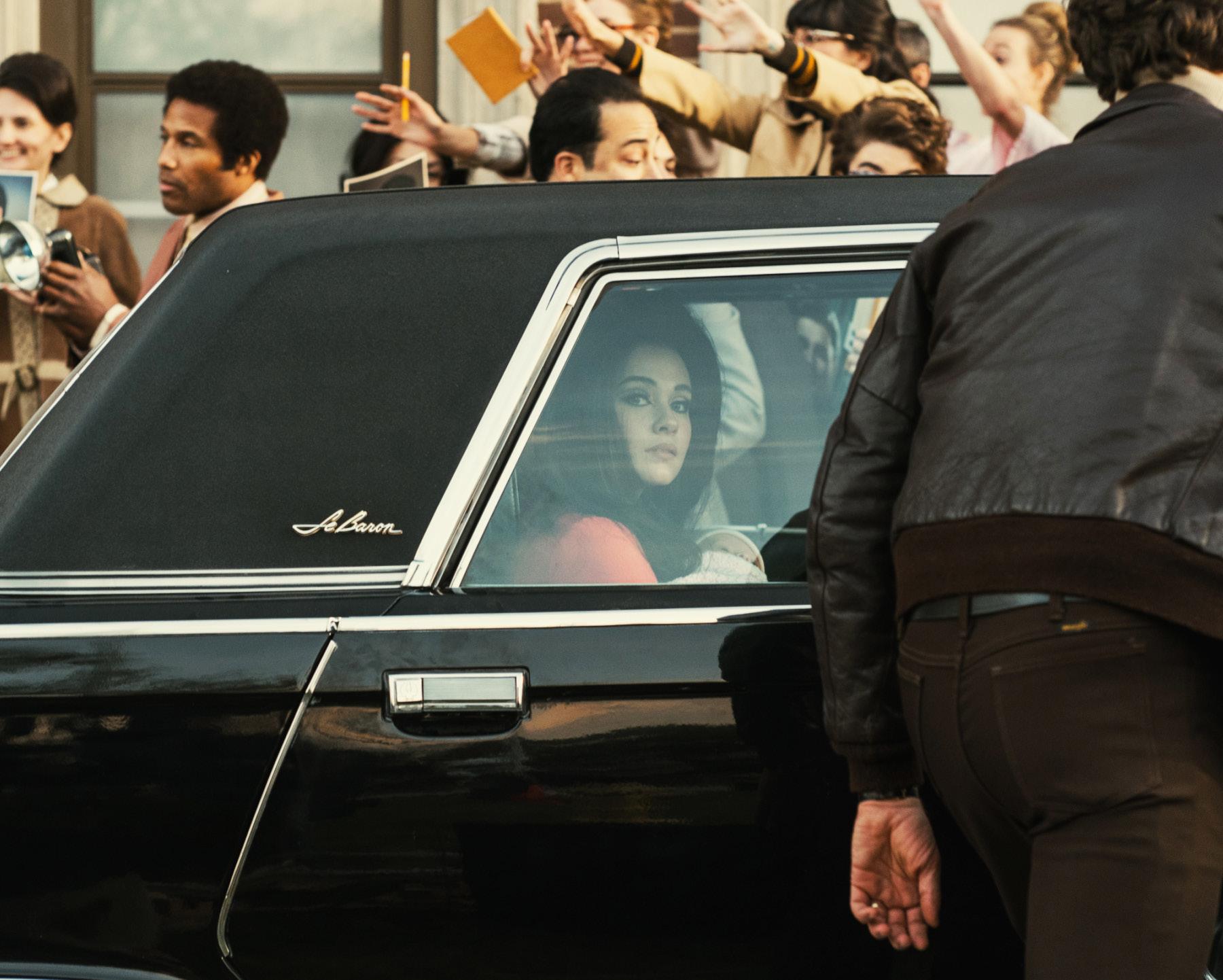
From her first major screen credit (co-writer of Francis Coppola’s Life Without Zoe, about a young girl living a very Eloise-like existence within the confines
Full review, click here

VERDICT: Starkly opposing views of nature collide in Ryusuke Hamaguchi’s ‘Evil Does Not Exist’ which, despite its portentous title, is simplicity itself and in a minor key after ‘Drive My Car’.

Deborah Young, September 4, 2023
After the narrative brilliance and moral complexity of Drive My Car, winner of the Academy Award for best international feature film in 2022, auteur Ryusuke Hamaguchi takes a step back to admire the landscape of his native Japan in an apparently simple story about environmental conservation and humankind’s relationship to nature.
Evil Does Not Exist (Aku wa Sonzai Shinai) feels something like an
interlude between big films and may disappoint or puzzle fans of his previous work with its deliberate camerawork, slow pace and ordinary characters who live close to the land in a forested area close to Tokyo. What is exceptional is that the last five minutes change everything, revealing the subtle meaning Hamaguchi has been circling around up to then, and this final scene is guaranteed to furnish lively dinner conversation as viewers try to puzzle out its ambiguities. Not to spoil the surprise, but like Drive My Car, the writer-director seems happy to let individual film-goers finish the story for themselves.
Evil was originally conceived
Full review, click here
Immersive continued from page 1
gram, and other themed offerings. And while it generally caters to a more arthouse crowd (in so far as that term applies to these installations and experiences), the 2023 lineup also has a few items with a decidedly mainstream appeal. One of these, Wallace & Gromit in ‘The Grand Getaway’, has been covered separately. The other two we’ll deal with in this dispatch.
A global icon thanks to his BBC programs and, more recently, Netflix Originals, British naturalist David Attenborough was perhaps – pardon the pun – a natural for a VR approach to his work. Conquest of the Skies, a 25-minute film directed by Lewis Ball and produced by Alchemy Immersive and Meta Quest in association with Atlantic Productions, ZOO VFX and 1.618 Digital, is a look at the evolution of flying creatures, from insects to birds via reptiles, with stunning nature footage captured up close alternating with CGI that was used to recreate more ancient species based on the most recent paleontological discoveries. All of this is conveyed, of course, in Attenborough’s authoritative yet kindly tone of voice, cementing his status as natural science’s jolly old grandpa.
Given the quality of the footage associated with his regular television and streaming work, it makes
Full Review, click here

VERDICT: William Friedkin’s final film sadly lacks the vibrancy and the claustrophobia of his previous stage-to-screen adaptations.
Alonso Duralde, September 3, 2023
While the recent obituaries for director William Friedkin largely praised his masterpieces The Exorcist and The French Connection, the filmmaker also triumphed in adapting stage material to the big screen. And rather than try to “open up” properties like The Boys in the Band or Bug, to name a few, Friedkin instead leaned into the claustrophobia, the spatially-enforced intimacy that could bring characters closer together or wear away at their sanity.
It’s disappointing to report, then, that his final film lacks the verve
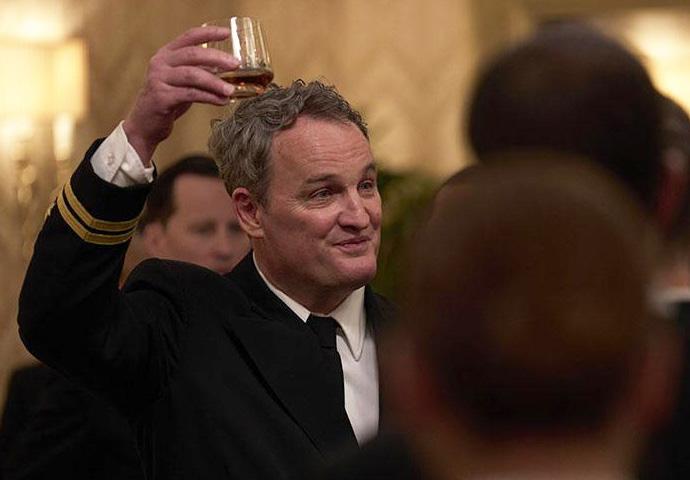
and the urgency of his other stage adaptations. The Caine Mutiny Court-Martial, based on Herman Wouk’s play, is a fairly standard people-in-a-room-talking drama that’s terminally stagebound and rarely compelling. Neither Michael Grady’s cinematography nor Darrin Navarro’s editing serves to make these proceedings any more inter-
esting than the latter half of any given Law & Order episode.
Friedkin’s one twist on the material is to update the setting from the 1940s to the present, and the results are a mixed bag: While it allows a US Navy tribunal to include women and people of color among the participants, the era
Full review, click here
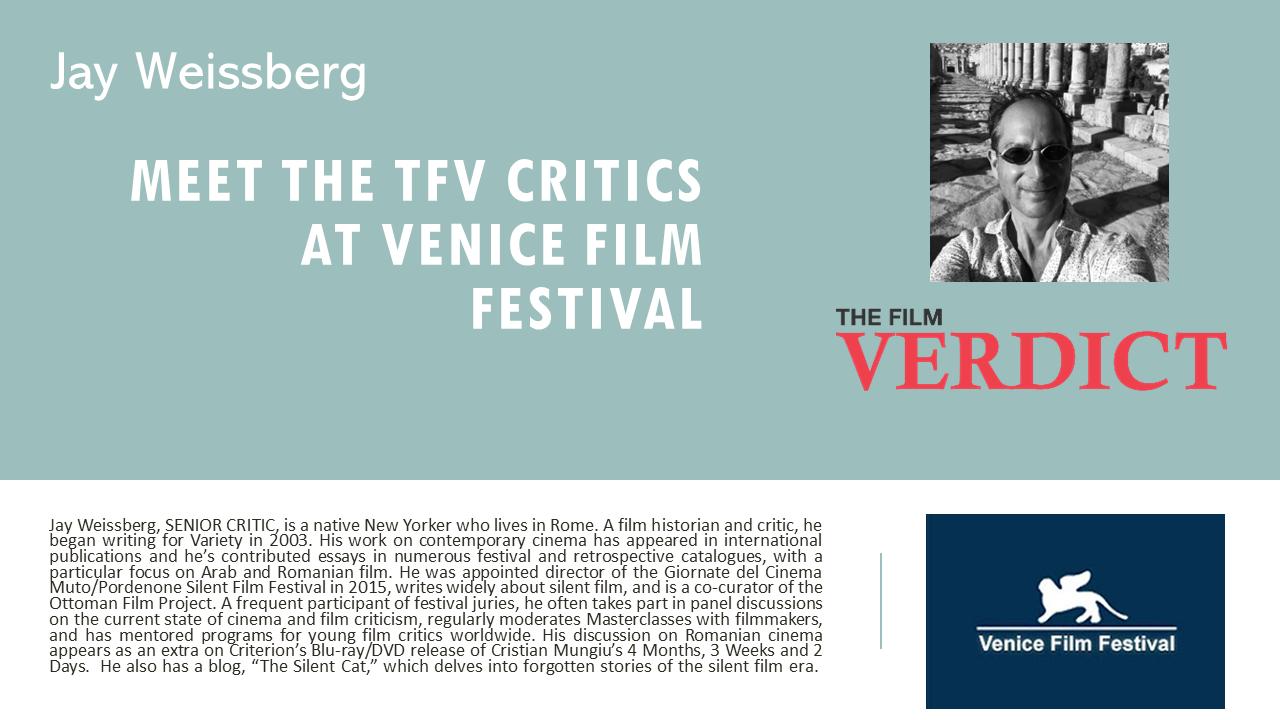
VERDICT:Selman Nacar’s second feature again examines the gray areas between the law, personal morality, duty and desire.
Boyd van Hoeij, September 4, 2023
Turkish director Selman Nacar’s second feature, Hesitation Wound (Tereddüt çizgisi), gives a clearer picture of what kind of cinema interests this young director, who graduated from law school before graduating from film school. Like his debut, Between Two Dawns, his new film again examines moral conundrums from several angles, exploring the gray areas between the law and “the right thing to do” and what people actually do. Here, the story centres on a day in the life of a public prosecutor in a provincial town, played with steely
determination by Tülin Özen (from Kaplanoglu’s Bal), who faces difficult decision in both her professional and private lives, as an important court case comes to a close and she’s afraid her client will get a lifetime sentence for something he didn’t do.
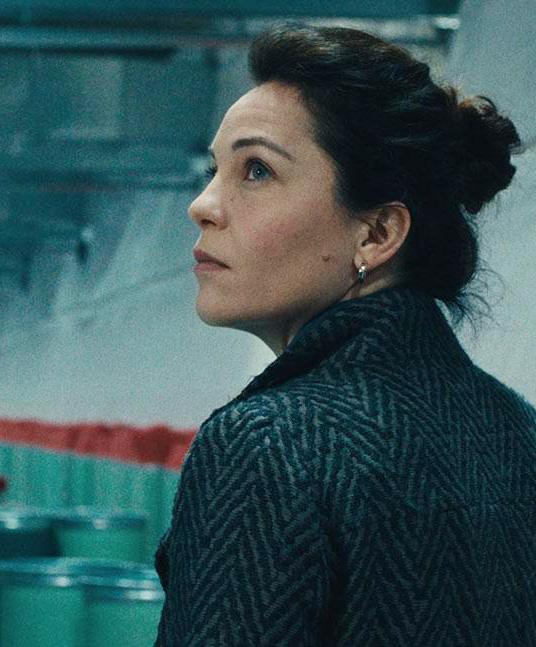

She’s being asked simultaneous-
ly to give up on her hospitalised mother, who is technically brain dead and who expressed an interest in donating her organs. Doing the right thing in either case is more complex than it might at first seem. After having Between Two Dawns premiere in San Sebastian, Hesitation Wound bowed in Venice as part of the Orizzonti lineup and is sold internationally by Magnolia. Nacar, who also wrote the screenplay solo, immediately plunges the audience into the thick of things as Canan (Tülin Özen) and her sister, Belgin (Gülçin Kültür Sahin), talk about the condition of her mother in the hospital before she speeds off to the courthouse for the closing arguments of the case of her client Musa (Ogulcan Arman Uslu), who is suspected of first-degree
Full review, click here
VERDICT: An engrossing tale of Oedipal codependence set among Rome’s drug dealers, with brilliant acting that overcomes sentimentality.

Patricia Boero, September 4, 2023
El Paraiso premieres in the Orizzonti section at the Venice Film Festival and is directed by Enrico Maria Artale, the Italian director of successful Italian TV series like Django and Romulus.

His first feature film, Il terzo tempo (The Third Half), premiered in Orizzonti in 2013, where it received the Opera Prima Premio Pasinetti. In El Paraiso, Artala creates a claustrophobic atmosphere where the

viewer feels as trapped as a hapless son, whose dominant mother controls his every move and sabotages any chance of escape.
As in Joshua Marston’s Maria Full of Grace (Sundance 2004), El Paraiso reminds us how disposable the “mules” are, the people who
smuggle contraband drugs across borders in their intestinal tract. Here the mule is Ines (Maria del Rosario), a young Colombian who expels the ingested cocaine ovules once she arrives in Rome. This upsets the dysfunctional family dy-
2012
Biennale College Cinema was launched, a higher education training workshop for the development and production of micro-budget audio-visual works, and the establishment of the Venice Film Market

: Una absorbente historia de codependencia edípica ambientada entre los traficantes de droga de Roma, “El Paraíso” cuenta con brillantes actuaciones que superan el sentimentalismo.
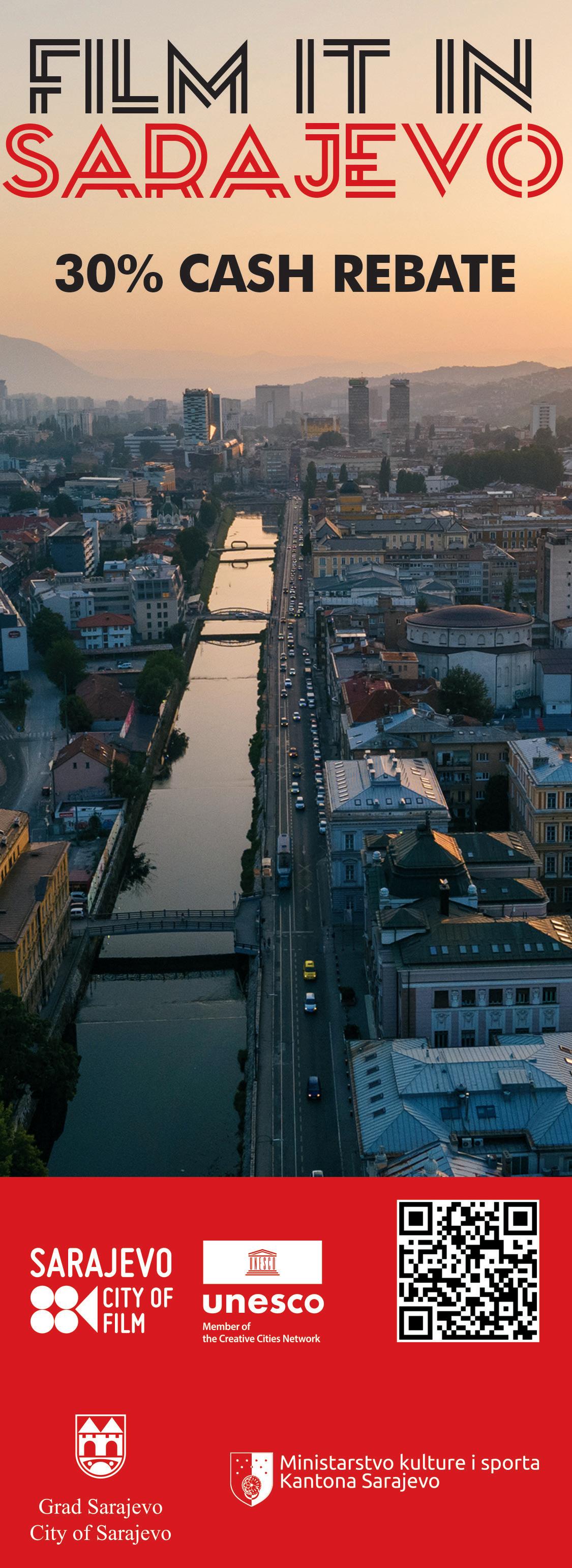
Patricia Boero, September 4, 2023
El Paraíso se estrena en la sección Orizzonti del Festival de Venecia y está dirigida por Enrico Maria Artale, director italiano de exitosas series de televisión italianas como Django y Romulus.
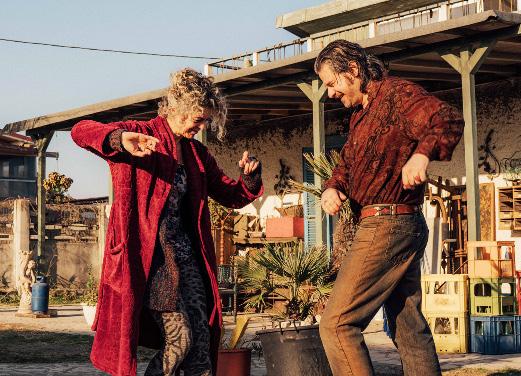
Su primer largometraje, Il terzo tempo (El tercer tiempo), se estrenó en Orizzonti en 2013, donde recibió el Premio Opera Prima Pasinetti. En El Paraíso, Artale crea una atmósfera claustrofóbica en la que el espectador se siente tan atrapado como el hijo desventurado, cuya madre dominante controla todos sus movimientos y sabotea cualquier posibilidad de escapar.
Como en María, llena eres de gracia (Sundance 2004), de Joshua Marston, El Paraíso nos recuerda lo desechables que son las “mulas”, las personas que pasan drogas de contrabando a través de las fronteras en su tracto intestinal. Aquí la mula es Inés (María del Rosario), una joven colombiana que expulsa los óvulos de cocaína ingeridos una vez llegada a Roma. Esto trastorna la dinámica familiar disfuncional, pero Artale realiza una inteligente inversión de papeles, y un hombre acaba introduciendo de contrabando las cenizas de su madre en Colombia. Podría leerse como una aguda sátira de
Full review, click here

Sony Pictures Classics acquired distribution rights to Call Me by Your Name before its premiere at the 2017 Sundance Film Festival on January 22, 2017. The film began a limited release in the United States on November 24, 2017, and went on general release on January 19, 2018. The film garnered a number of accolades, including many for its screenplay, direc-tion, acting, and music. It received four nominations at the 90th Academy Awards, including Best Picture and Best Actor for 22-year-old Chalamet (the third-youngest nominee in the category), and winning for Best Adapted Screenplay. The screenplay also won at the 23rd Critics’ Choice Awards, 71st British Academy Film Awards, and the 70th Writers Guild of America Awards.

Development of the film had begun in 2007 when producers Peter Spears and Howard Rosenman optioned the rights to Aciman’s novel. Ivory had been chosen to co-direct with Guadagnino, but stepped down in 2016. Guadagnino had joined the project as a location scout, and eventually became sole director and co-producer.
Piazza Vittorio Emamanuele IIIis the main town square in Pandino, Italy, and the site of a monument erected to commemorate the Italian soldiers from the region who did not return from battle in the 1st World War. The monument was first proposed in 1921 and the War Memorial was dedicated in 1928.
“The metaverse is nothing more than the transformation of the real world into a 3-dimensional interactive virtual world.”
Renowned for its innovation, for its 30th anniversary this year, the Oldenburg Film Festival has partnered with the MILC Platform and The Film Verdict to take its first virtual steps into the Metaverse. Users can immerse themselves in virtual Oldenburg and its rich history, attend panel discussions and discover a curated collection of films from the festival. Unveiled this September at metaverse.milc.global.
Before the Venice Film Festival began, The Film Verdict had a unique opportunity to have a quick chat with two men, who at the outset couldn’t seem more different, but yet share the same passion and vision: Hendrik Hay, founder and CEO of MILC (Welt der Wunder) and Torsten Neumann, head of the Oldenburg Film Festival.
TFV: Torsten, you head up one of the most independent film festivals dealing with edgy and new filmmakers, as well as established filmmakers from around the world, and Hendrik, you are a born, at heart entrepreneur who owned and ran televisions stations and now focuses on a vision that includes using micro-licensing utility tokens that allows content owners to have their work be accessible to a global market. The question is,
how is that the two of you are sitting down together with TFV for an interview?
Torsten: It seems like we do have a lot in common, and I would say it is mainly our love and passion for the things we’re doing that brings us together. Because it is not that common to find people who share the same ethics in their work, it feels very good to share a common goal with Hendrik, as he is a passionate man who keeps pursuing his dreams and fighting for ideas. I share those ideas. And how do we find the same idea of putting new media and edgy indie filmmaking together? Well, Hendrik’s vision is not designed to marginalize the old media, but only to introduce something that can put things back in balance - with regard to the field of interest I am dealing with, this seems to be the
most important issue: the art of cinema is threatened by the ongoing development. Artistic variety has always been the most important detail to keep art and culture alive; what happens in the film industry is actually the opposite. It feels good to have people like Hendrik out there ready to stand strong.
TFV: Hendrik, you are in many ways a visionary. Last year you produced the first Short Film Festival, ALPHA on the Metaverse, in collaboration with The Film Verdict Inc. What was the feedback and how do you measure “success” on such a new platform?
Hendrik: Thank you! The Alpha Film Festival was one of the first festivals in the Metaverse.
Continues next page

It was designed to show other festivals the possibilities of a virtual world. We were very impressed with the communication around the event. With around 450 million article impressions, we can assume that this first attempt did not go unnoticed. We were approached not only by other film festivals, such as the Oldenburg Film Festival, but also by other events. The fashion and music industries in particular are working with us on really interesting concepts.
TFV: But Torsten, by and large, you are a “film guy,” how quickly did you embrace the idea of running Metaverse, a parallel festival universe, at the same time as the Oldenburg Film Festival? And how do you think your audience and sponsors will think of it?

Torsten: Of course, every new step into an unknown territory should be considered with care. The Metaverse seems to oppose our goals to keep cinema as a real life experience where people share the same experiences at the same time. But if you look closer, this common experience loaded with emotions rather than algorithms is actually what Hendrik is working on – in a world that will go further into a digital existence, he is bringing real people and real emotions into this other world. His visions go even beyond, because this allows us to think of a new marketplace that is not ruled by only a few
corporations, and that marketplace will definitely open up for everything even if we put it right beside the real life Festival, we can show the ways of benefitting from one another instead of the opposite. I expect the sponsors to appreciate our collaboration for the same reasons. We are known for taking risks, exploring new ground and surprising our audiences, so strengthening our profile should hopefully also find the support of our partners and sponsors.
advantage for film festivals to consider developing a Metaverse based festival?

Hendrik: The metaverse is nothing more than the transformation of the real world into a 3-dimensional interactive virtual world. Yes, it is a young industry, but there is no doubt that in the future every real event will have a digital twin in the metaverse. Real events today are limited to their physical visitors; their digital twins can invite anyone in the world and expand their audience massively.
Hendrik: The Oldenburg Film Festival presents itself as an innovator. It will attract a new target group and gain importance as a brand in the metaverse scene. We have rebuilt parts of the old town of Oldenburg, as well as the old opera house where the film festival takes place. In this digital object there are a lot of interactive elements integrated on several levels that the user can click on. There is a lot of exciting content behind this. The user can also watch live events in the main hall, which are produced in Oldenburg and then streamed into the MILC Metaverse.
TFV: Hendrik, is this model that is being developed adaptable for other film festivals? Is it a possible turn-key platform for other festivals to consider? What is the
Film festivals in particular have the opportunity to move from local to global. It no longer matters where you are, only that you offer great content and interactive experiences to your audience. Yes, the metaverse is still technically a bit limited, but this will change very fast as development moves on. Those who innovate today and start to climb the learning curve will steal today’s relevance from all those who are still waiting.
TFV: Torsten, Some skeptics and critics may ask, “what’s the point or need for a Metaverse film festival” In essence, why are you collaborating with Hendrik?
If there is one man who can prove that all the concerns of those critics are pointless, I think it is Hendrik
Full Article, click here
VERDICT: Nicola Borrelli, the Director General of Cinema and Audiovisual at the Italian Ministry for Cultural Heritage and Activities and for Tourism, takes time to speak with The Film Verdict before Venice.
TheFilmVerdict, September 5, 2023
THE FILM VERDICT: Mr. Borrelli, you have an impressive career. Your name, while very important in Italy, is not a so well known outside the Italian industry, yet your work affects both Italian and international industries. What is your role as Director General of Cinema and Audiovisual at the Ministry of Culture, and how does it influence the Italian landscape directly?
NICOLA BORRELLI: Thanks for the compliments. My role as Director has evolved in line with the changes in the industry, such as the regulatory provisions that have intervened over the years at the level of governance and at
Continues next page
VERDICT: Infidelity is followed by murder in glamorous Paris in Woody Allen’s smooth-as-silk 50th film ‘Coup de Chance,’ shot entirely in French.
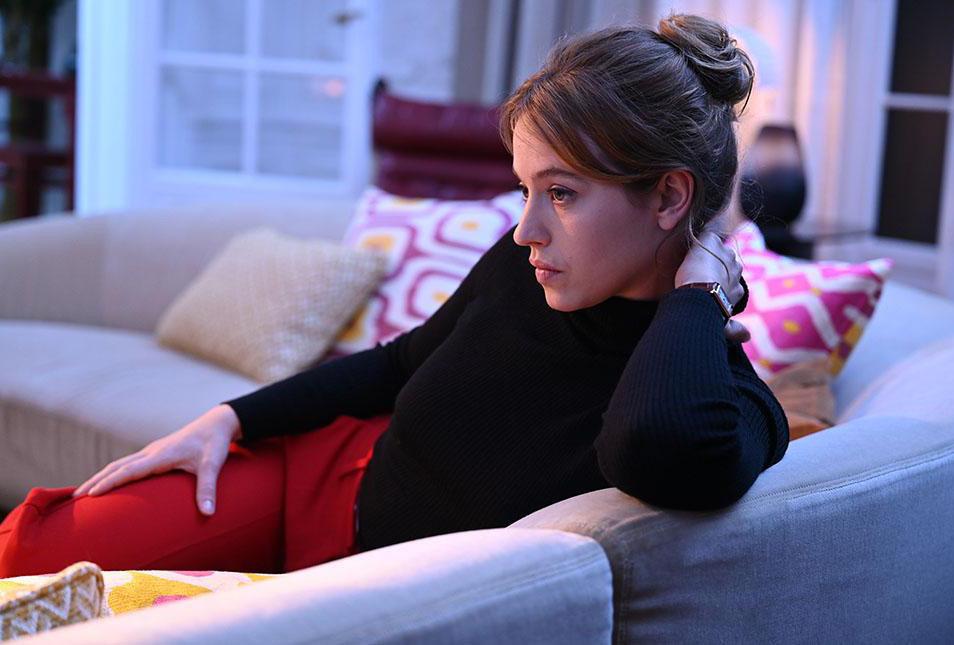
Deborah Young, September 4, 2023 Which of the beautiful Parisians in the cast will enjoy that “stroke of luck” promised in the title of Woody Allen’s milestone 50th movie, Coup de Chance?

Unfolding in the wealthier spheres of French society, the story is an elegant, enjoyable mixture of drama, comedy and romance. All told, this is one of the 87-year-old filmmaker’s bet-
ter recent efforts, though it lacks the literary punch and incisive wit of his golden period.
And although Allen is the New York director par excellence, the film actually gains something by having been shot in French, a language surprisingly in tune with the screenplay’s ironically stylized dialogue. At the Venice out of competition screening where it world
Full review, click here

Borrelli continued from page 1
the level of strategic, administrative, and organizational skills. Just think: for some years now, our Directorate has been extended to cover the audiovisual sector, along with cinema. This is partly due to the big transformation in the market; for example, the raging growth of TV series productions and of our presence
VERDICT: A withering takedown of Rome’s vapid middle class, Pietro Castellitto’s (‘The Predators’) exuberant second feature ‘Enea’ is an amusing, fast-paced game that winks at gangster movies and bows in Venice competition.
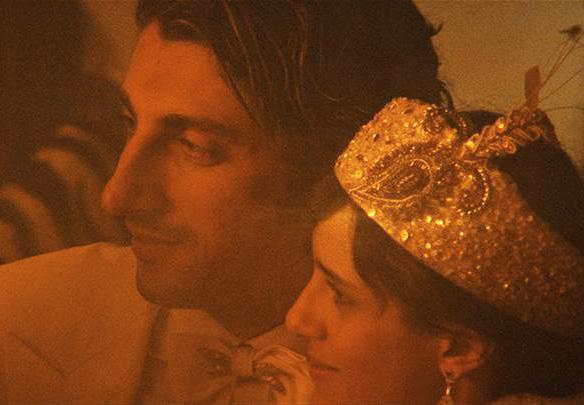
Deborah Young, September 5, 2023
Writer-director-actor Pietro Castellitto taps a rich vein of Italian social satire in his snub to the bourgeoisie Enea, revealing a unique, if somewhat chaotic, creative voice that commands attention. The finishing touches still need to be put on the narrative style, but the foundations are laid for future development.

The 30-year-old protags Enea (played by the director) and Valentino (folk singer Giorgio Quarzo Guarascio) are a hoot as daredevil rebels who scornfully trash the vacuous lives and empty souls of their well-to-do parents, while living high on their money. Their upscale search for values and the meaning of existence, at once grotesquely funny and unsettling in the reversals of class, should hit a responsive nerve in young adult audiences who like their messages in bright colors and easy metaphors. The mischievous spirit of Castellitto’s screenplay, so full of Ostland-esque paradox, was already present his first film The Predators (2020), in which a family of
abroad. This is why the cinema and audiovisual law of 2016 and the implementing decrees (updated several times) now support the entire “extended supply chain”, from short films and documentaries to series that are broadcast on TV or directly to digital, to films for theatrical release, up to video clips and video games, as well as the film theaters themselves.
My role in the department that I have the honor of chairing has grown considerably in the last
Full Interview, click here

VERDICT: Veteran Agnieszka Holland is joined by young female directors Kamila Tarabura and Katarzyna Warzecha for this blackand-white drama about refugees trying to enter the EU, which is more thematically than emotionally resonant.

Boyd van Hoeij, September 5, 2023
The complicated situation on the Polish-Belarrusian border, which is also an external EU border, is of course fascinating fodder for highstakes drama. But you wouldn’t necessarily know that from watching the 150-plus-minute Green Border (Zielona Granica), which is hindered by extremely predictable character development and a mosaic-like approach to narrative, which makes it hard to really get to know and empathise with any of the characters.
The no-doubt well-intentioned project thankfully casts a kind eye on the refugees looking for a better life elsewhere but does them a disservice by treating them as almost
interchangeable supporting characters in their own story. That said, a Venice competition slot should ensure a measure of visibility on the international circuit, plus it’s nice to see veteran Polish director Agnieszka Holland (In Darkness, Spoor) sharing directing duties with two young filmmakers, Kamila Tarabura and Katarzyna Warzecha,
who so far have only made shorts. The film is divided into numbered chapters, at least initially. The largest of these chapters consists of the opening fourty-something minutes, which look at a family of Syrian refugees and a woman from Afghanistan as they land in Belarus and are then taken to the Polish border. It’s here that things get thorny, as Polish border guards don’t want to accept these refugees, who were courted by Belarussian President Lukashenko to put pressure on the EU. So the Poles mostly try — very much illegally — to push them back into Belarus, on the other side of a long stretch of barbed wire in a forest (the “Green Border” of the title). This is the start of a horrible cat-and-mouse game with people from far away who become exhausted, wet, hungry, dirty and start to have physical ailments as they are tossed (and sometimes physically dropped or Full Review, click here
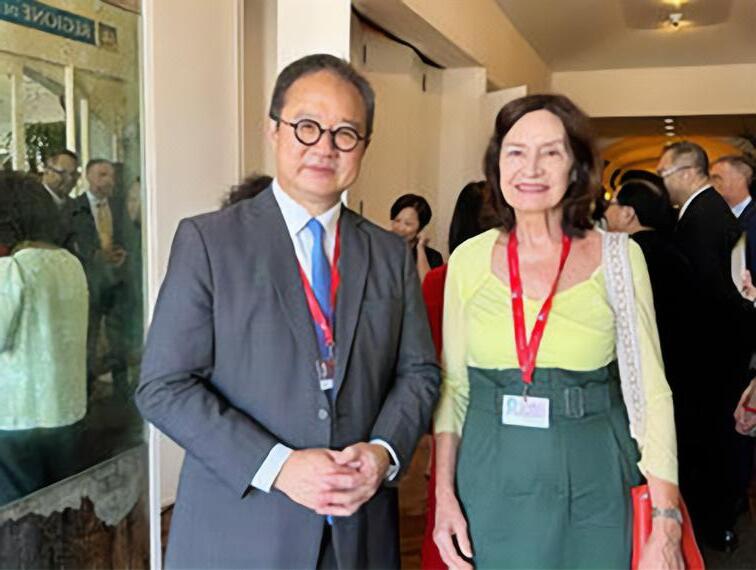

VERDICT: Directed by Hiam Abbass’s daughter Lina Soualem, this beautifully layered, quietly intelligent documentary explores her female-centric family’s experiences of dispossession and exile following the 1948 Nakba, seeking to break the silence surrounding trauma.
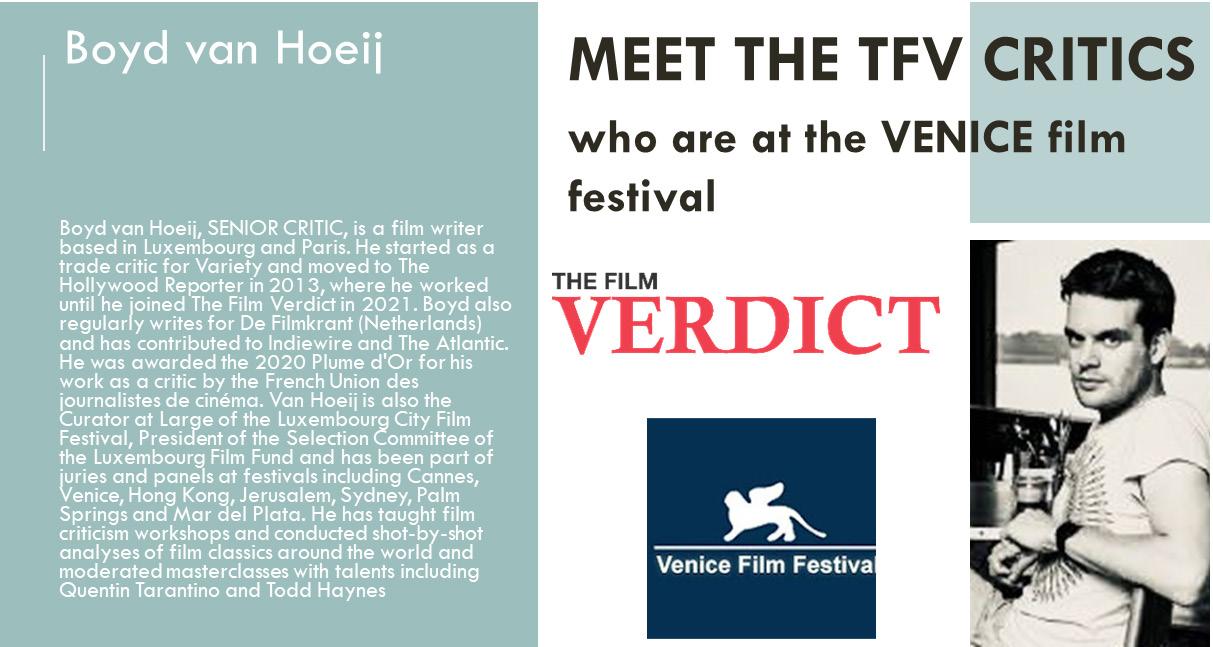
Jay Weissberg, September 5, 2023
Lina Soualem digs into her Palestinian family’s matrilineal past in her beautifully modulated, emotionally candid documentary Bye Bye Tiberias. That her mother is Hiam Abbass will be a major selling point, but the actress’ celebrity is a minor element in what’s a moving look at the Palestinian yearning for home and the catastrophic knock-on effect of the Nakba, when Israel dispossessed hundreds of thousands. Abbas grew up with stories of loss, and although she eventually left for France in a bid to distance herself from the trauma, she and her
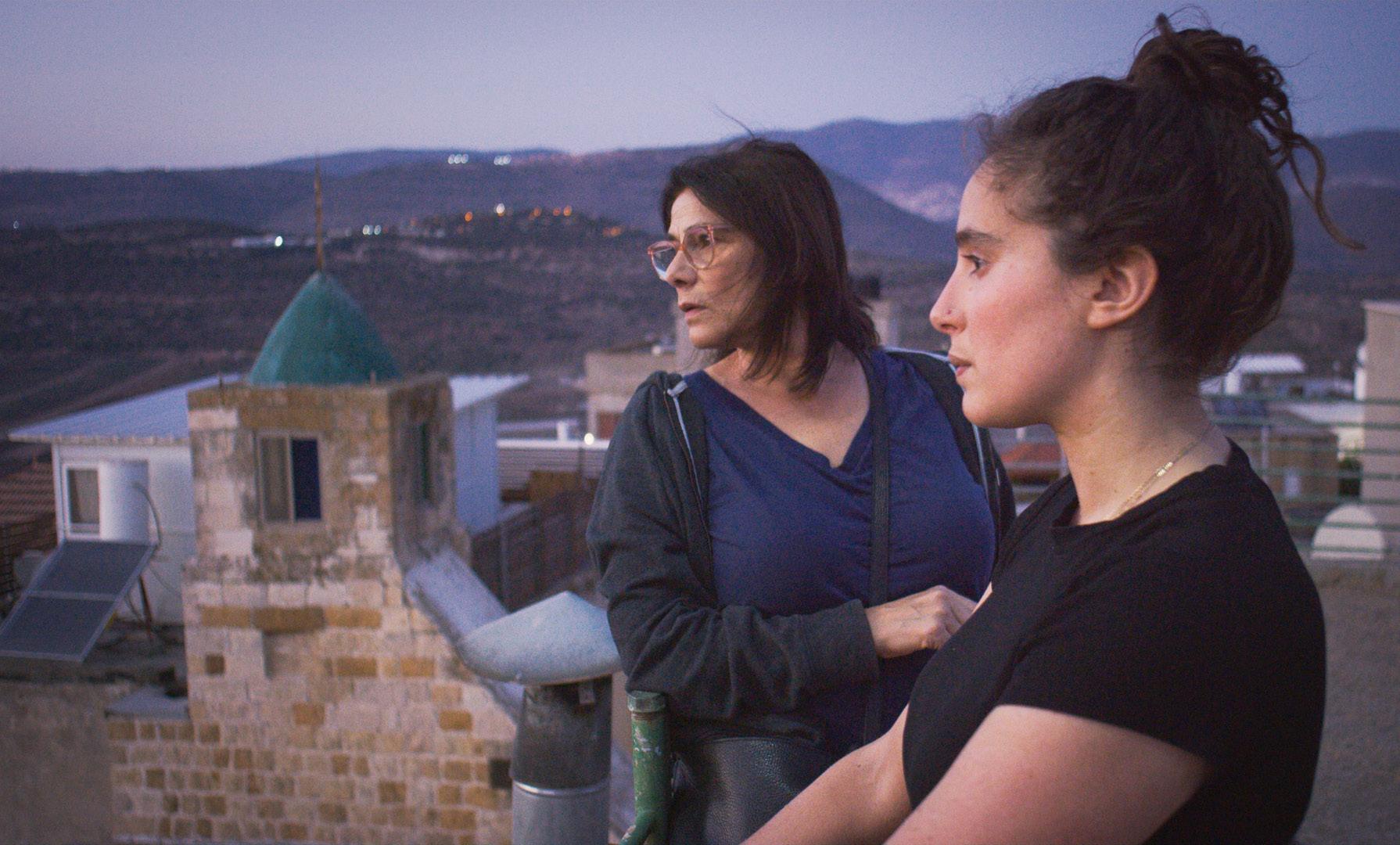
daughter came to realize escape is impossible. “Don’t open the gate to past sorrows” was the family motto, but hiding them doesn’t reduce the cancer, and Soualem’s respectful yet probing exploration highlights the melancholic residue of memory that connects women down the generational divide. Festivals, showcases and streaming sites will get considerable traction from this quietly intelligent film.
Soualem (Their Algeria) cleverly
opens and closes with her mother, first in 1992 and then today, pointing out the geographical centrality of Galilee, from where you can see Jordan, Lebanon and Syria, countries that received huge numbers of refugees and yet never made them feel welcome. Abbass was born in Deir Hana, close to where her ancestors are from on Lake Tiberias (sometimes called the Sea of Galilee), hearing her mother
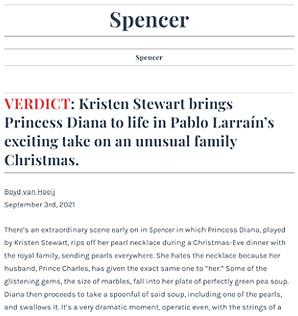
VERDICT: An alienated young man becomes obsessed with his late father’s extra-terrestrial origins in Moin Hussain’s underpowered but appealingly strange inner-space odysssey.
Stephen Dalton, September 5, 2023
A newly bereaved young man has a close encounter of the paranormal kind in Sky Peals, the appealingly odd debut feature from British writer-director Moin Hussain. Riffing on ideas of fractured cultural identity and estranged families, Hussain’s bold hybrid blend of science fiction, social realism and ghost story has an autobiographical subtext, its plot partly inspired by the death of the director’s Pakistani grandfather. This is a commendably ambitious first film,

2019
though it ultimately promises more than it delivers, with a consistently low-voltage tone that undersells its rich hinterland of Lynchian weirdness. Following its world premiere in Venice Critics’ Week, Sky Peals will next screen at the BFI London Film Festival in October.
Although Sky Peals was filmed in various locations around the northern English county of Yorkshire, the story most takes place in hazy nocturnal No Man’s Land, both literally and psychologically. Adam Muhammed (Faraz Ayub) is a self-absorbed thirtysomething who works a numbing night-shift job at a fast-food diner in a 24-hour motorway services area. Glum and withdrawn, Adam seems almost catatonically alienated from events around him. His English mother Donna (Mike Leigh veteran Claire Rushbrook on reliably solid form) is selling the family house and moving away, forcing her clueless son to finally face up to adult responsibility and fly the nest. Meanwhile, Adam’s long-estranged Pakistani father Hassan (Jeff Mirza) keeps leaving him voicemails, urgently
Full review, click here
Biennele celebrates 80 years
2021
2023
The decision to include 1978 rape convicted Roman Polanski’s film An Officer and A Spy was met with outrage.
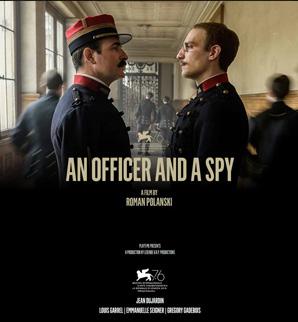
The Film Verdict is launched at the Venice Film Festival to make up for the declining international industry reviews.
This year marks the 80th Anniversary Edition and we celebrate its rich and varied history

VERDICT: Unspoken traumas are made manifest in the beautifully drawn and profoundly moving animated allegory, In the Shadow of the Cypress.
Ben Nicholson, September 5, 2023
Shirin Sohani and Hossein Molayemi’s delicately wrought animation, In the Shadow of the Cypress, depicts a difficult familial relationship.

A father and daughter live in a small house by the ocean, physically and emotionally isolated – from the outside world and one another. The father is a former sea captain who suffers from post-traumatic stress disorder that comes crashing unbidden into their humble home in irresistible waves. When one day a whale is beached right outside their door, the duo is forced to confront the enormity of what ails their lives. Combining a bruising psychological realism with some wonderfully employed animated flourishes that seem to manifest the emotional tumult, Sohani and Molayemi’s film is a triumph.
The film drops us directly into the
middle of an episode in which the father is lashing out violently. A window of the house already sports a historic crack that has been mended but is now shattered by something being hurled through it. His fit of anger is uncontrollable and as his daughter attempts
to calm him he throws her to the ground – this is the final straw. She decides she can no longer stay at their home, but when she goes to leave the following morning, she is faced with the whale stuck on the coastline. While she is adamant about saving the whale, her father becomes frustrated as their efforts fail, and retreats to his old, wrecked ship – a mausoleum anchored just offshore.
Given its lack of dialogue, weighty themes, and the leviathan of a metaphor at its centre, In the Shadow of the Cypress manages to be impressively understated. The work done on the depiction of the two characters is excellent, but it is in the external representations of inner conflict that the film is truly
Full review, click here
VERDICT: The inconsistencies of adolescence are the challenges of burgeoning womanhood are central to Leila Basma’s knotty and intoxicating comingof-age short.
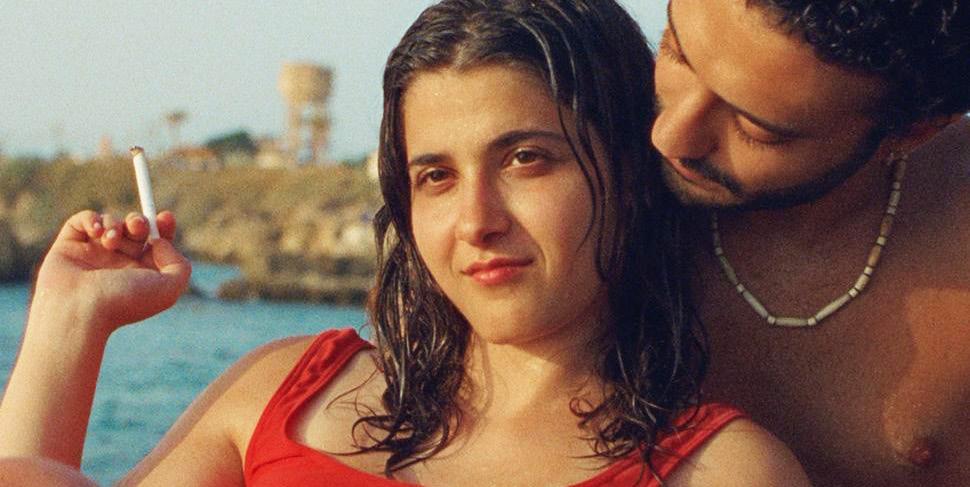
Ben Nicholson, September 5, 2023
Borderlines and forms of liminality abound in Sea Salt.
Seventeen-year-old Nayla (Nathalie Issa) seems to be approaching a multitude of crossroads in Leila Basma’s evocative portrait of late pubescence. As with all of the best films that address this period of any character’s life, the act of progressing forward – of determining the correct path – is not just beleaguered by potholes, but an entirely awkward and discomfiting endeavour.
Full review, click here
In this scene, five years into their marriage, Guido Orefice (Roberto Benigni) gives his wife Dora (Nicoletta Braschi) a ride to work on his bicycle, their 5-year-old son Giosue (Giorgio Cantarini) riding in the front basket
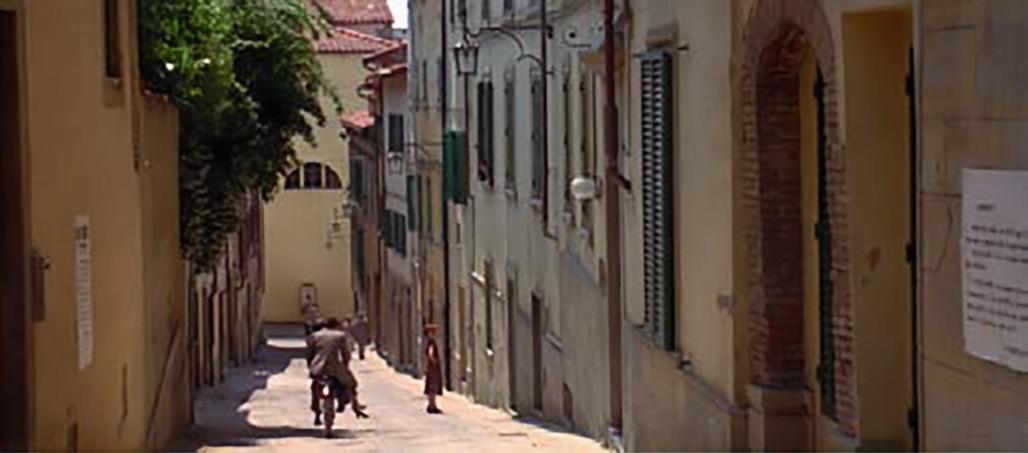
The film was an overwhelming critical and commercial success, over $230 million worldwide, including $57.6 million in the United States and one of the highest-grossing non-English language movies of all time.

The movie won the Grand Prix at the 1998 Cannes Film Festival, nine David di Donatello Awards (including Best Film), five Nastro d’Argento Awards in Italy, two European Film Awards, and three Academy Awards, including Best Foreign Language Film and BestActor for Benigni, the first for a male non-English performance. The National Board of Review included it in the top five best foreign films of 1998.
The film wasinspired by the story of Rubino Romeo Salmonì and his book In the End, I Beat Hitler, which incorporates elements of irony and black comedy. Director Roberto Benigni, who is gentile consulted with the Center for Documentation of Contemporary Judaism, based in Milan, throughout production
Via Aurelio Saff is a short sloping street near the Abbey of Saints Flora e Lucilla, a Medieval abbey in Arezzo, Tuscany. Construction of the church began in 1278 and by 1315, the adjacent monastery was built, but the church was rebuilt starting in 1565 under the designs of Giorgio Vasari. The work was compeleted in 1650 when the bell tower and presbytery were finished. The film was shot in the centro storico (historic centre) of Arezzo, Tuscany. The scene where Benigni falls off a bicycle and lands on Nicoletta Braschi was shot in front of Badia delle Sante Flora e Lucilla in Arezzo


VERDICT: Various installations in the Venice Immersive put their own stamp on the 360-degree viewing experience.

Max Borg, September 6, 2023
As one might expect, the Venice Immersive selection places a lot of emphasis on the 360-degree experience, whether it be an interactive game or a more conventional, passive role for the spectator. So, for our final Immersive dispatch of the festival, this writer decided to do a roundup of the more interesting variations on that theme: three in the main competition and one in the Biennale College Cinema VR out-of-competition strand.
Continues next page
VERDICT: Ava DuVernay’s “Origin” is a highly ambitious attempt to fictionalize Isabel Wilkerson’s theory on the centrality of caste rather than race in determining discriminatory hierarchies, playing to the director’s strengths in terms of depicting personal relationships but also her weaknesses in several overly didactic sequences that treat characters and audiences like ignoramuses.
Jay Weissberg, September 6, 2023
Just look at the list of foundations and individuals who’ve put money into Ava DuVernay’s didactic explanation of caste versus racism: Melinda French Gates, the Ford Foundation, the MacArthur Foundation, Laurene Powell Jobs, Agnes Gund…. It’s a rollcall of individuals and organizations worthily put-

ting their dough into equitable society projects, so it makes sense they’d help to bankroll Origin given that DuVernay has become cinema’s popular voice of social justice, tackling issues with a flair for drama aimed at mainstream audiences. Selma was a powerful look at a chapter of the civil rights

VERDICT: Richard Linklater’s farce about a phony hired killer is charming and unpredictable, but it would benefit from dropping the “based on a true story” angle.
Alonso Duralde, September 5, 2023
Given the time and effort many artists put into standing out from the crowd, it’s been fascinating to watch rising star Glen Powell turn his personal brand into “indistinct.” In Top Gun: Maverick, the joke of his character was that he
was so dry-toast unmemorable that his fighter-pilot call-sign was “Bob.” In Hit Man, which Powell co-wrote with director Richard Linklater, he plays a college professor whose bland anonymity makes him a perfect chameleon to run sting operations for the police.

Powell’s Gary Johnson is a divorced philosophy professor who leads a quiet life in New Orleans with his cats and his birds, and his proficiency with electronics scores him a side gig planting hidden mics and cameras for the NOPD. Gary’s devices catch people in the act
Full review, click here

Immersive continued from page 1
The latter was arguably the most harrowing title in the entire selection, at least based on the loglines and what we managed to see during our stay on Immersive Island: Tales of the March, directed by Stefano Casertano. Likely to be a hit -– in as much as that word applies in this context — among history buffs, the experience is divided in two: the first half is the film, a re-enactment of one of the death marches organized by the SS to move prisoners from concentration camps in Poland to Germany. Tim Stephenson voices Eithan, the protagonist, with narration based on recollections by survivors. While the march itself provides a clear focal point (at least in the early stretches of the film), the viewer is consistently capable of moving around and taking in the full breadth of the surrounding landscape, be it a street or a forest. Adding to the stark realism, the room used for the experience on Immersive Island had its floor paved with gravel.
Once the main segment is over, the 360-degree setting is occupied by various stills, and by clicking on them with the controller we can hear additional testimonies, providing a more complete picture of an atrocity – the last act of the Holocaust – that involved some 700,000 prisoners of the
VERDICT: Director Matteo Garrone steps back from the edginess of stylized crime dramas and horror fantasies to recount the no less cruel and shocking journey made by two Senegalese teens to Europe.
Deborah Young, September 6, 2023
Films about refugees and immigrants have become a sadly prolific subgenre of world cinema in these last decades of mass migration due to wars, terrorism and endemic poverty. How can the horrors faced by Africans who choose to make the journey to Europe be told on film, after the surfeit of news reporting that has, if anything, dulled the audience’s natural emotional response to fellow human beings in mortal peril?


In Me Captain (Io Capitano), acclaimed Italian director Matteo Garrone returns to his roots to dramatize the most classic of adventure stories – two friends who embark on a terrifying odyssey from Dakar to Sicily – in a sort of coming-of-age tale seen through
their eyes. Their motivation might be judged flimsy by some: they are aspiring young musicians who dream of becoming stars and signing autographs in Europe, and they are willing to leave the families they love to follow an illusion. But the sincerity of the two main characters, Seydou (played by the innocent-faced, open-hearted Seydou Sarr) and his marginally more practical cousin Moussa (Moustapha Fall), soon creates a bond of empathy with the audience, making their ordeal very hard to watch indeed.
It is one of the first fiction films to visualize how people cross the Sahara desert on foot and the dangers they face at the hands of unscrupulous human traffickers and armed militia groups, who extract money through graphically depicted torture scenes in ancient “detention centers” in the Libyan desert. Premiering in Venice, this is certainly one of the most impactful Italian films in competition, where a prize would help the Italian-Belgian-French co-prod to find general audiences after the festival hubbub is over.

VERDICT: Rural herders, urbanite journalists and a young monk consider the fate of a captured, livestock-ravaging wild animal in “Snow Leopard”, an affective, nuanced and multilayered film bowing out of competition at Venice four months after the death of its Tibetan director Pema Tseden.
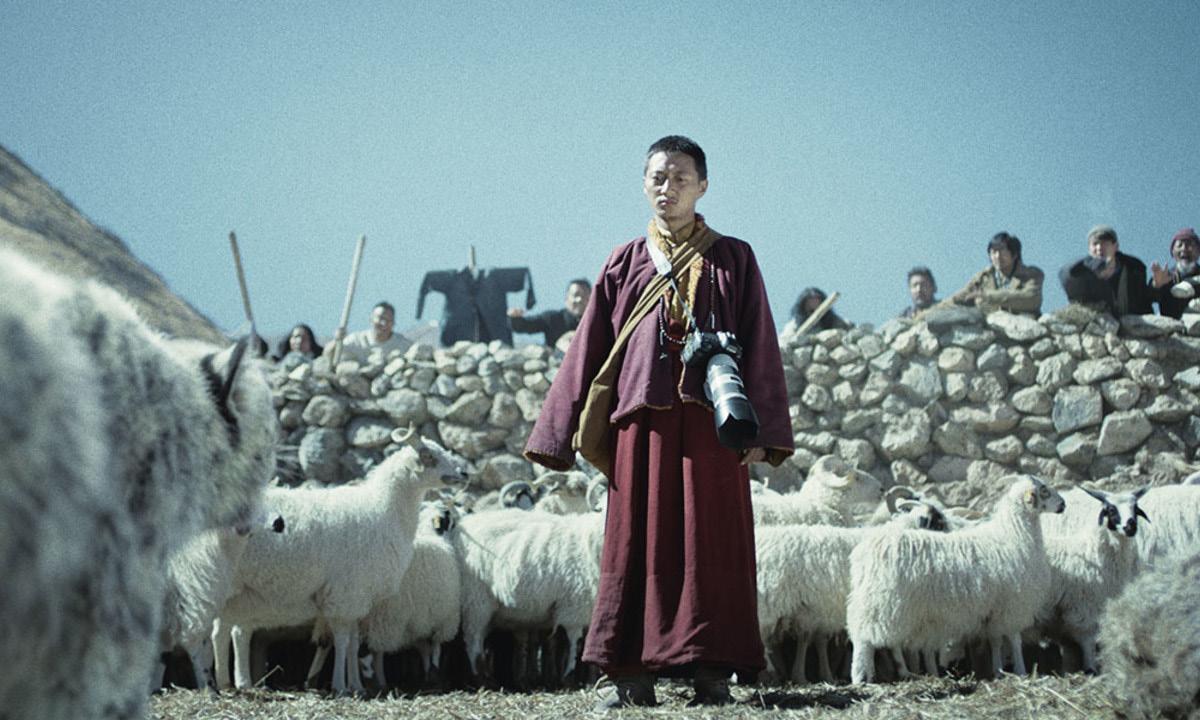
Clarence Tsui, September 6, 2023
Pema Tseden’s Snow Leopard (Xue bao) is at once a gritty social-realist drama about the economic hardship among livestock herders in China’s rural hinterlands, a CGI-laden fantasy about karma and spiritual enlightenment, and a very subtle allegory about a beleaguered community’s troubled co-existence with disruptive outsiders.
The multi-layered and ceaselessly vociferous Snow Leopard is a powerful reminder of the recently
deceased Tibetan filmmaker’s undimmed humanism, his ease in accommodating different visual styles to his poetic universe, and his deft representation of socio-political issues which might still be taboo for China’s rigorous censors today.
The first of two films Pema Tseden managed to finish shooting before he died of a heart attack in May, Snow Leopard is a powerful and unquestionably appropriate showcase of the filmmaker’s flair and
also his vigorously open approach in embracing different artistic influences and social perspectives. Bowing out of competition at Venice, where Pema Tseden’s three previous features also premiered, Snow Leopard is bound for broad gallops across festivals after its next stop at Toronto, and should serve as an effective entry point for the filmmaker’s new converts in potential retrospectives.
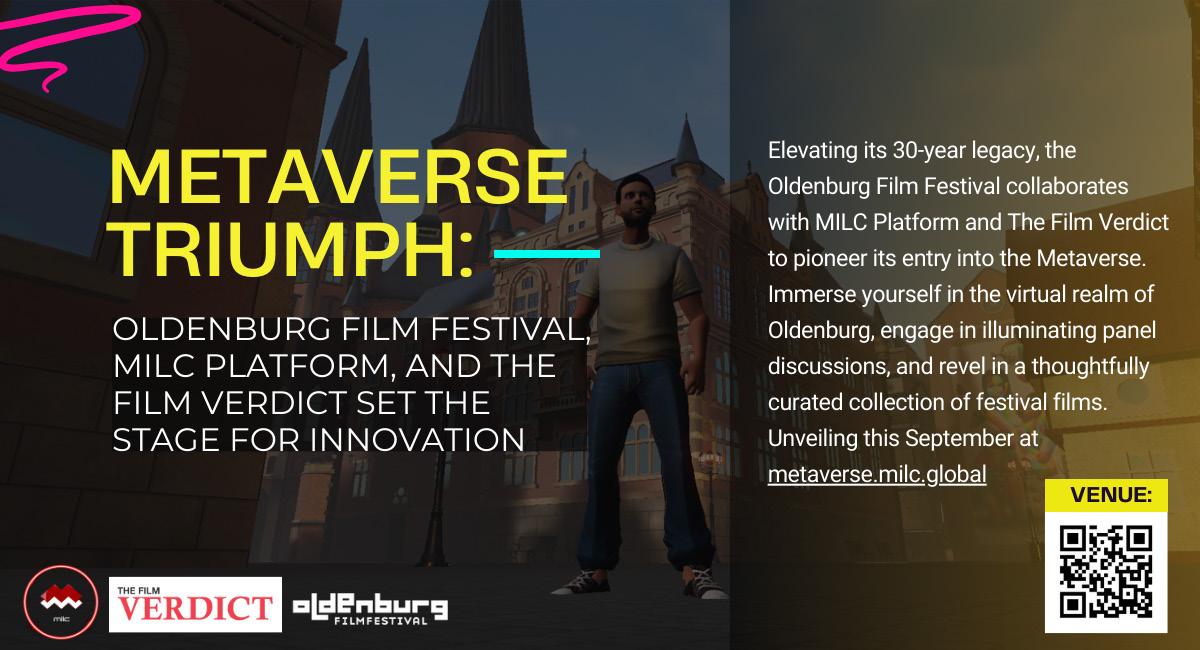
VERDICT: “Following the Sound” ticks all the boxes for nipponophiles seeking some extremely austere storytelling and swathes of slow-moving, soothing imagery set in a small, serene town in Japan.
Clarence Tsui, September 6, 2023
A young bookstore employee befriends two strangers, walks around town with her headphones on, learns to make omelettes and dabbles in art. Offering a slice of everyday life unfolding in a neat and defiantly non-descript Japanese city, Following the Sound (Kanata no uta) is a soft, soothing visual experience in which ambience reigns supreme over those oh-so-worldly matters of characterization, narrative or meaning. With his
fourth feature, Japanese filmmaker Kyoshi Sugita has delivered something akin to the cinematic equivalent of a Muji-manufactured monochrome jigsaw puzzle.
Following the Sound is the latest of a recent string of Japanese independent productions in which emotionally suppressed individuals attempt to establish some kind
of human connection with new acquaintances in a small Japanese town. Bowing at the alternative Giornate degli autori sidebar at Venice, Kyoshi Sugita’s latest film –one that is set nearly entirely within the confines of one small, single precinct in the provincial city of Ueda (population: 152,904) – joins
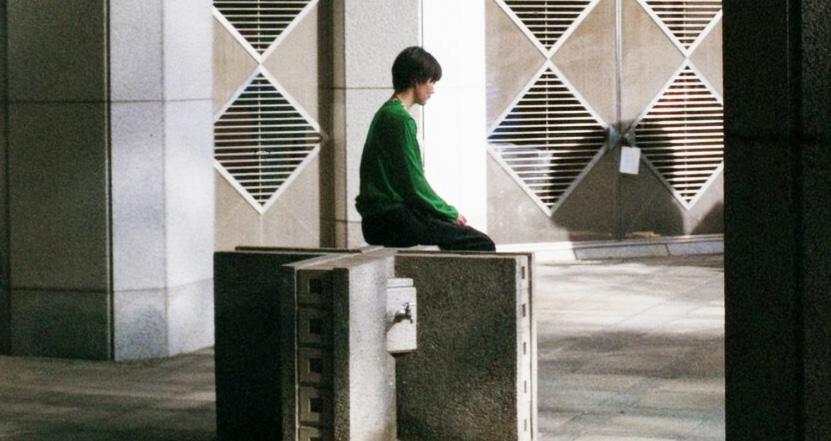
Full review, click here

VERDICT: Turkish rookie director Nehir Tuna has made a beautifully played and shot if somewhat opaquely told coming-of-age story set in a rarelyseen world.
Boyd van Hoeij, September 6, 2023
VERDICT: A fascinating but underpowered story of a family hiding a secret about one of them from the neighbours.
Boyd van Hoeij, September 6, 2023
A French family moves to a new place in a rural village in For Night Will Come (En attendant la nuit). What the villagers aren’t initially aware of is that the tenebrous and toothy teenage son of the family, Philémon, is somewhat unusual in nature. It’s not hard to guess where this is all going, of course, so Rouzet clearly didn’t want to make a mystery film. Instead, we get a deliberately paced portrait of the family dynamics in side the new family home, where the curtains remain drawn during the day, and the neighbourhood dynamics surrounding them. While the avoidance of genre trappings for as long as possible is an interesting conceit — Julia Ducournau’s Raw this is not — the final result doesn’t quite offer a full meal. That said, this Orizzonti title does suggest Rouzet is a patient and elegant observer of behaviour that’s typically human — and some that’s not.
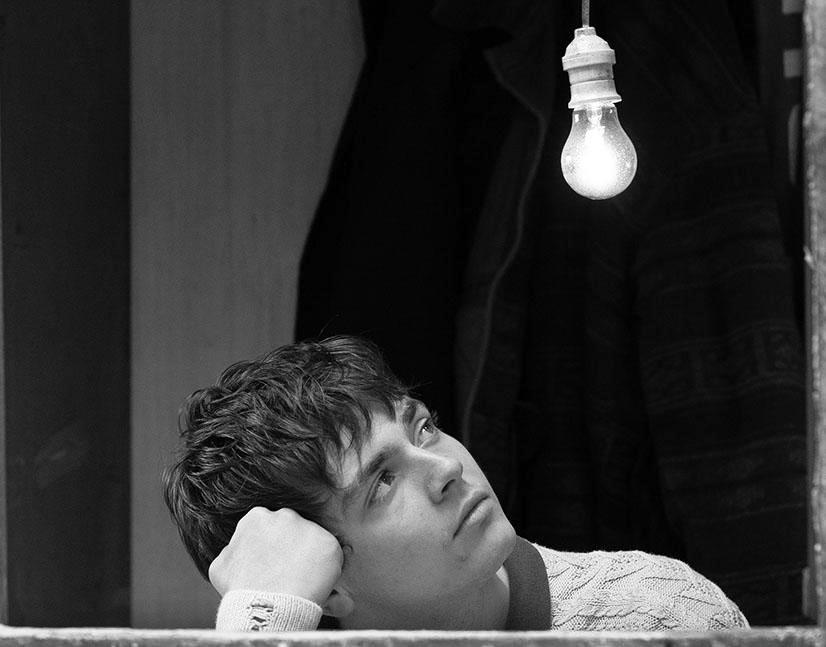
Philémon Feral — the surname can’t be a coincidence — is a pale and withdrawn teenager most of the time, someone who prefers to stick to the shadows. His mother Laurence (Elodie Bouchez, Wild Reeds) is the mothering type, doing everything she can for her brood, even when she’s at work as a nurse who takes blood donations. Together with Philémon’s father (Jean-Charles Clichet) and younger sister (Laly Mercier), they form a tight family unit, a necessity, given the fact they want to hide the true nature of
An impressionable teenage boy is sent to a boarding institution for his religious upbringing but what he finds there isn’t necessarily what you might call angelic behaviour in Dormitory (Yurt), the stylish feature debut from Turkish director Nehir Tuna. Set in 1997, when tensions between secular and religious Turks were causing a lot of friction, this coming-of-age film shot mostly in crisp black-and-white explores issues that might seem black-and-white to some — religion offers a moral compass while secularism is dangerous, for example — but that instead contain more complex and fascinating gray areas.
Though perhaps a little too opaque in its relationship details, this visually potent and strongly acted debut nonetheless offers proof of arresting filmmaking skills, making Tuna a name to watch. Dormitory premiered in Venice in the Orizzonti section.
Ahmet (relative newcomer Doga Karakas) is 14 years old when he’s sent to a yurt, or Islamic dormitory, where he receives part of his religious education and has to sleep at night with the other boys. But most of them aren’t exactly angels. This fascinating paradox could either suggest that the boys are in dire need

The Film Verdict sat recently with Roberto Stabile, advisor for international relations and head of special projects at DGC A-MiC/Cinecittà, to discuss business in Venice and the Italian ilm industry’s plans with China.
By Liza ForemanThe Hotel Excelsior Venice Lido has long been a focal point for delegates and stars gathered for the annual Venice International Film Festival.
For the 80th edition of the festival this week, the beach hotel which houses both the Venice Production Bridge film market and the Italian Pavilion was less about glitz, and more about business, with the Lido’s star turnout impacted by the ongoing Hollywood strikes.
Inside the Italian Pavilion, this year’s lineup of conferences and talks was well attended. It helped create a pavilion space that Italo exec Roberto Stabile calls: “A place where the Italians must feel at home and all others must feel at home in Italy.
“What we say is that the pavilion is ‘Casa Italia’. It’s very important for us. We create the conditions to support work for our professionals. At the same time, we organize meetings with foreign delegations, and there are conferences,” he said.

Stabile and his colleagues have been in the news this week with the signing of a memorandum of cooperation with Hong Kong.
“The memo aims to help the distribution of Italian films, as well as future collaboration with the special
administrative region of China.” Stabile added: “It’s not always easy to work with China due to political, cultural and economic difficulties.”
As part of the agreement, Italy will hold an ‘Italian Screens’ exhibition this year from November 23-27 in Hong Kong.
The ‘Italian Screens’ is a global initiative that presents the best Italian films, released in the past year, with the help of its regional embassies and ambassadors to help find local distribution for its films. Italian Screens (New Italian Cinema Goes Abroad) aims to strengthen existing distribution networks and open new territories to Italian films. The Hong Kong deal is the big announcement for Italy, but a major push to promote Italy’s film industry worldwide continues, overseen by Stabile.
Italian Screens and the Italy Film Distribution Fund, which supports the distribution of Italian films overseas, are high on the list of Stabile’s priorities.
We are pushing Italian Screens,” he said. “Wherever Italy has an embassy, we organize the showing of new films, screen in cinemas, invite local distributors, and show that local people like our films.
VERDICT: A high school girl demonstrates a special gift for empathy and healing others in Belgian director Fien Troch’s mysterious, multi-layered parable about the price of doing good.
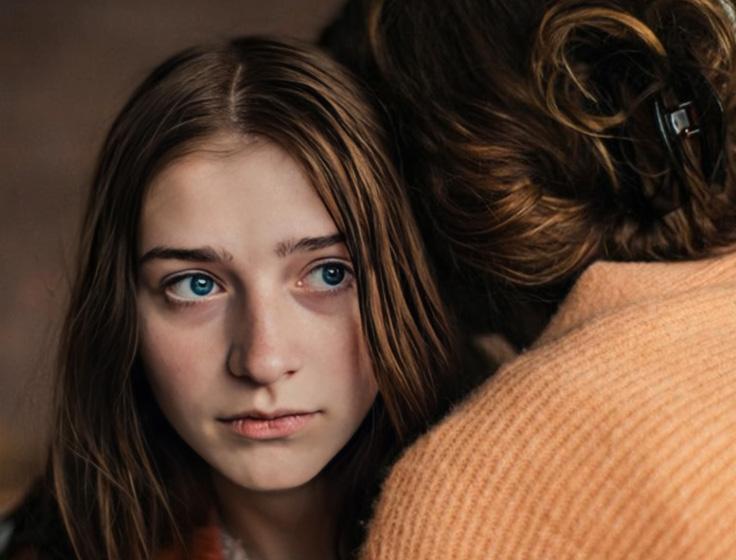
Deborah Young, September 7, 2023

A great tragedy whips through a small community at the beginning of Holly when a fire breaks out in the high school and ten students are killed. But that morning one girl seems to have a premonition and calls the school to say she won’t come, because she has a feeling that something bad is going to happen.
VERDICT: Part survival-revenge drama, part love story, Giorgio Diritti’s “Lubo” addresses the Swiss state’s forcible removal of Jenisch children from their families beginning in the 1930s, and while Franz Rogowski’s magnetism keeps his morally complex character sympathetic, the film feels too much like a miniseries cut down to a very long feature length.
Jay Weissberg, September 7, 2023
Cinema – and the world in general – has largely overlooked the Jenisch people, a Germanic-speaking nomadic group mostly living in Switzerland, Germany and Austria who’ve been subjected to the same kind of discrimination as the Roma. Valentina Pedicini’s 2017 film Where the Shadows Fall dealt
in part with the state-sanctioned kidnapping and “re-education” of Jenisch children, but that didn’t get nearly the attention likely to accrue to Giorgio Diritti’s Lubo, in competition in Venice. It’s a story of survival in which Franz Rogowski plays the titular character, an itinerant entertainer whose personal tragedy leads him
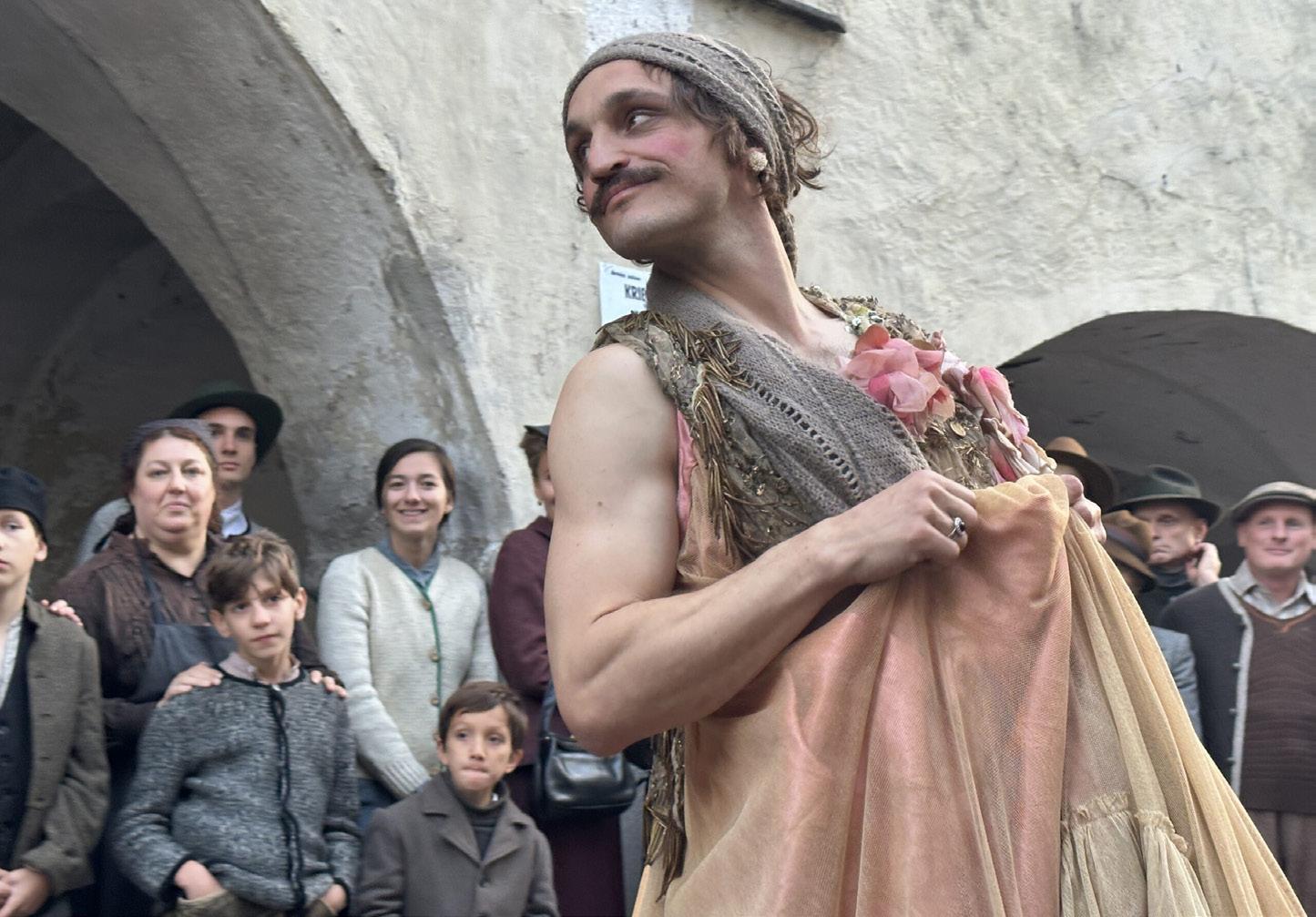
Full review, click here
From this bare premise, award-winning Belgian writer-director Fien Troch (Home, Kid, Someone Else’s Happiness) launches an intriguing explora-
Full review, click here

VERDICT: ‘On The Pulse’ is an admirable but out-of-touch portrait of the gritty work of investigative TV journalists.

Kevin Jagernauth, September 6, 2023

In an era of newsroom budgets being slashed, cable TV in free fall, and unending media consolidation, even the idea of a investigative television news team seems antiquated. So it feels somewhat nostalgic to watch Alix Delporte’s third feature Vivants (On The Pulse), which despite its desire to be au courant, nonetheless feels like a picture out of time.
In fairness, Delaporte does address the challenges of the modern newsroom early on: flagging viewership, youth engagement, and keeping audiences from flipping the channel. But the dramatic focus is still on the nitty gritty, day in and day out grindset of the front line television reporting hustle. Our guide through this insular world is Gabrielle (Alice Isaaz), who has arrived in Paris from Grenoble, with a technical institute degree under her belt, specifically to fill the open intern role on a highly regarded, close knit, investigative journalism team. She beats out a slew of other eager candidates by quickly getting
own distinct set of problems. Running under 90 minutes, Vivants feels too slight to be bafflingly credited to Delaporte and three other screenwriters. It’s clear that at some point Delaporte and Co. made a conscious decision to strictly focus the action in the office or in the field. But in leaving any kind of meaningful insight into the team’s personal lives and internal struggles behind, the characterizations suffer and remain flat.
Gabrielle arrives confident, cool-headed, and capable, and largely stays that way, never overwhelmed despite being wholly inexperienced. She’s just as comfortable in the editing suite as she is operating a camera, and every-
veteran Vincent (Roschdy Zem) on her side, who convinces Camille (Pascale Arbillot) to bring her on. From there, it’s all hands on deck. On Gabrielle’s first assignment, she jumps in the back of an ambulance and follows the team around an emergency room, as they prepare a report about the crumbling infrastructure of the public healthcare system. She’s with the crew when they follow vegan commandos as they raid a rabbit farm. By the time Damien (Vincent Elbaz) is sent on a dangerous mission to a battle zone, she’s fully part of the workplace family worrying about his safe return. But not every gig is an adrenaline rush — a fashion show is an easy layup for ratings, but as Gabrielle will learn, it brings its Full review, click here
VERDICT: The freewheeling independence of the open road is given a Gen-Z spin in the Ross Brothers’ kinetic and affecting hybrid documentary.
Ben Nicholson, September 7, 2023
There is a glorious wide-eyed openness to Bill and Turner Ross’s Gasoline Rainbow.
A tale of five teenage friends embarking on a post-high school road trip from their backwater Oregon town, it brims with the captivating allure of new horizons. Made with the Ross Brothers’ trademark disregard for the boundaries between documentary and fiction, employing the same improvisation-

al style as their recent hit Bloody Nose, Empty Pockets (2020). Here, the narrative was conceived of by the filmmakers before then being embellished in concert with their young cast. Representing the filmmakers’ bow on the Lido, the film
has its world premiere as part of Venice’s Orizzonti competition. The glamour and romance of Venice feel a long way from Wiley, Oregon. It’s the small town in which Nathaly (Nathaly Garcia), Makai
Full review, click here

VERDICT: The latest feature from filmmaker Zacharias Mavroeidis (Defunct) is queer, sexy, Greek and low budget but not quite as fun or smart as it should be.

Boyd van Hoeij, September 7, 2023
A queer filmmaker in a funk despite his pink-blue hair needs to come up with a treatment for a film that’s “fun, sexy, Greek and low budget” in Zacharias Mavroeidis’ The Summer with Carmen (To kalokairi tis Karmen).

The resulting meta film succeeds on three of those counts, which is not bad, though the film is never quite as playful as the premise promises, mainly because it needed a much punchier rhythm. That said, LGBTQ festivals and distributors will eat up any film that starts with a shot of someone scratching
VERDICT: A largely deserted port plays host to subtle drama unraveling at a glacially pace in Xandra Popescu’s strangely beguiling study in stasis.
Ben Nicholson, September 7, 2023
There are not really any sentimental stories in Sentimental Stories.
There are plot details that can arguably be recorded: a woman and her niece work in an often empty diner in the middle of a vast port; a couple apparently begins
their hairy bum on a nude beach while we are informed about the golden rules of screenwriting — never mind the fact that they then are neither obeyed nor meaningfully subverted. The Summer with Carmen (the female of the title is a literal bitch on four paws) premiered in Venice in the Giornate degli autori section.
Broad-chested and luxuriantly hirsute Demosthenes (Yorgos Tsiantoulas) is a 33-year-old for-
mer actor and current civil servant whose number one priority is men, or rather sex with said species. One summer weekend, he hangs out with his former actor and current director friend Nikitas (Andreas Lampropoulos, almost a beanpole next to Tsiantoulas’ beefy build), at a queer beach. Between bouts of bitchy comments and voyeurism, the two try to come up with a plot for a film that responds to the requirements of Nikitas’ unseen
review, click here
seem eerily absent. And yet, Xandra Popescu’s short, which screens as part of the Orizzonti competition in Venice, has an irresistibly enigmatic timbre and tempo all of its own.
the process of separation; workers in fluorescent vests idle the day away. However, if there are narrative developments, they occur in almost imperceptible increments and remain oddly devoid of emotion. Both sentiment and stories
‘Cinema of stasis’ is a term that would more typically be applied to films packed with long shots that feature little to no movement either in front of, or behind, the camera. While that description would not be inaccurate here, the stasis in Popescu’s film feels far more fundamental. The world of Sentimental Stories, which feels hermetically sealed in a similar way to the shipyard of Evi Kalogiropou-
Full review, click here
VERDICT: Firedream offers lessons of passionate honesty in work made with love. and creativity even with some shortcomings.
Lucy Virgen, September 7, 2023
“I can’t imagine why someone wouldn’t want to keep on living,” says Lucas, the teenage protagonist of Firedream (Lumbrensueno), lamenting the death of a friend. The deceased’s mother replies, “perhaps he did not want to keep on dying.” This conversation furnishes a capsule description of the very sober drama Firedream, the Mexican participant in the Biennale College Cinema section of the Venice Film Festival.
The central theme is adolescent angst, which manifests as insecurity, paranoia, boredom, but also as improbable romantic dreams and the desire to continue living. Lucas is a young man who works in a hamburger joint, he lives with his mother and his sister. He likes to take photos and make short videos with his cell phone, but he doesn’t have a strong interest in life. At work, he meets Óscar, a young man who is both realistic about job possibilities and fanciful about almost any other subject: he believes he is

Lucy Virgen, September 7, 2023
“No puedo imaginar por qué alguien no quiere seguir viviendo” dice Lucas, el adolescente protagonista de Lumbrensueño lamentando la muerte de un amigo. La madre del difunto le contesta “tal vez no quiso seguir muriendo”. Esta conversación retrata, con pocas palabras, y un drama muy sobrio Lumbrensueño, participante mexicana en la sección Biennale- College-Cinema del Festival de Cine de Venecia.
receiving cosmic messages, has multiple paranoias, and pretends that the boyfriend of the girl he likes is in reality a passing relationship. Óscar believes they have broken up. The manager of the burger joint is the typical middle manager who pressures employees with dreams of an unachievable future. Lucas’s life moves between the anarchy of Óscar, and the servile capitalism of his boss who believes that being a good employee is a reward in itself. Lucas’s mother tries to
Full review, click here
El tema central es la angustia adolescente, que se manifiesta como inseguridad, paranoia, aburrimiento, pero también con improbables sueños románticos y ganas de seguir viviendo. Lucas es un joven que trabaja en un restaurante de hamburguesas, vive con su madre y su hermana. Le gusta tomar fotos y armar pequeños videos con su celular, pero no tiene un interés fuerte en la vida. En el trabajo conoce a Óscar un joven que es a la vez realista con las posibilidades laborales y fantasioso en casi cualquier otro tema: cree recibir mensajes cósmicos, tiene múltiples paranoias y no pretende que el novio de la chica que le gusta, es una relación que ella ya terminó. El gerente de la hamburguesería, es el típico jefe intermedio que presiona a los empleados con ofertas de un futuro imposible. La vida de Lucas se mueve entre
Full review, click here

: Mujeres en prisiones chilenas retratan la maternidad y el crudo dolor de la separación en este empático e impresionista documental de Tana Gilbert filmado con teléfonos celulares.
Carmen Gray, September 7, 2023
En Malqueridas, su primer largometraje impulsado por el activismo, emocionalmente crudo y conmovedor, proyectado en la Semana de la Crítica del Festival de Cine de Venecia, la documentalista Tana Gilbert captura la maternidad dentro de las prisiones chilenas.
VERDICT:Women in Chilean prisons record motherhood and the raw pain of separation in Tana Gilbert’s empathetic and impressionistic, mobile-shot doc of solidarity.
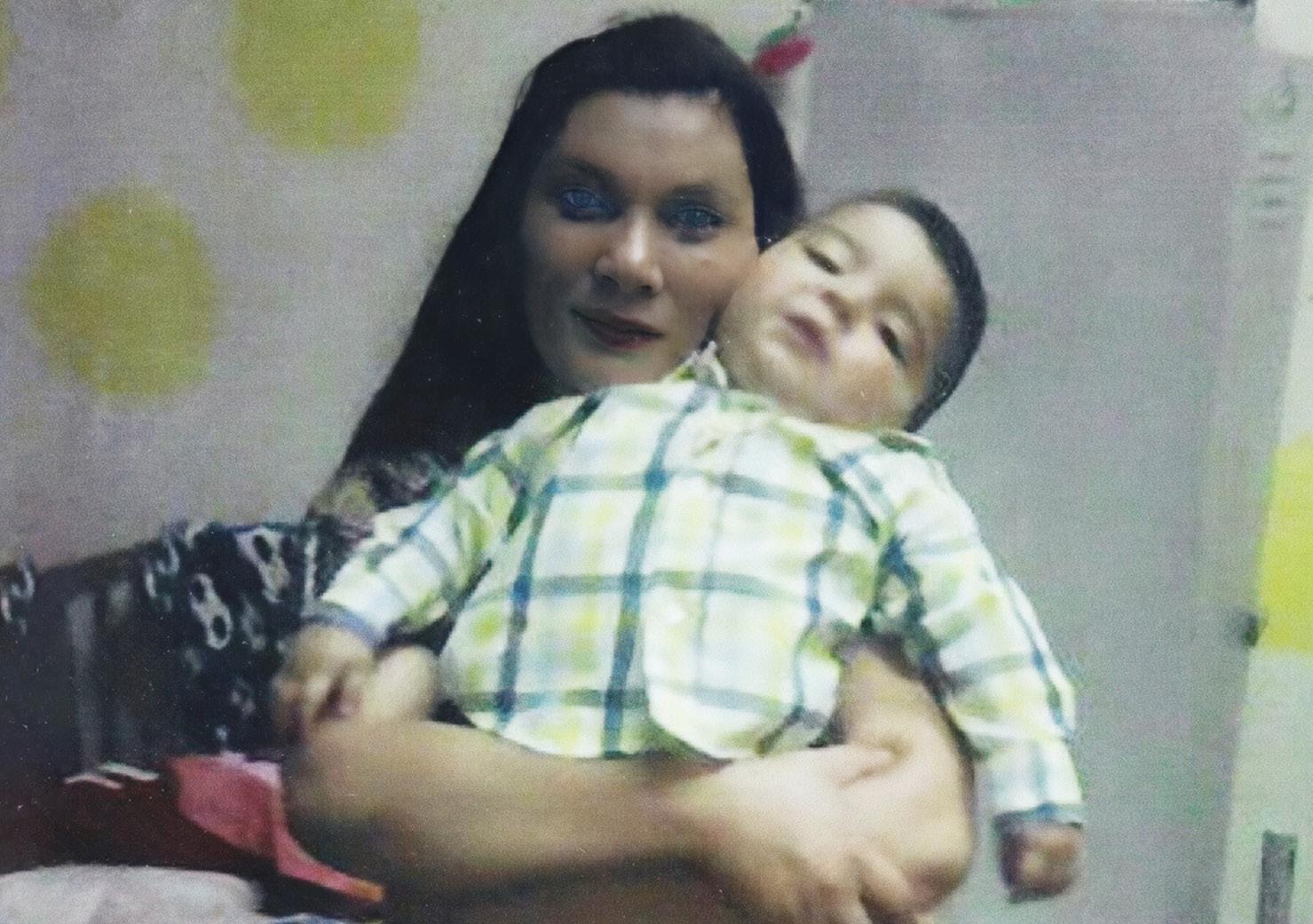

Carmen Gray, September 7, 2023
In her emotionally raw and affecting, activism-driven feature debut Malqueridas, screening in the Critics’ Week line-up of the Venice Film Festival, documentarian Tana Gilbert captures what motherhood is like inside Chilean prisons.
Digital recording in Chile’s prisons is a clandestine activity. It is officially forbidden by the rules and able to impact privileges if detected, but common nonetheless, and not a crime. The ease with which images can now be taken on a mobile phone, with the shrinking size and democratisation of digital tech, has enabled Gilbert to collate a view of this world that is more intimate, and prisoner-led, than what is usually depicted in movies about jail life. It also stands apart from the deluge of contemporary films about our always-online social media reality. The most poignant frame through which to consider the mobile-shot imagery in Malqueridas is the family photo — because these furtive snaps are one of the few ways a woman doing time can shore up memories and continue connection with their child.
Gilbert has woven together images taken by more than twenty women serving time in prison, and their testimonies. These have been reconstructed into one composite experience, voiced by Karina (former
Full review, click here
Las grabaciones digitales en las cárceles chilenas son una actividad clandestina , oficialmente prohibida por reglamento y un motivo para afectar privilegios si se detecta, pero común de todos modos, pero no un delito. La facilidad con la que hoy se pueden grabar imágenes en un teléfono móvil, su disminuciòn de tamaño y la democratización de la tecnología digital, le ha permitido a la directora recopilar una visión de este mundo mucho más íntima y conducida por prisioneras del que es generalmente representado en el cine sobre la vida en prisión. También se distingue del diluvio de películas contemporáneas sobre nuestra realidad de redes sociales siempre en línea. El marco más conmovedor a través del cual considerar las imágenes digitales en Malqueridas es la foto familiar, porque estas instantáneas furtivas son una de las pocas formas en que una mujer que cumple condena puede anclar sus recuerdos y tener una conexión continua con su hijo.
Full review, click here
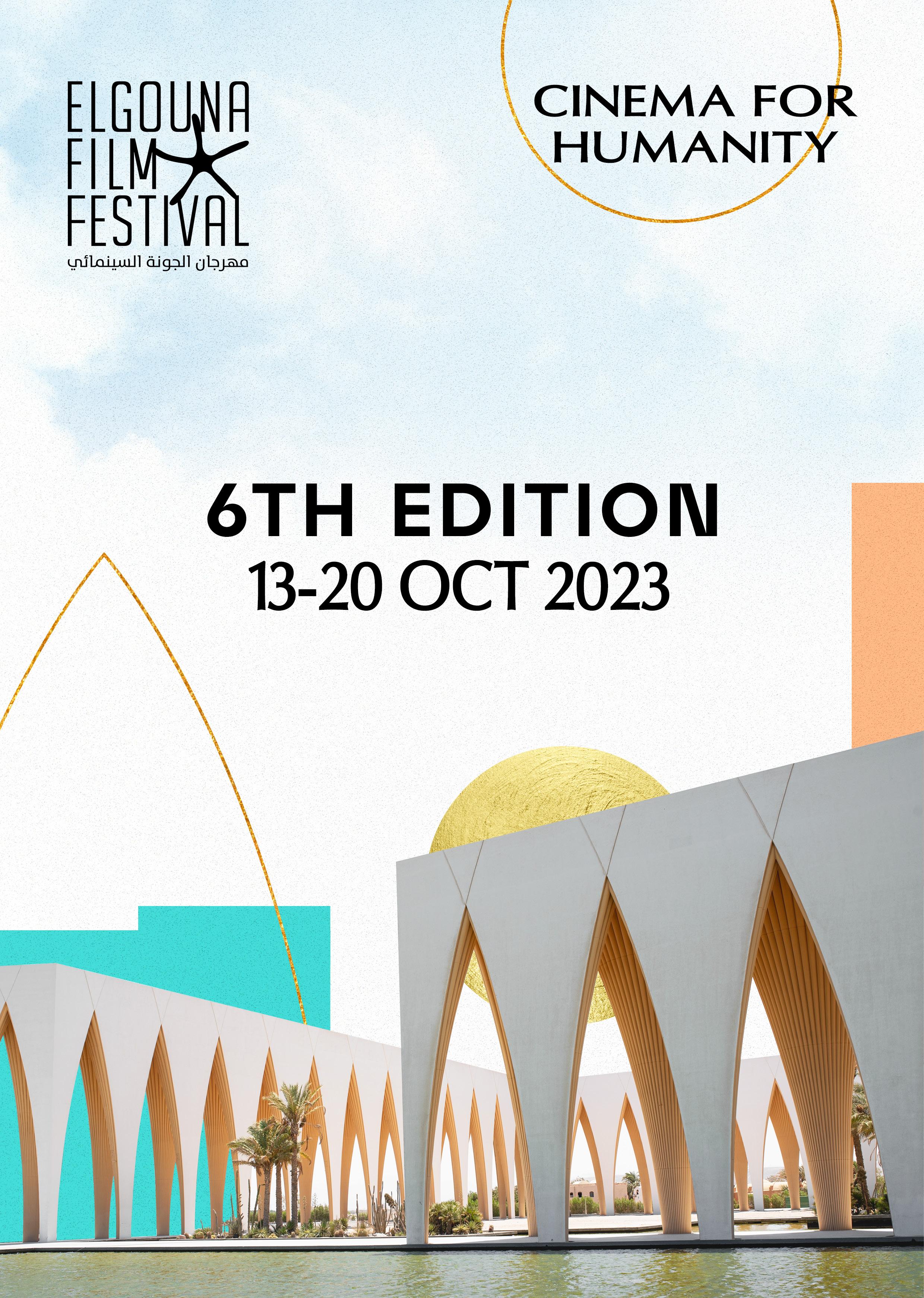
VERDICT: It’s not quite Cannes or Toronto when it comes to deal-making, but a steady stream of news on sales and pick-ups has surrounded the 80th Venice International Film Festival.
Liza Foreman September 8, 2023
VERDICT: In ‘Woman of’, the passive heroism of a Polish working class father of two who identifies as a woman is affectingly portrayed in the inimitable style of Malgorzata Szumowska and her co-director and D.P. Michal Englert (‘Never Gonna Snow Again’).

Deborah Young, September 8, 2023
At a time when Poland’s conservative government is tightening the screws on LGBTQ activists and transgender people who have to fight for their basic rights, leading directors Malgorzata Szumowska and Michal Englert (Never Gonna Snow Again) have come up with the remarkable story of a trans woman who spends the first half
of her life as a man, as society slowly open up, in Woman Of… (Kobieta Z…)

The timing of this Polish-Swedish co-prod could not be more perfect, with parliamentary elections coming up next month in Poland amid a divisive debate over the right to live one’s own sexual identity.

Full review, click here
Amid the somewhat muted Red Carpet activity affected by the ongoing strikes in Hollywood, sales companies have been ratcheting in deals on smaller as well as bigger titles. Most companies contacted by The Film Verdict were keeping Continues next page

We opened our Venice dailies with an anniversary salute to both the Biennale’s 80th Mostra del Cinema and The Film Verdict’s entry into its third year. I’d like to end with a few words of gratitude to all the many film festivals that have embraced and supported our vision of providing the film community with a real trade platform of practical use to film companies working in the international arena.
On behalf of the entire tireless team at TFV, I would like to thank the following film festivals: IFFR Rotterdam, Palm Springs, the Berlinale, Thessaloniki Doc, Cannes, Guadalajara, Munich, Karlovy Vary, Locarno, Sarajevo, Venice, Oldenburg, San Sebastian, El Gouna, Dok Leipzig, Thessaloniki, IDFA, and Cairo Film Festival. Sincere thanks to all the advertisers who understood the true value of promoting their films on a professional trade platform, and to the many film commissions who have worked with us. nod of thanks goes to the EFP - European Film Promotion, AFCI – Association of Film Commissioners International, and the Italian film association ANICA. Also, to German Films and Flanders.
A personal thank you to my friends Thaddeus Bouchard, CEO of Screen Dollars, Rudi Salo and Michael Lawhead from Nixon Peabody LLP, Roberto Stabile, Advisor for Intl. Rel. & In Charge for Special Projects DGCA MIC, and the many others around the globe who have supported TFV since its inception.

It is our belief that a trade publication is the communi ty’s public square, a place to inspire commerce among the international film community. A trade should never be bigger than its community, but it should be an essential part of its value. TFV brings the community together to facilitate business and events through its independent and professional reviews and editorial. And our expansion reflects the growth of the film community: our friends, readers, advertisers, and filmmakers around the world.
Eric Mika President & Publisher, The Film Verdict CEO, The Film Verdict Inc.Deals continued from page 1
mum on further news but apparently enjoying dealmaking in the sunshine.
“We have absolutely had a blast with Stolen and The Theory and are sure the same will go for Infested this Friday,” said Yohann Comte from sales shingle Charades.
Amongst key news:

Film Constellation closed numerous distribution agreements for Ryuichi Sakamoto | Opus which portrays the last performance of the late Oscar-winning composer Sakamoto (The Last Emperor and Merry Christmas, Mr Lawrence). The film has sold to Spain (Filmin), Germany and Austria (Rapid Eye), Scandinavia (NjutaFilms), South Korea (Media Castle), China (JL Vision Films), Hong Kong and Macau (Edko Films), Taiwan (Cai Chang) and Singapore (Anticipate Pictures). Bitters End is releasing the film in Japan in 2024. The film premiered out of competition. Neon picked up rights to Ava DuVernay’s Origin. The racial drama stars Aunjanue Ellis-Taylor and Jon Bernthal. The company plans a nationwide roll-out later this year.
Full article, click here
VERDICT: An unexpected story of loneliness and yearning from Stéphane Brizé in which two former lovers come face-to-face with the disappointments of life, beautiful in its understatement and cinematic restraint yet still generating tremendous poignancy.

Jay Weissberg, September 8, 2023
The “what ifs” of life are having their moment, as the popularity of Past Lives can testify. What if we didn’t miss that opportunity, that relationship, that possibility? Stéphane Brizé attributes his own rumination on the theme to pandemic lockdown, when isolation triggered a re-evaluation of the
choices we’ve made, resulting in his studiously low-key, achingly melancholy Out of Season. Comfortably slotting into the category of films shot in lonely off-peak seaside hotels, this calm, reflective drama about a famed movie actor in crisis and the unfulfilled woman he dumped sixteen years earlier has none of the socialist anger the director is best known for, burrowing instead into the feelings of loneliness and yearning when these former lovers meet again. Antoine Heberlé’s beautifully restrained camerawork places these two adults grappling with life’s disappointments on a cool yet charged canvas, hesitantly expressing their insecurity and longing through excellent dialogue by Brizé
Full review, click here
VERDICT: Olmo Schabel’s directorial debut succeeds as a delivery system for ’90s-indie vibes, but it fails to elicit empathy for its spoiled, obnoxious lead characters.
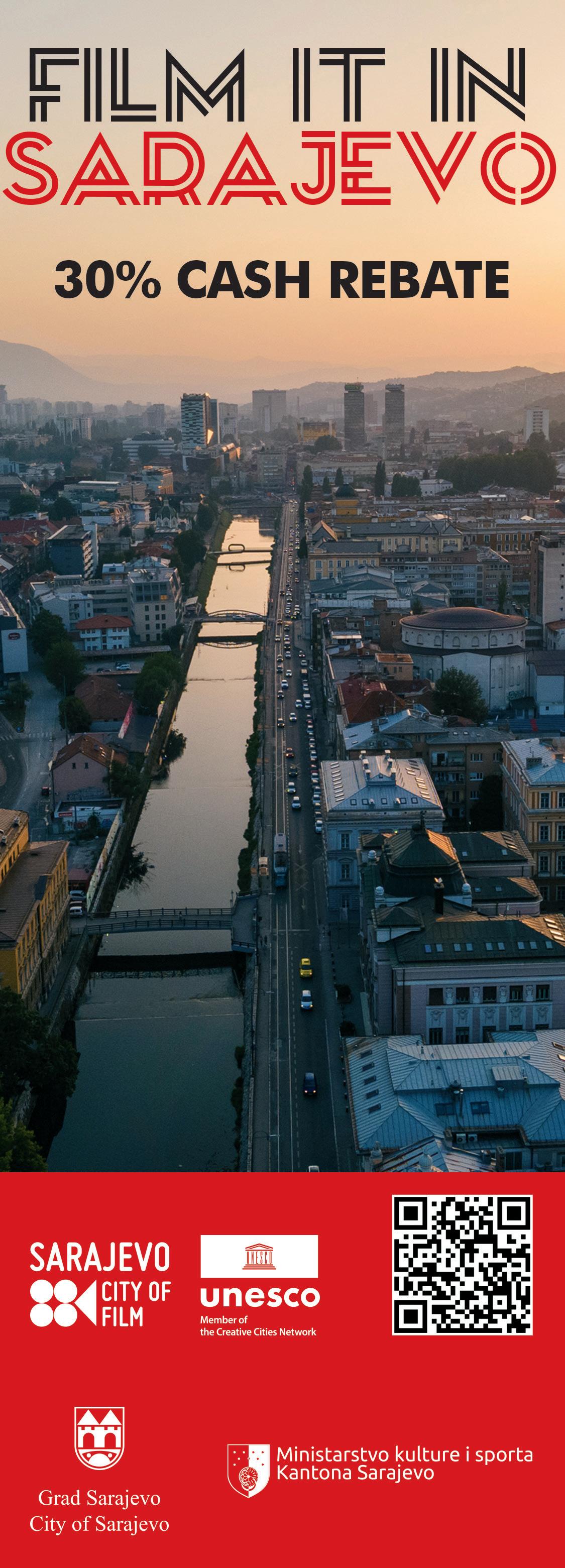

Alonso Duralde, September 3, 2023
Studio notes, more often than not, will ask filmmakers to make the characters more likable, to offer the audience someone to root for, even though some of the best films ever made center characters who are quite unlikable and even unredeemable. The tradeoff in creating such characters, however, is to provide some reason as to why their plight matters and how their bad decisions illuminate the human experience. Sometimes, unfortunately, anti-heroes are just obnoxious idiots, and enduring their stories becomes insufferable, as in Pet Shop Days, the directorial debut from Olmo Schnabel, son of artist and filmmaker Julian Schnabel. While the film succeeds at capturing the look and atmosphere of New York City–set indie cinema of the 1990s — including a cameo from arthouse stalwart Peter Greene as a desiccated-looking drug dealer — Schnabel fails to elicit empathy for, or even interest in, his lead characters.
Alejandro (Dario Yazbek Bernal) lives on a lavish estate in Mexico with his parents. He’s close to his mother, Karla (Maribel Verdú), but his father Castro (Jordi Mollà) is a rich jerk who doesn’t understand his son and is always getting into arguments with him. Jack (co-writer Jack Irv) lives in a huge Manhattan apartment with his parents. He’s close to his mother, Diana (Emmanuelle Seigner), but his father Francis
Full Review, click here
VERDICT: Creepy but derivative killer spider thriller is angrier at the world than at arachnids.
William Bibbiani September 8, 2023
Sébastien Vanicek’s Vermines — soon to be released in the United States as Infested — dwells at the intersection between two horror classics: Frank Marshall’s Arachnophobia and Joe Cornish’s Attack the Block.
It’s not as whimsical as Marshall’s cult favorite, and it’s not as exciting as Cornish’s, but it jams those pieces together into a film that eventually, slightly too late, finds its own voice. And that voice is hoarse with rage.

Kaleb (Théo Christine, Gran Turismo) lives in a rundown building with his sister, Lila (Lisa Nyarko, A Bookshop in Paris). They don’t talk to each other much since their
mother died. She’s constantly renovating the place because she wants to move, he’s trying to raise money to keep their home by selling Nike shoes out of a storage locker, and his only hobby is collecting scaly critters and poisonous bugs, in the hopes of one day owning his own reptile house.
We know early on that Kaleb’s newest acquisition is a deadly, invasive species of spider. Just like we know that all the kindly neigh-
bors with only one personality trait he knows will turn up dead later, mostly killed by [checks notes]… spiders. The motion activated hallway light only seems to exist because it, too, will be important later, just like the bag of fireworks Kaleb confiscates early on from his fellow, mischievous residents. It’s a lot of clunky setup for what is, at first, a predictable payoff.
But as Vermines charges along into
Full review, click here

VERDICT: Writer-director duo Austin Stark and Joseph Schuman blend historical pandemic echoes with timeless political tensions in this old-fashioned but engaging class-war drama.
Stephen Dalton, September 8, 2023
In America, declares one minor chorus character in Coup!, “you either have servants or you are one”. A slow-born domestic thriller with an undertow of caustic social commentary, this handsome period piece from New York writer-director duo Austin Stark and Joseph Schuman was party inspired by the glaring inequalities exposed by the recent Coronavirus pandemic, but the end result feels more timeless-
ly traditional than current, invoking vintage class-war dramas like The Servant (1963) more than recent eat-the-rich polemics like Parasite (2019).
Peter Saarsgard as a devilishly charming proto-hippie revolutionary with murky, possibly murderous intentions. Following its world premiere on the Lido as the closing film in the Venice Days section, this old-school crowd pleaser should
Coup! is an engaging battle of wits powered by strong performances across the board, notably from Full review, click here


The Venice Production Bridge is the multi-faceted market arm of the Venice Film Festival, attended by festival business players. VBP focuses on producers and production than sales.
When the Venice Production Bridge’s head honcho Pascal Diot started the Venice film market some 12 years ago, he had a specific idea in mind: Help producers with every step of the process of putting together a film, including completing financing.
“At the time, there were 150 co-production markets and all focused-on development money. But it’s just as difficult to raise the last financing on a film production,” he said.
To that end, this year, the five-day market (August 31-September 5, 2023) celebrated the tenth year of the Venice Gap-Financing Market.
A large number of projects that take part in the market reach their goals soon after, Diot said.
“As a producer, I knew the last 30 percent (of financing) is as difficult to find as the first. We have helped 370 films from 70 different countries, and 80 percent have been completed within six months of the market,” he said. “We are now proud of having famous directors come with their projects like Wim Wenders or Jim Sheridan.”
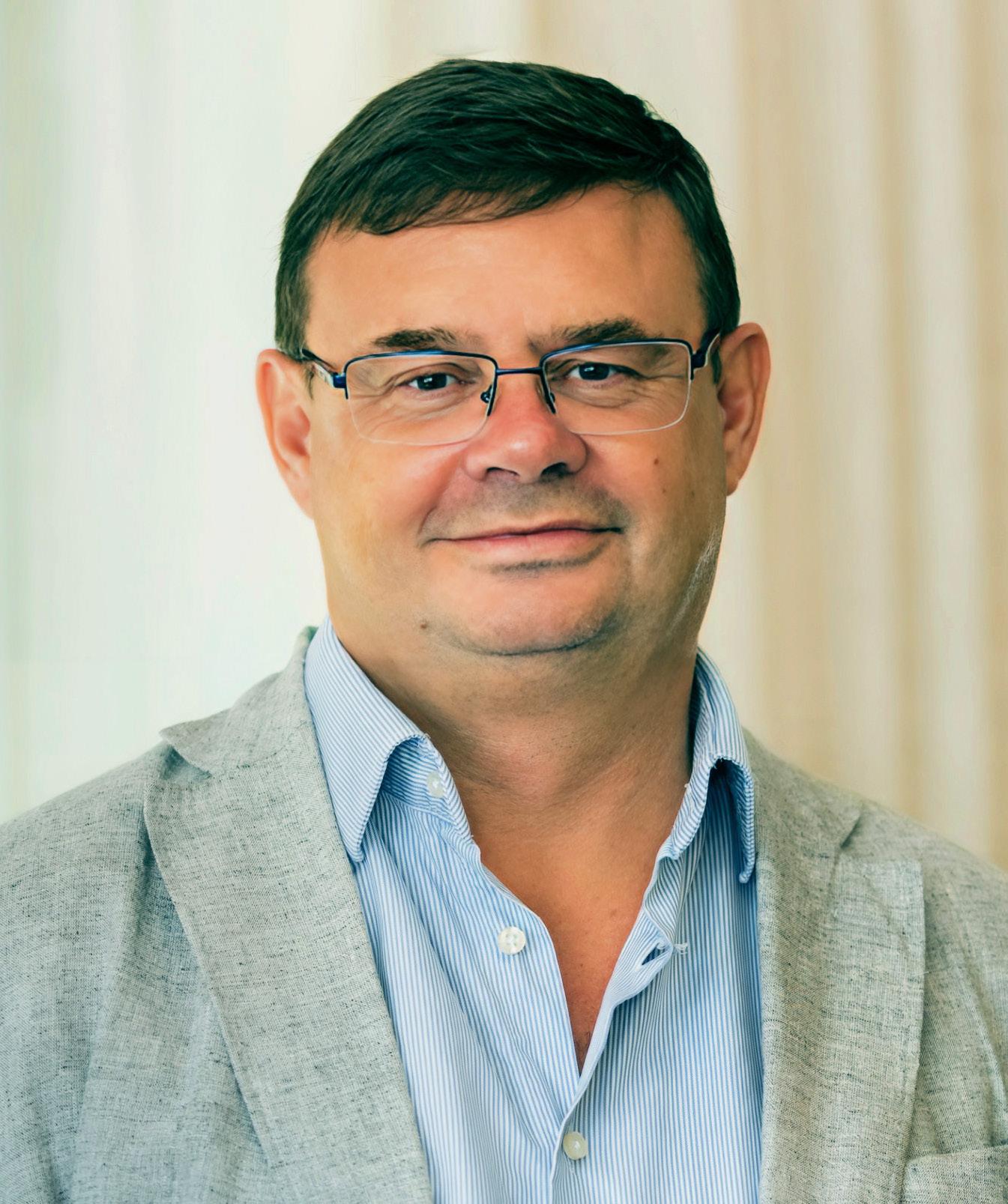
Steve McQueen’s documentary Occupied City, Wim Wenders’ The Secrets of Places, and Alain Parroni’s An Endless Sunday, are among the films that have completed financing on the Lido. “We have to adapt
to each film we are selecting being at a different stage. It’s tailor made,” Diot added.
Meanwhile, VPB’s Book Adaptation Rights Market is so popular that six extra publishing houses were added this year, bringing the total to 40.
“For the book publishers, they all told us that it is becoming the second most important RDV after the Frankfurt Book Fair, Diot said, adding “The principle is for everyone to come with their total catalog. Then stay in touch throughout the year.”
This year, more than 560 one-to-one meetings (compared to 450 in 2022) were organized with producers for the adaptation from the page to screen of literary rights.Other sections at the market include Meet the Streamers. This year, nine European and international streaming platforms participated in the market, taking 96 one-to-one meetings. Overall, as per Diot, the feedback from this year’s record number of attendees is that many say they prefer to stay for the duration of Venice, and not pack in Toronto as well, so the market could grow further.
“The highlight for me is that we have more than come back to a new situation because last year we already broke a record with about 2,500 attendees, and now it’s about 2,900 attendees. We’ve had almost 60 screenings. 50 panels. And a lot of people on Immersive Island, which is sold out,” he added.
As for selling films. “It’s not automatically a buy and Full review, click here
VERDICT: The miniature beings that starred in an 80s television show slowly unravel in this surreal animation that riffs on an enchanting children’s story trope.
Ben Nicholson, September 8, 2023
In Nina Gantz’s strangely haunting animated short, there was once a children’s television show called Wander to Wonder.
It was a familiar setup; a plink-plonking theme tune, a friendly old man speaking directly to the camera, and a trio of small furry creatures having semi-educational adventures. In this case, those creatures were played by tiny people (like The Borrowers) in costumes who are bereft after the
series’ creator and presenter (Neil Savage) has died. Not only that, but his body is lying rigid on the studio floor. This unexpectedly affecting tale sees the trio of diminutive performers – Mary (Amanda Lawrence), Billybud (Terence Dunn) and Fumbleton (Toby Jones) – attempting to keep their programme going.
All portrayed in beautifully intricate stop-motion puppet animation, the film oscillates between the contents of a grainy VHS and the happenings of the real world. In the former sections, the audience sees an old recording of an episode of the show, interspersed

Full review, click here
clippings. Taking pieces from cinema’s earliest years, Norelli crafts a narrative adjacent to the predictions of early 20th-century Futurists, particularly Italian poet Filippo Tommaso Marinetti, about the extension of man by machines. In this instance, such ideas take on a deliciously emancipatory feminist edge as a woman discovers the sexual possibilities of the concept.
VERDICT: Silent film footage is repurposed in a deliciously comic reimagining of Marinetti’s man-machine hybrid as a novel – intimate – cure for female hysteria.

Ben Nicholson, September 8, 2023
Revered footage from cinema’s illustrious history is given a sly reworking in We Should All Be Futurists.
Angela Norelli’s found footage film, which screens as part of the Settimana Internazionale della Critica at Venice, is a work of montage that creates a fictional story from a selection of monochrome film
The plot of We Should All Be Futurists is presented as epistolary, opening with the receipt of a letter by Giorgina from her friend, Rosa. It recounts Rosa’s husband, Umberto, accusing her of being hysterical and consulting a physician to see if she could be cured. Little did Umberto know that what the doctor ordered was a regular dose of sexual gratification – all while he continued paying a handsome price for the treatment. When Giorgina’s Full review, click here
WE SHOULD ALL BE FUTURISTS
VERDICT SHORTVenice Film Festival
